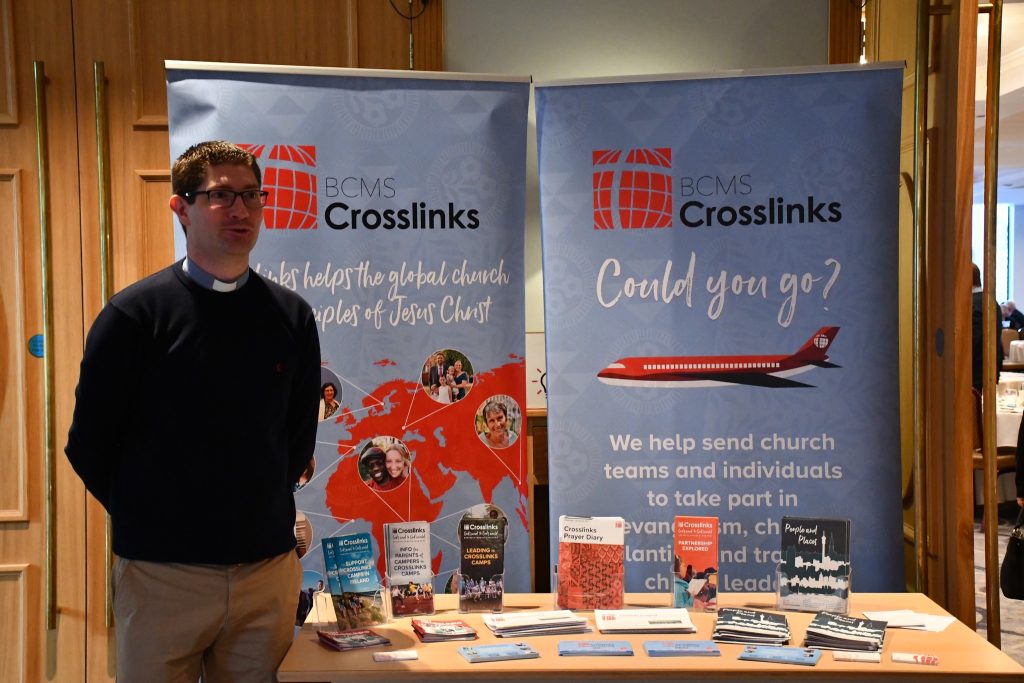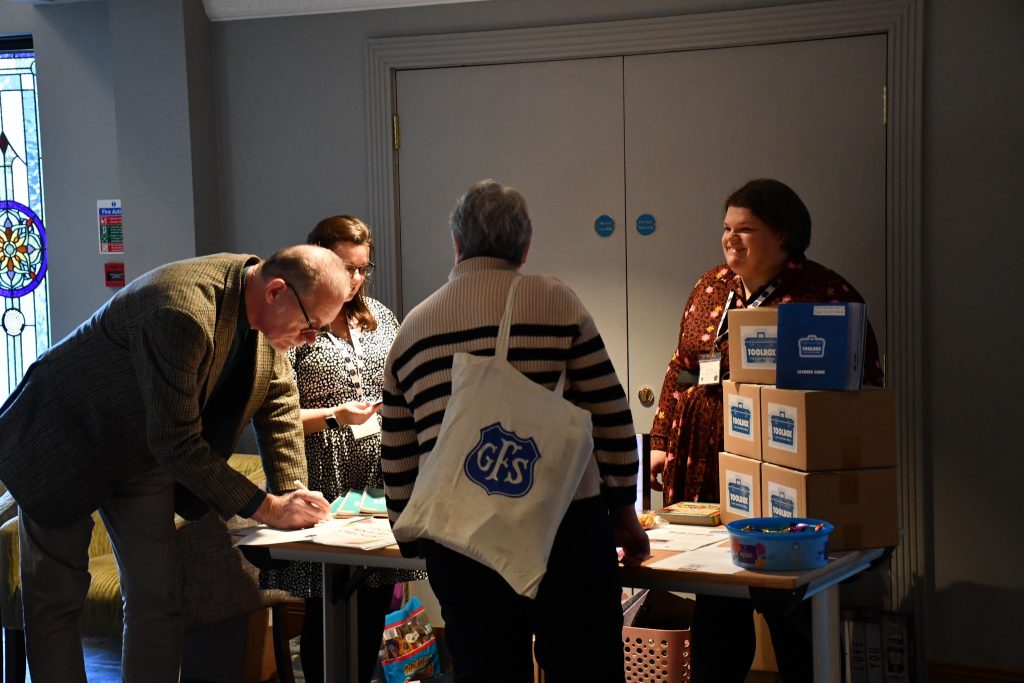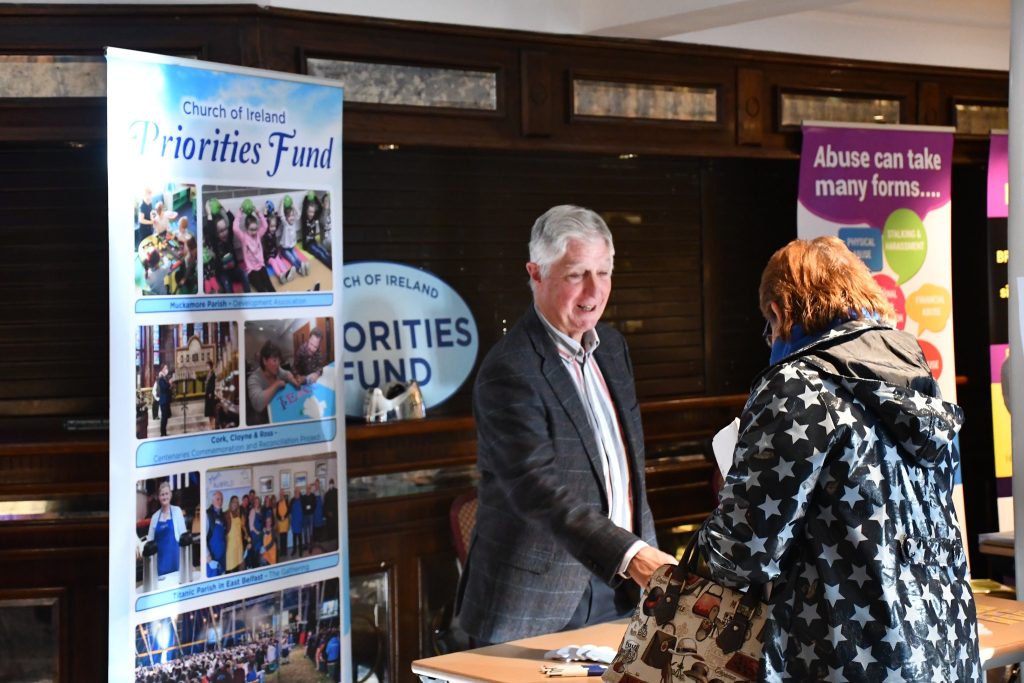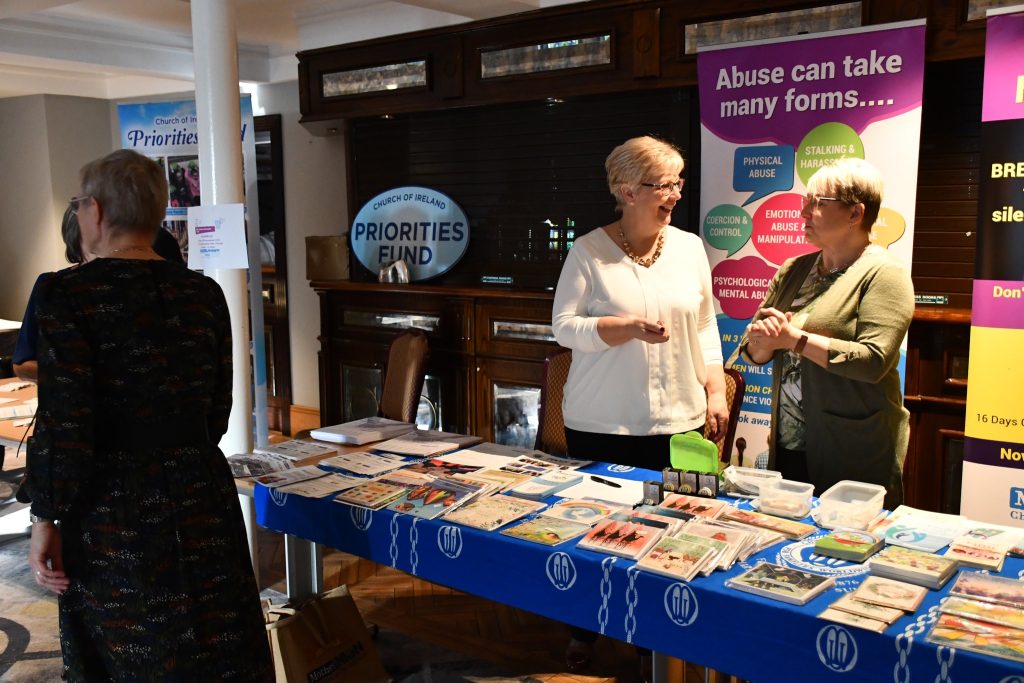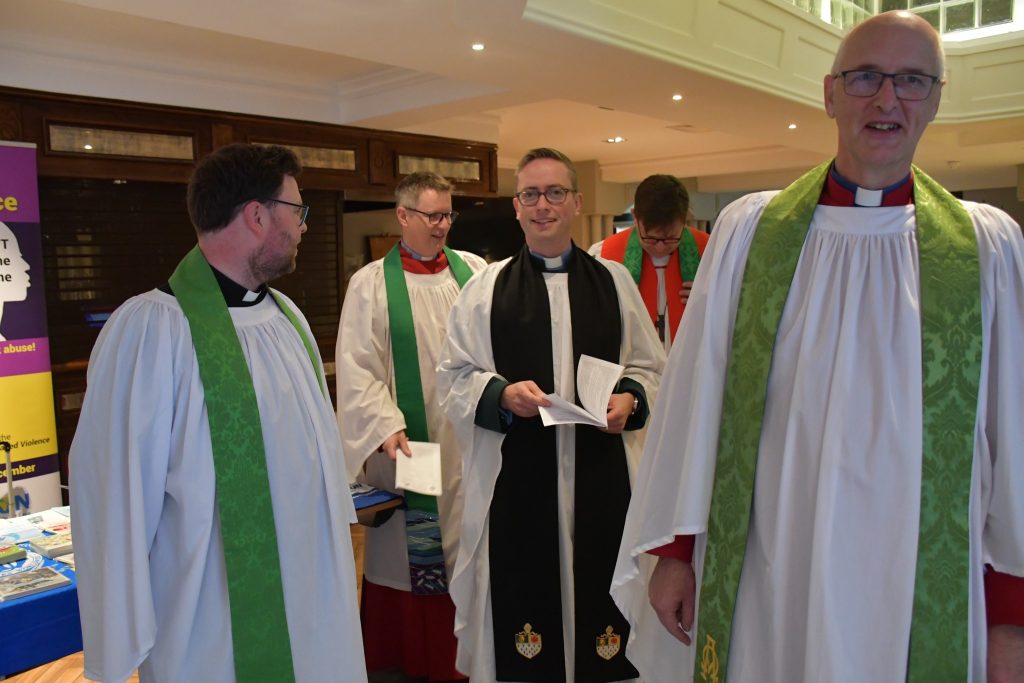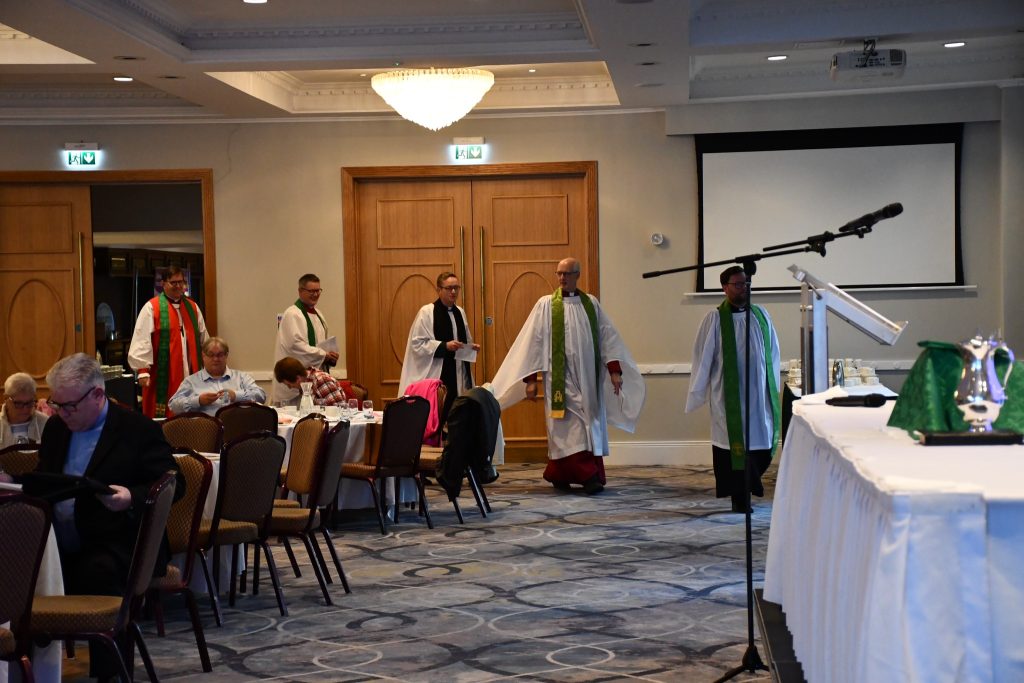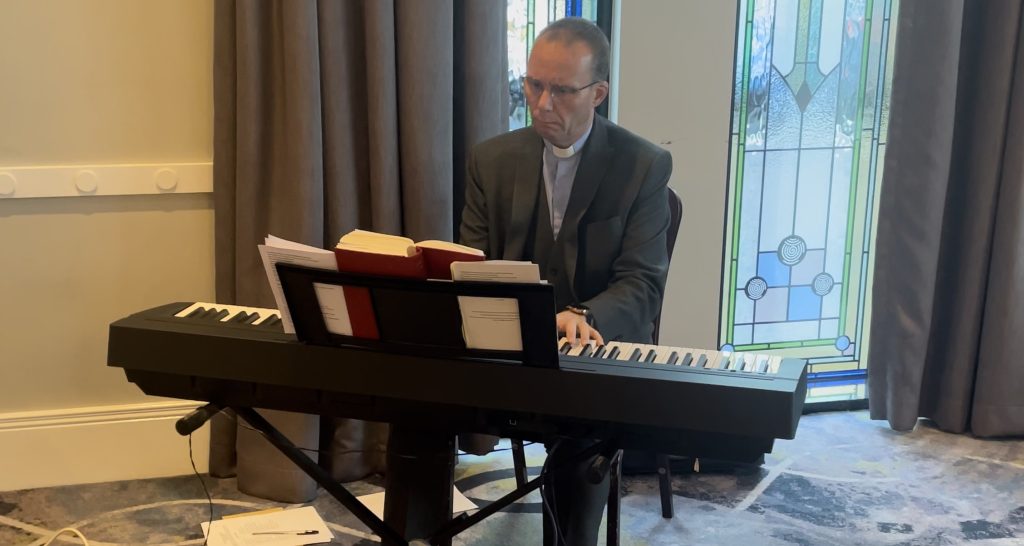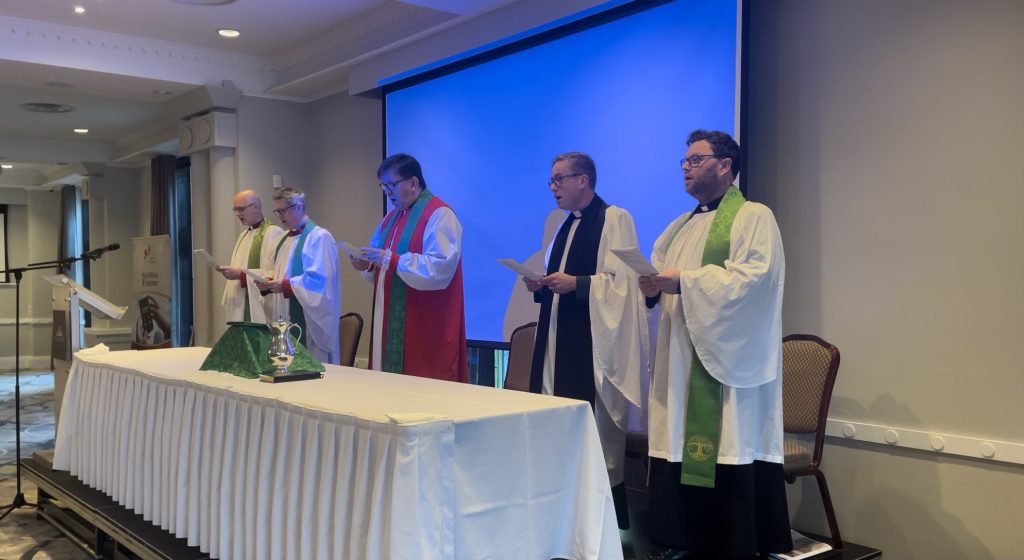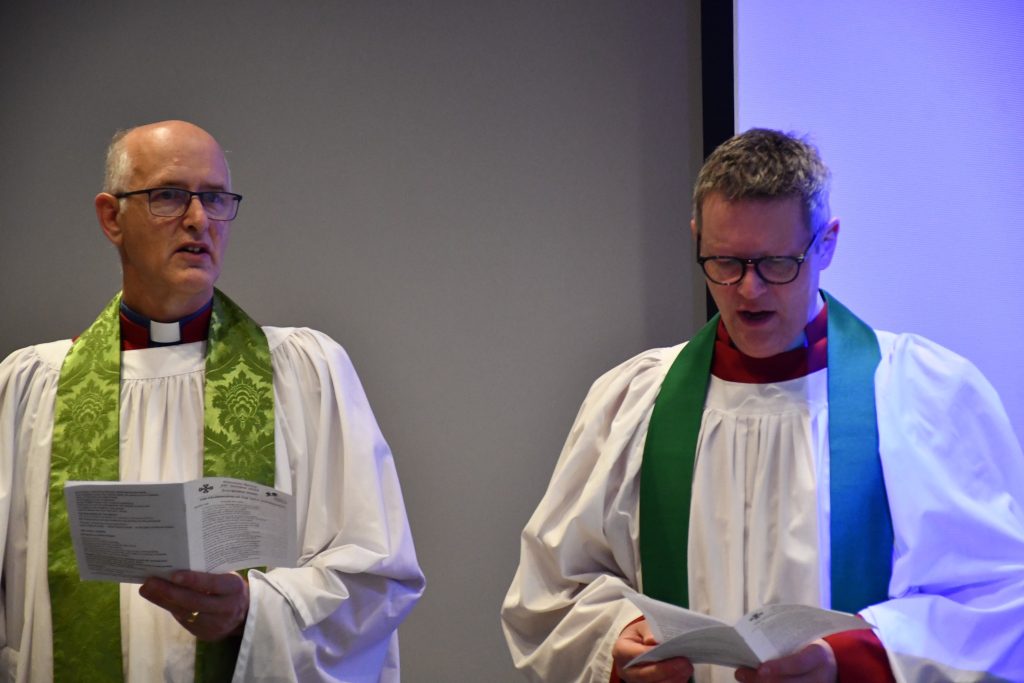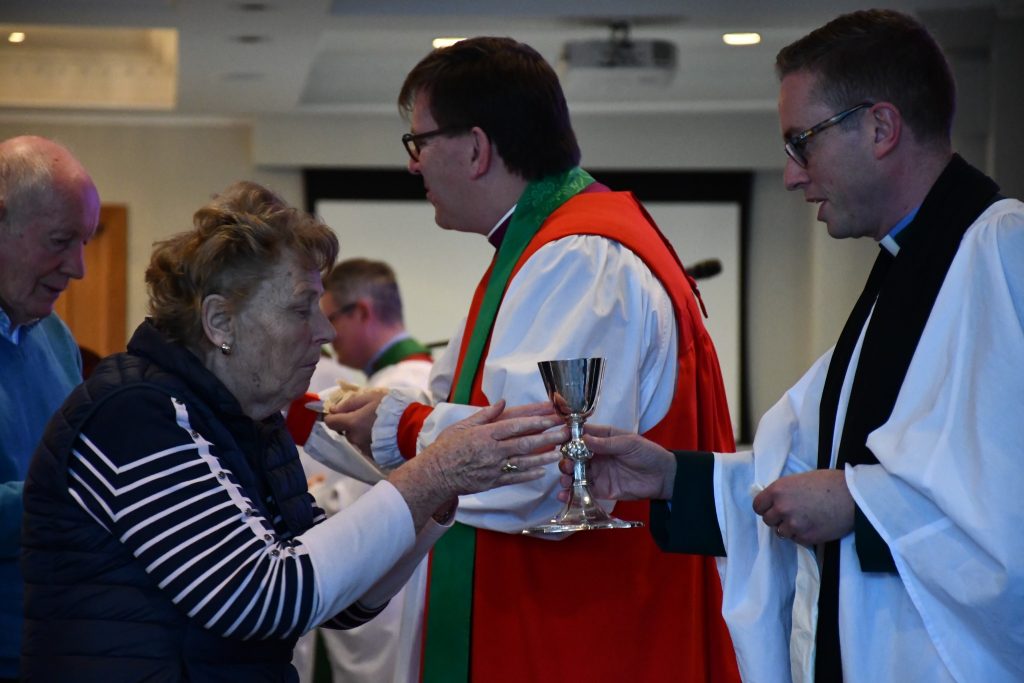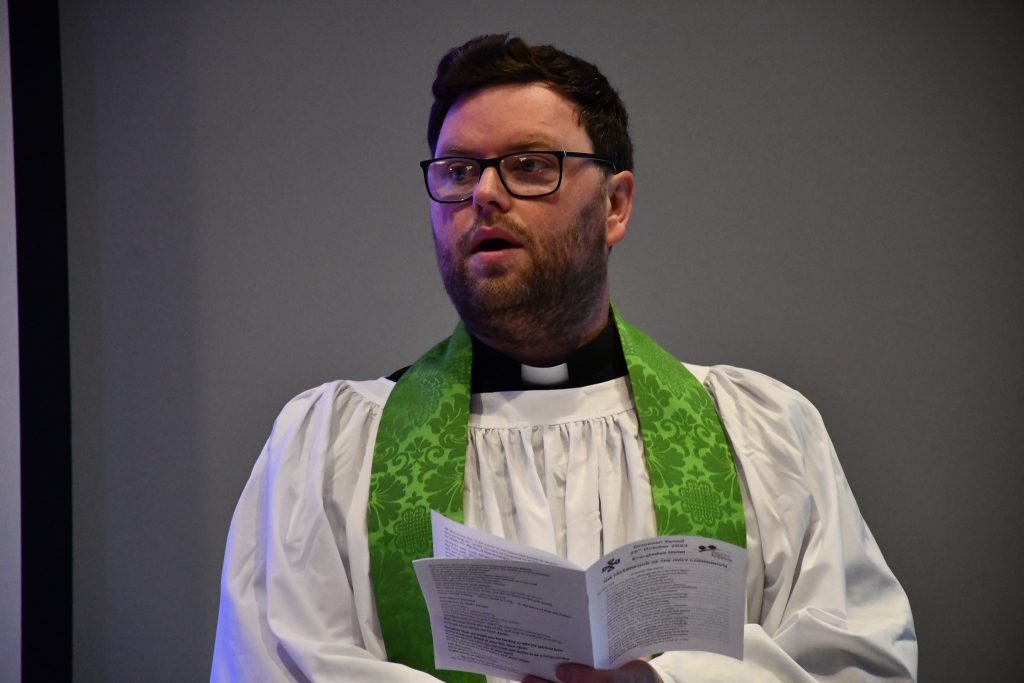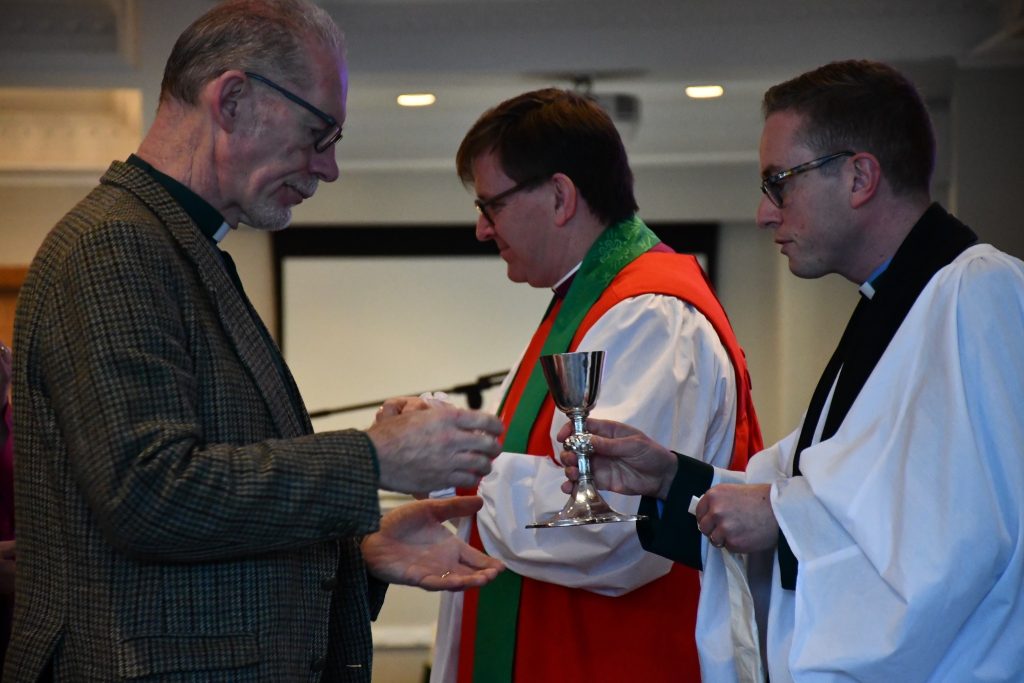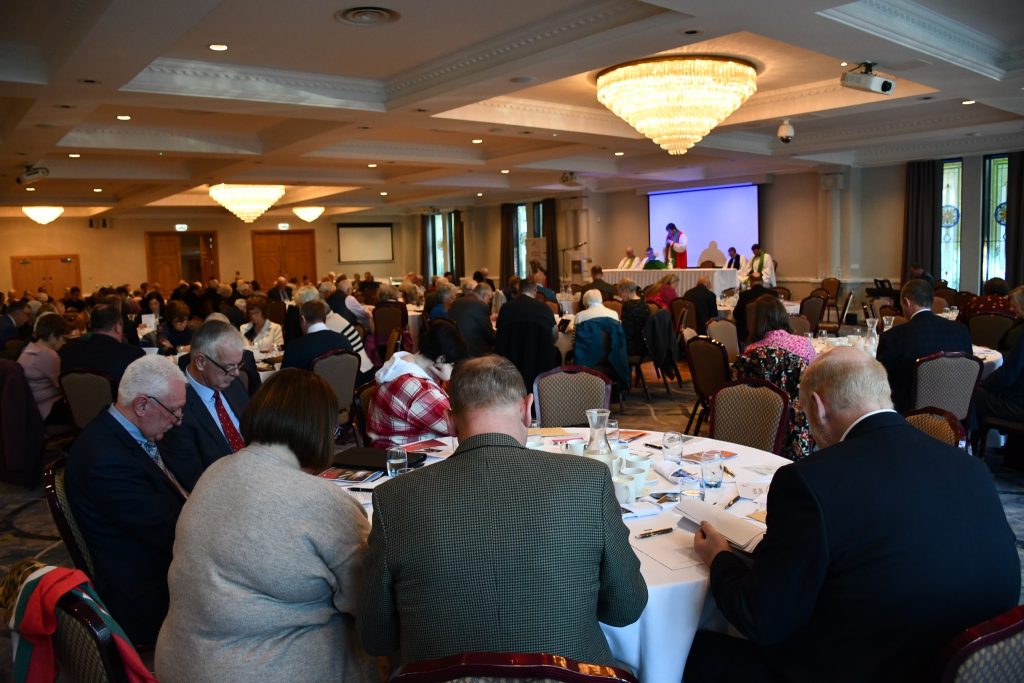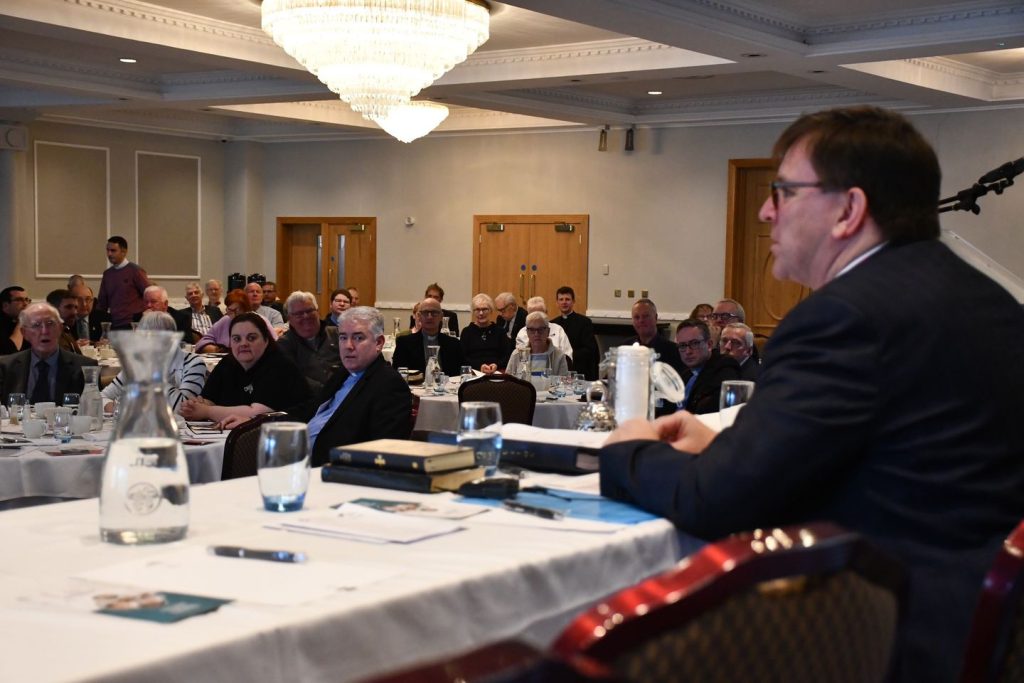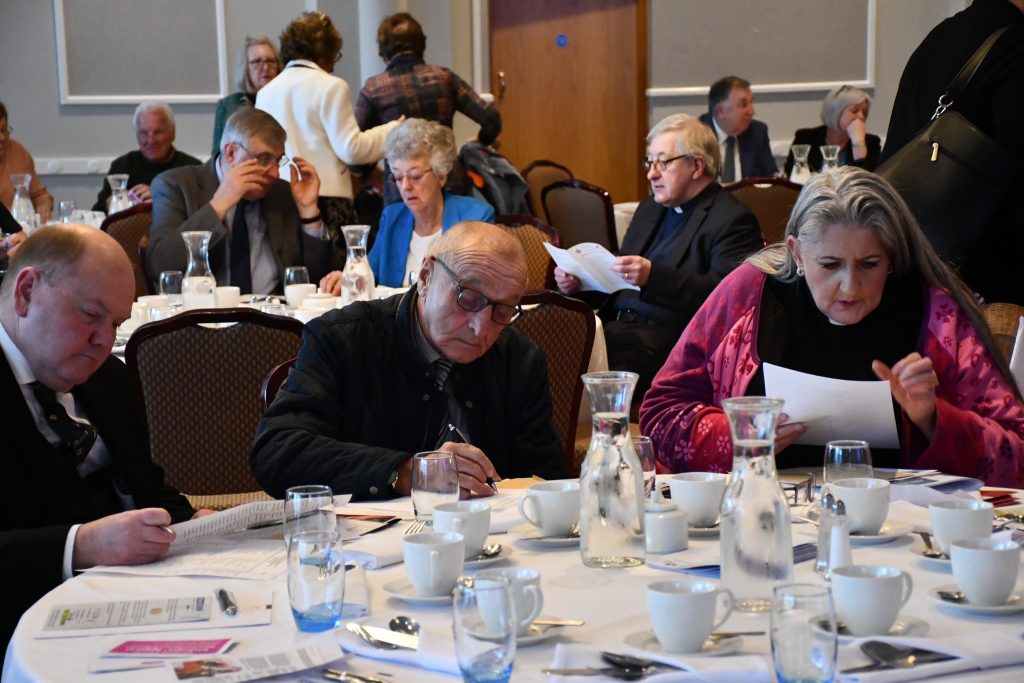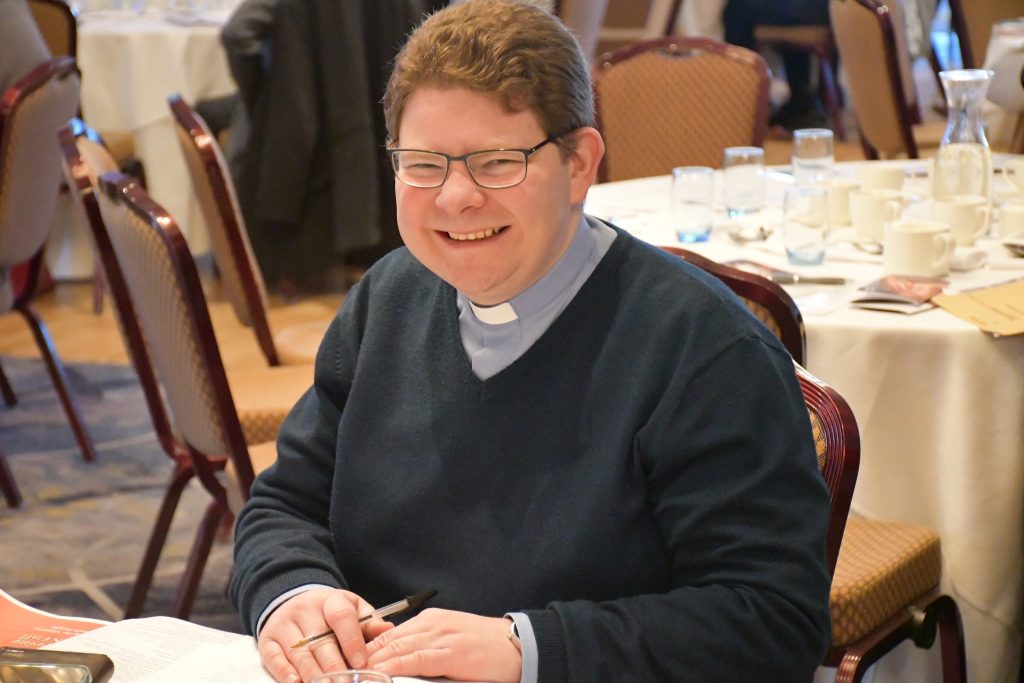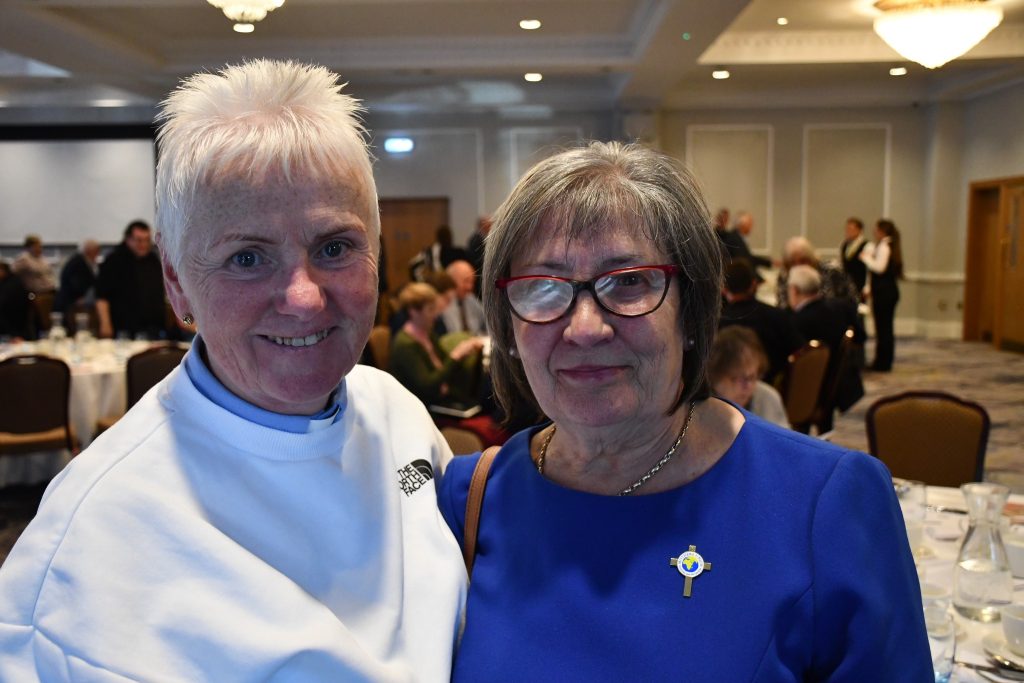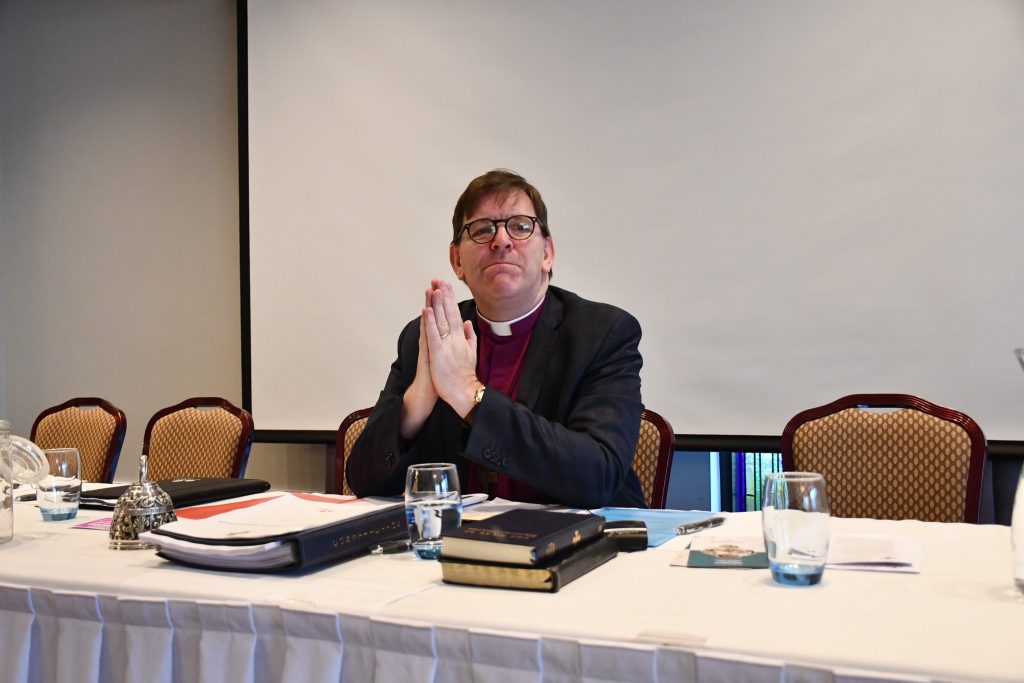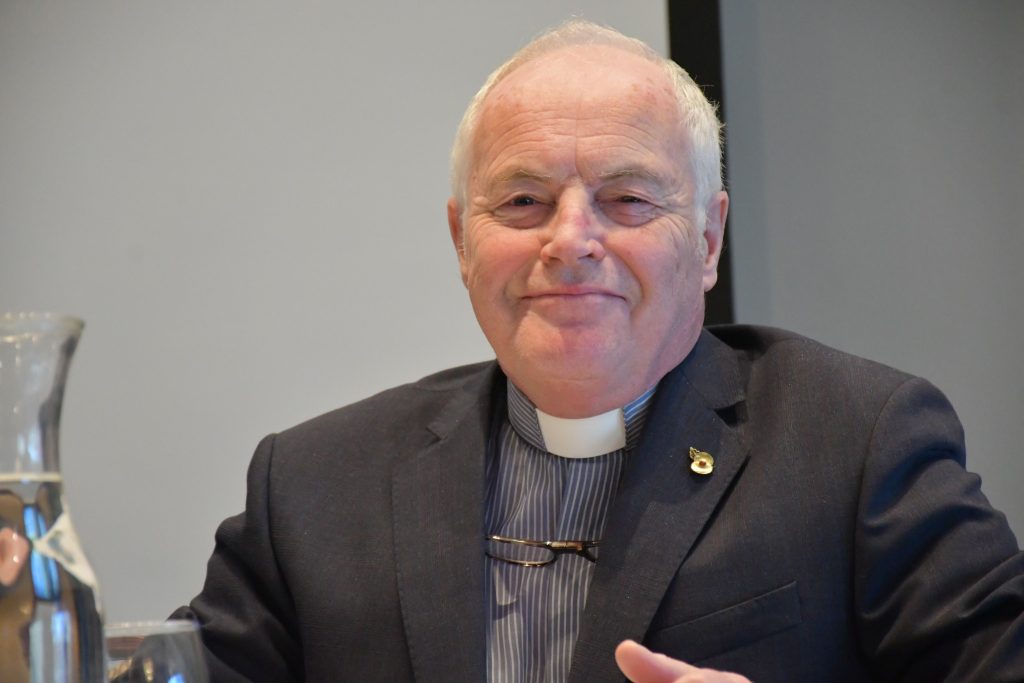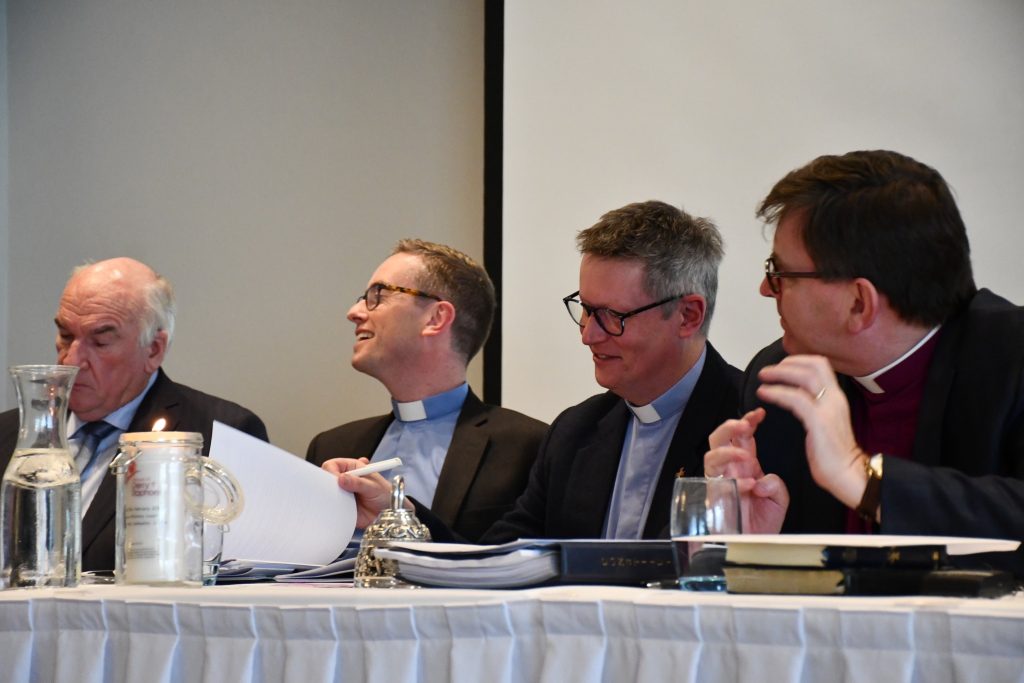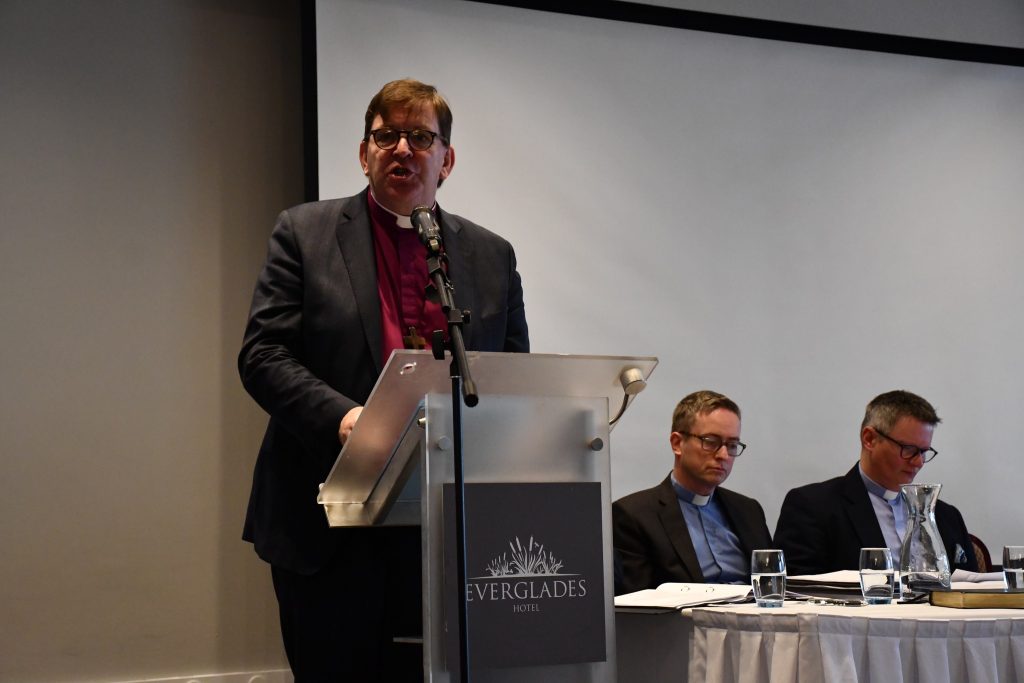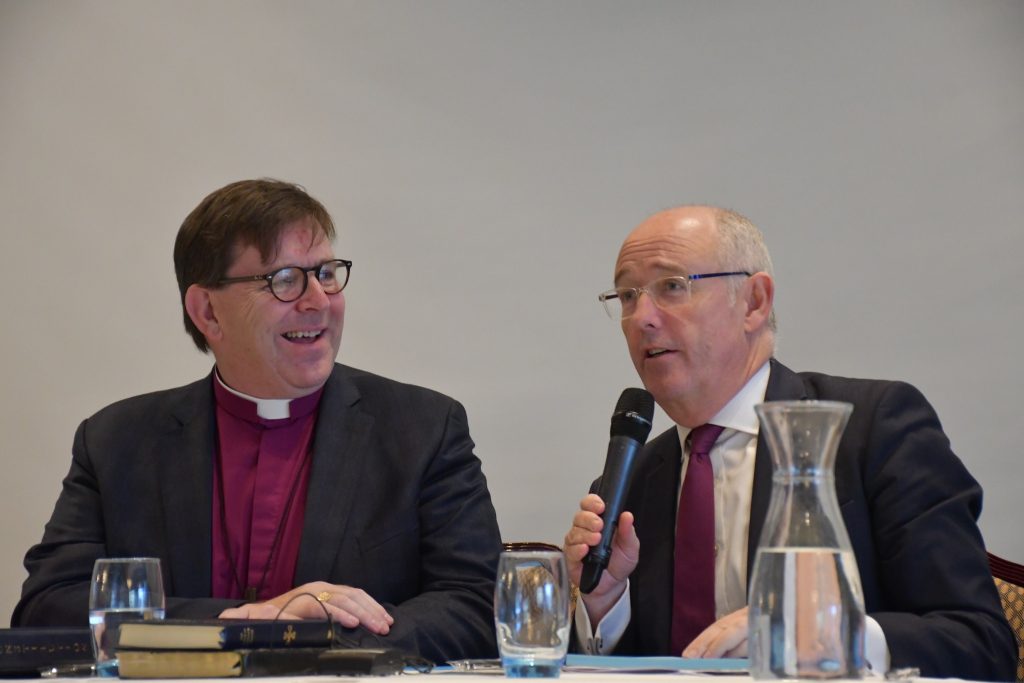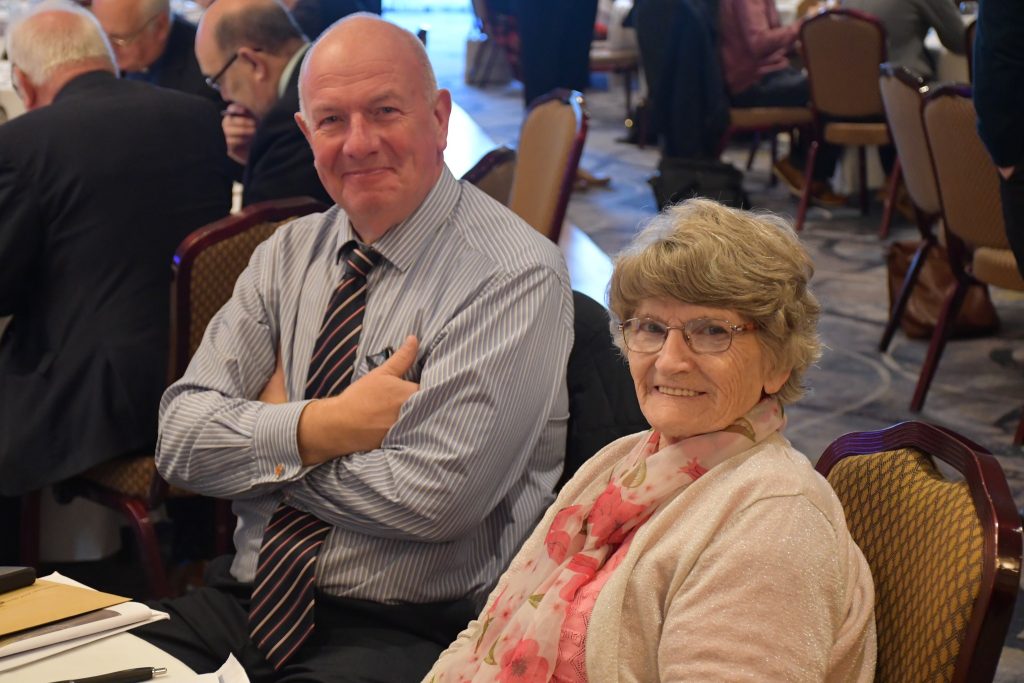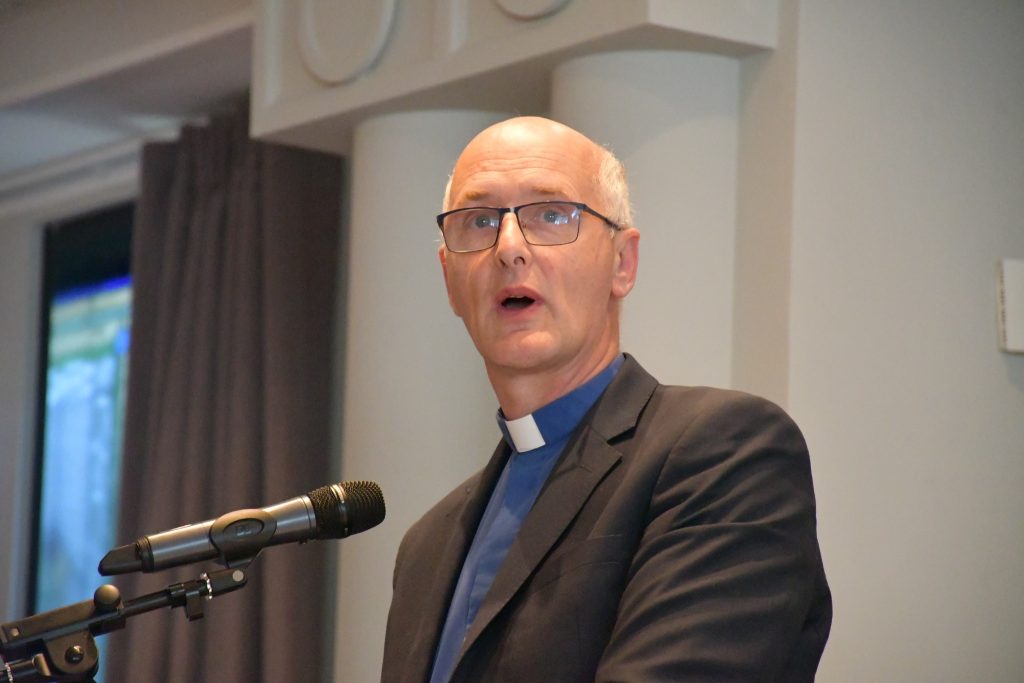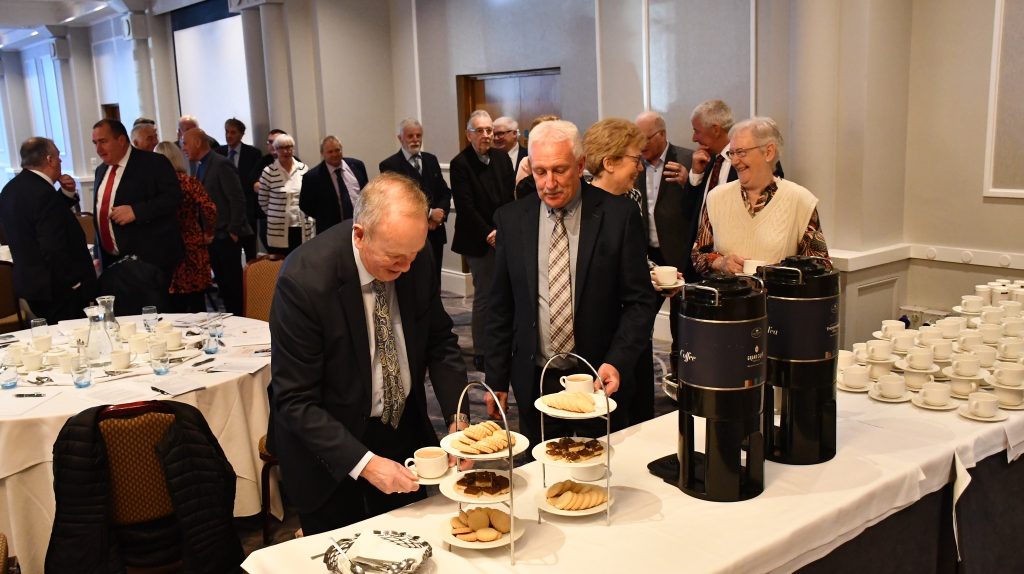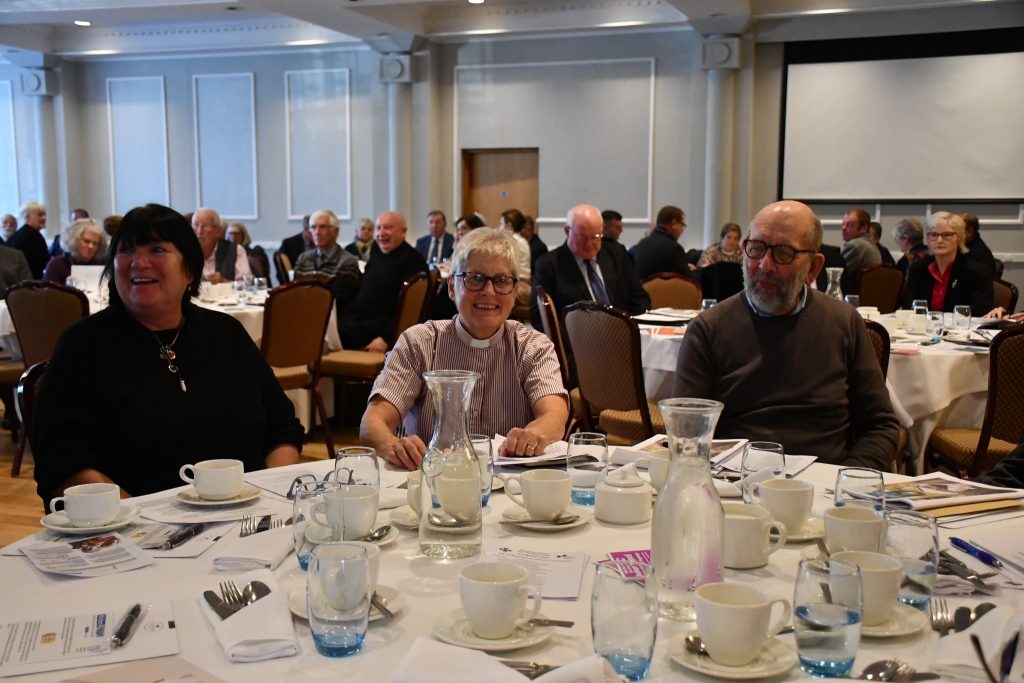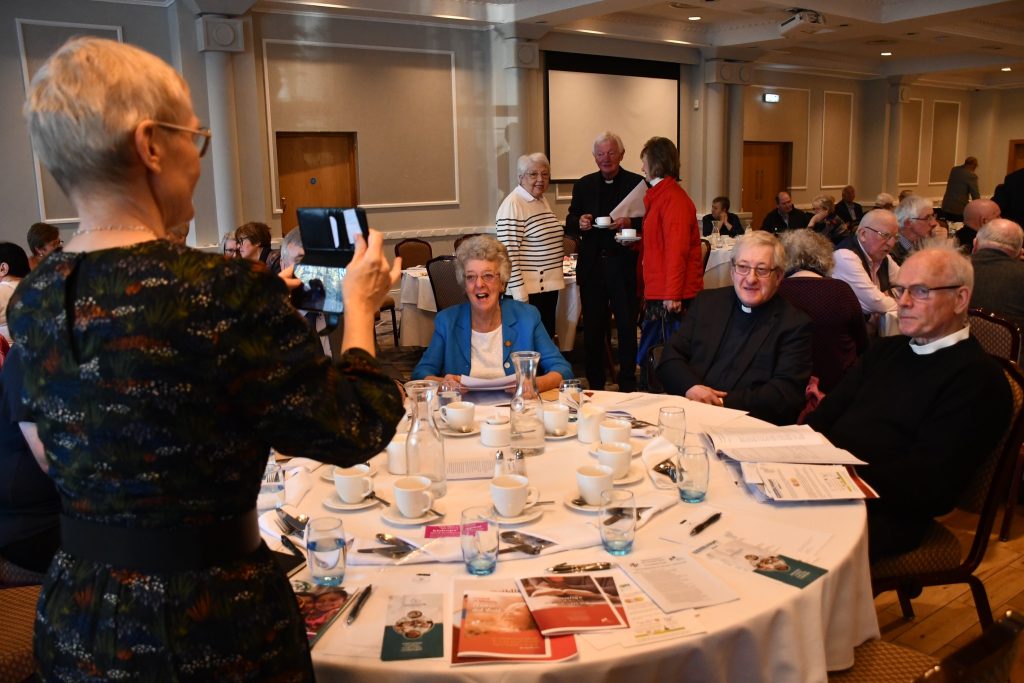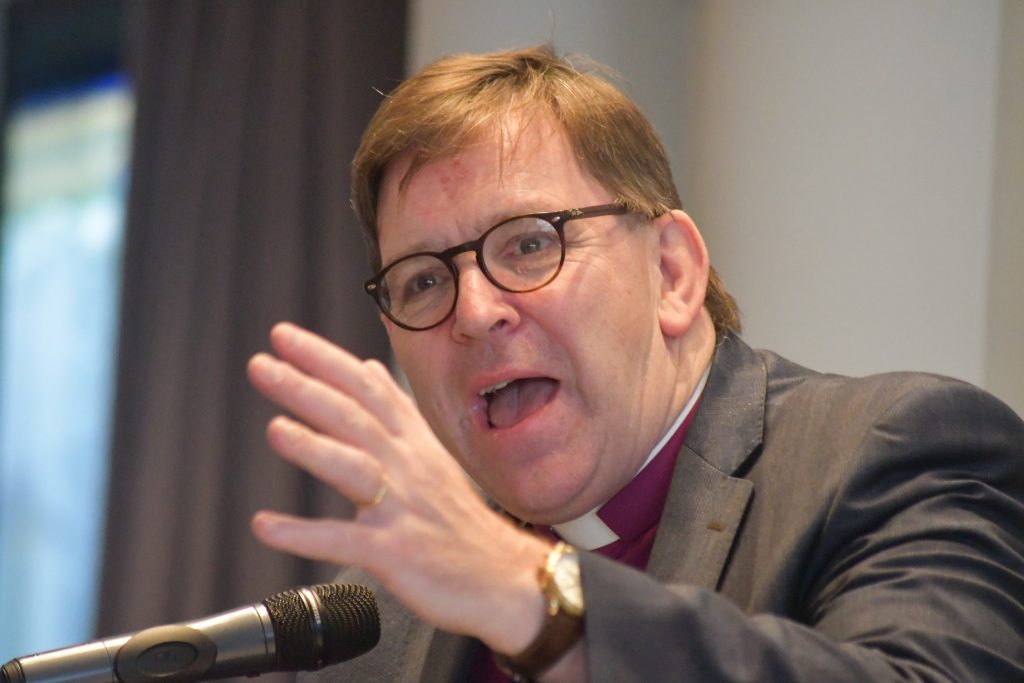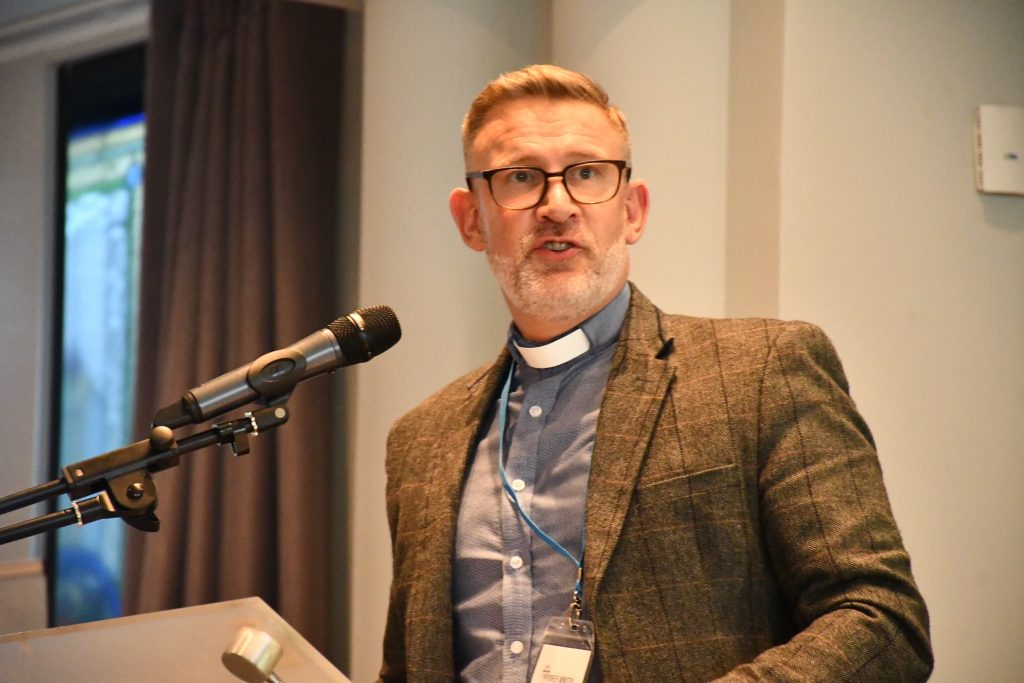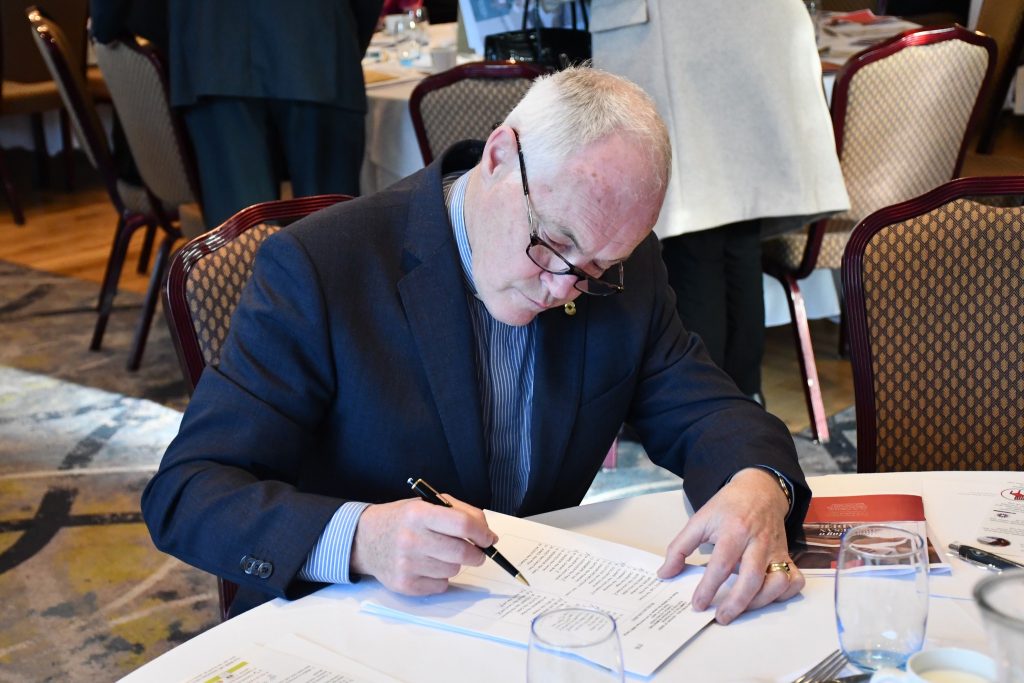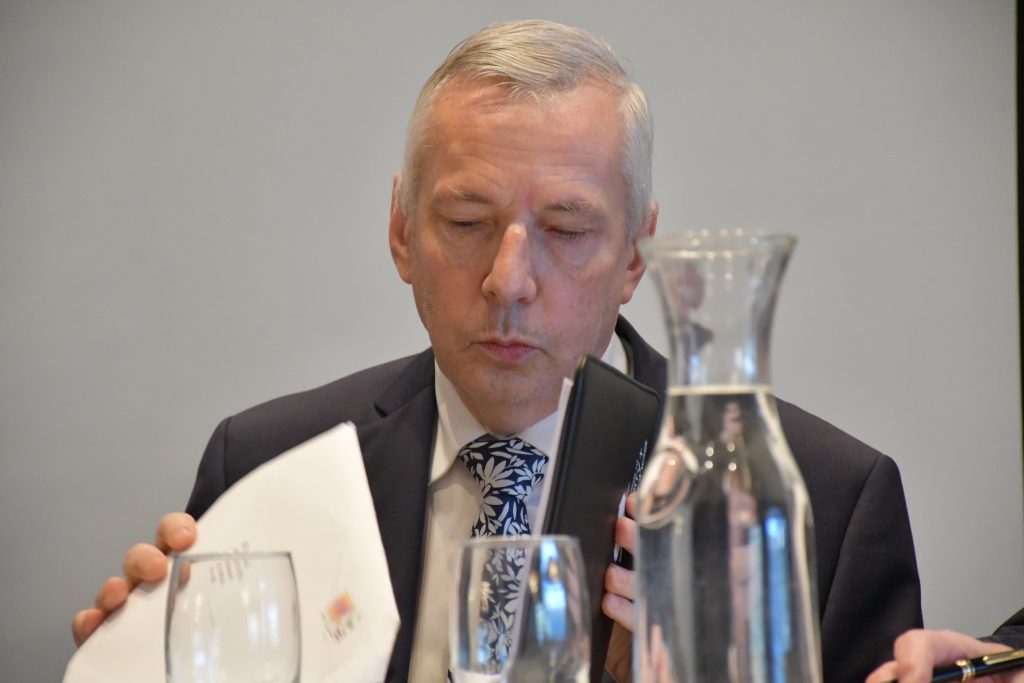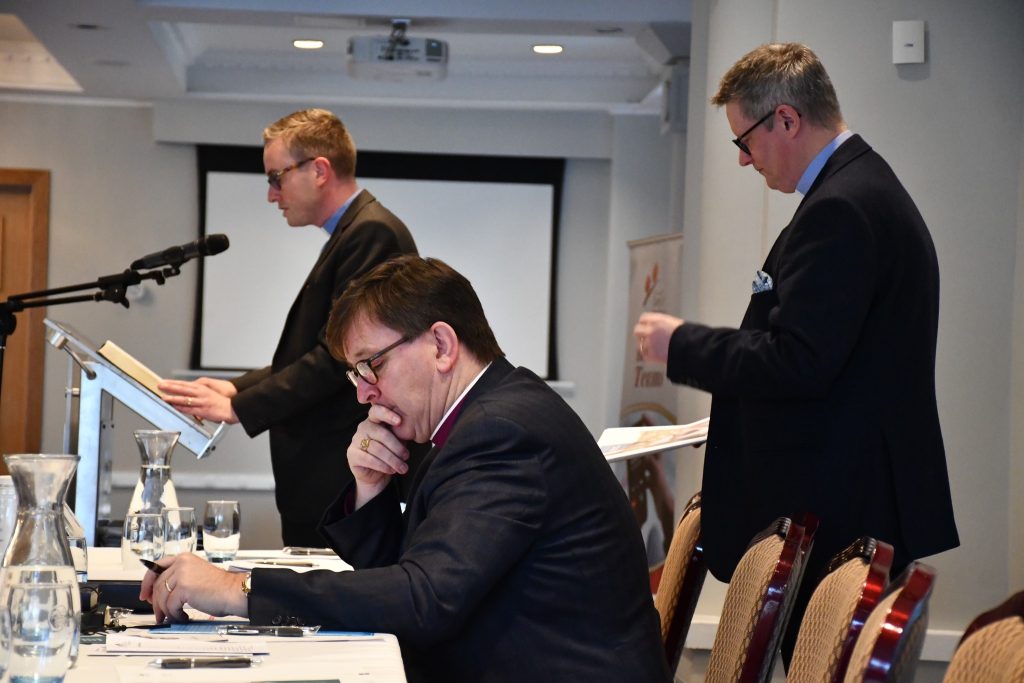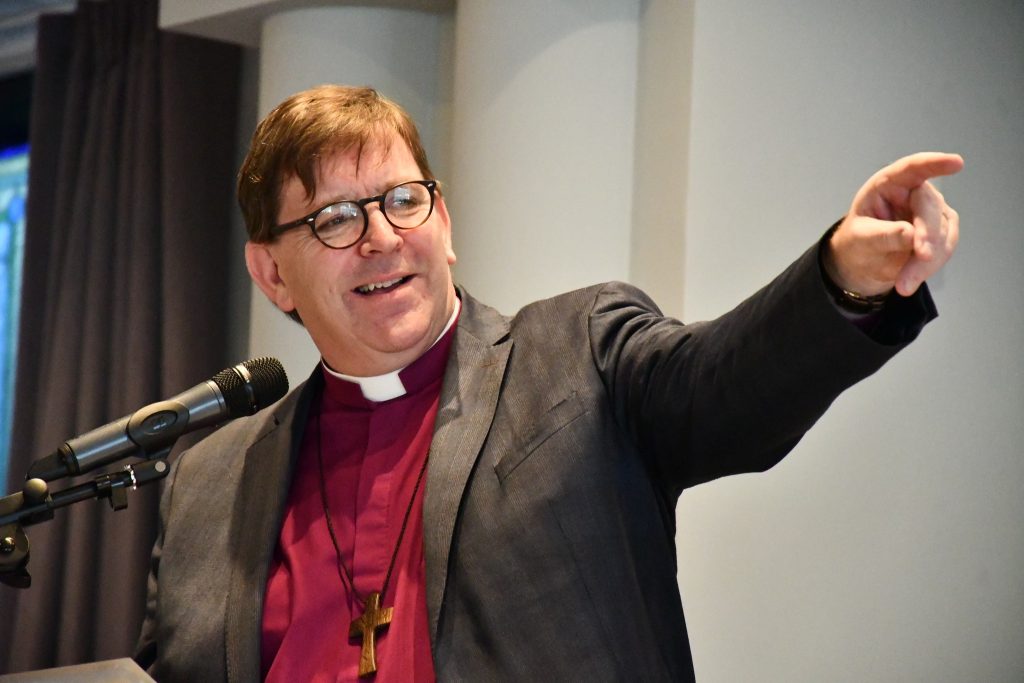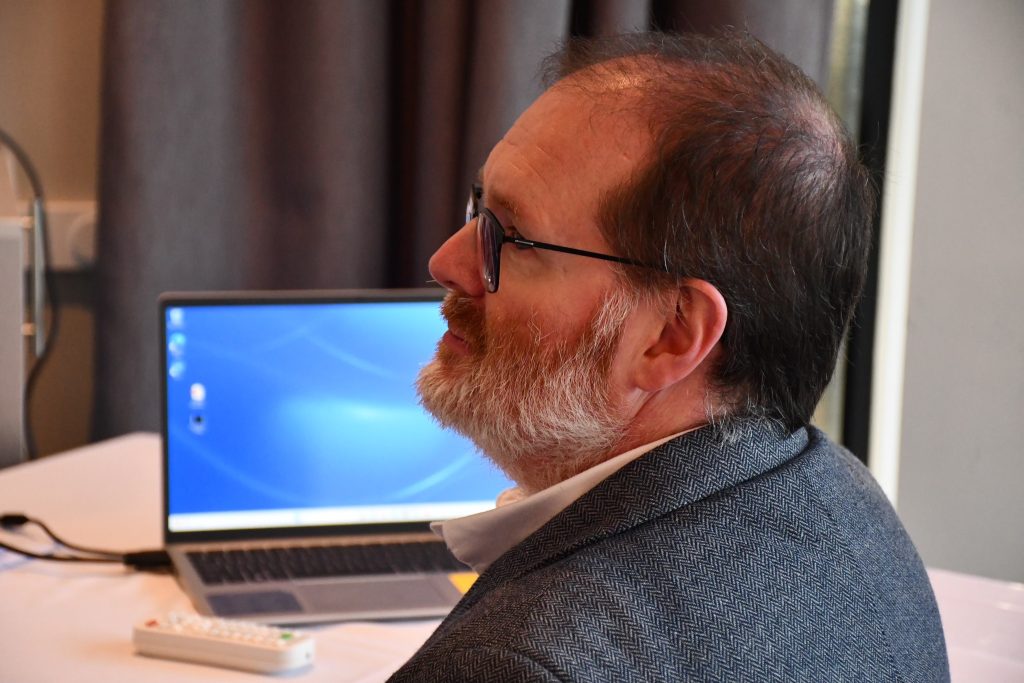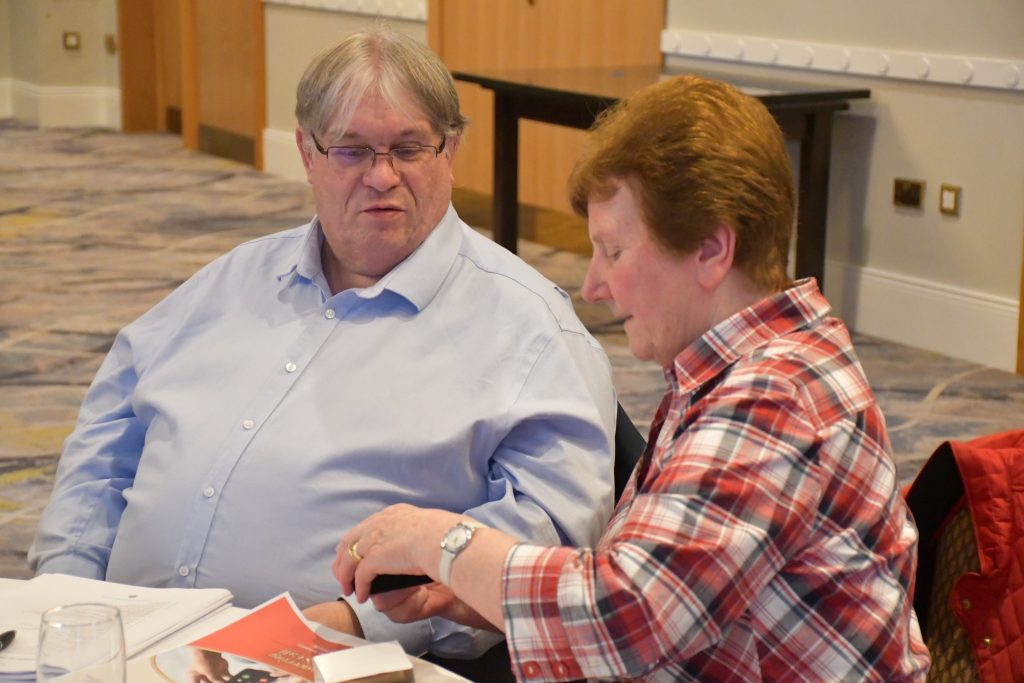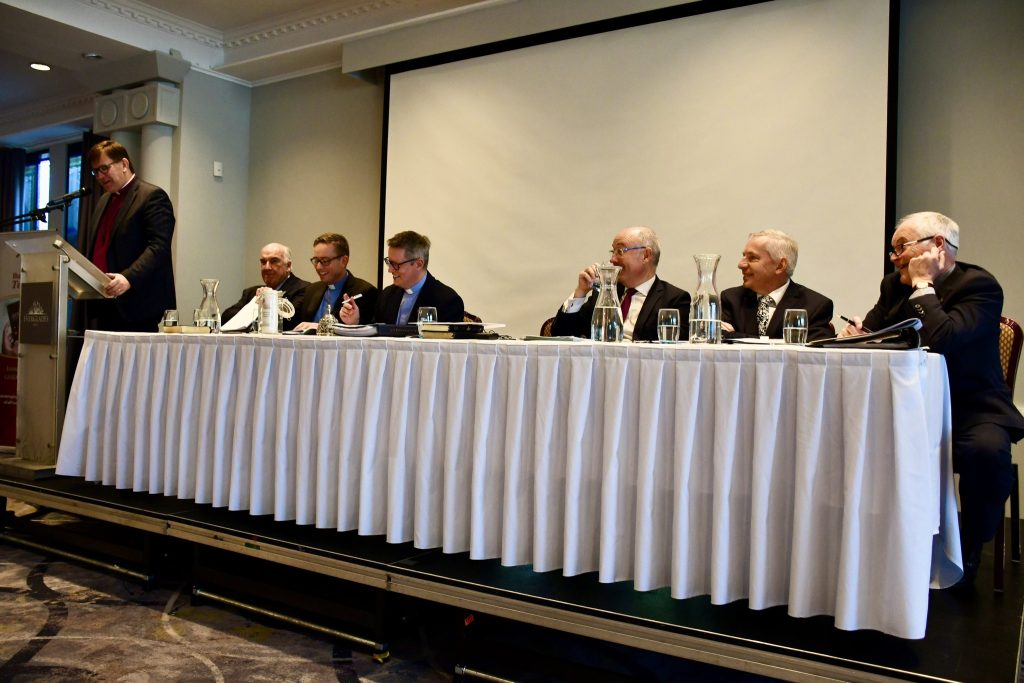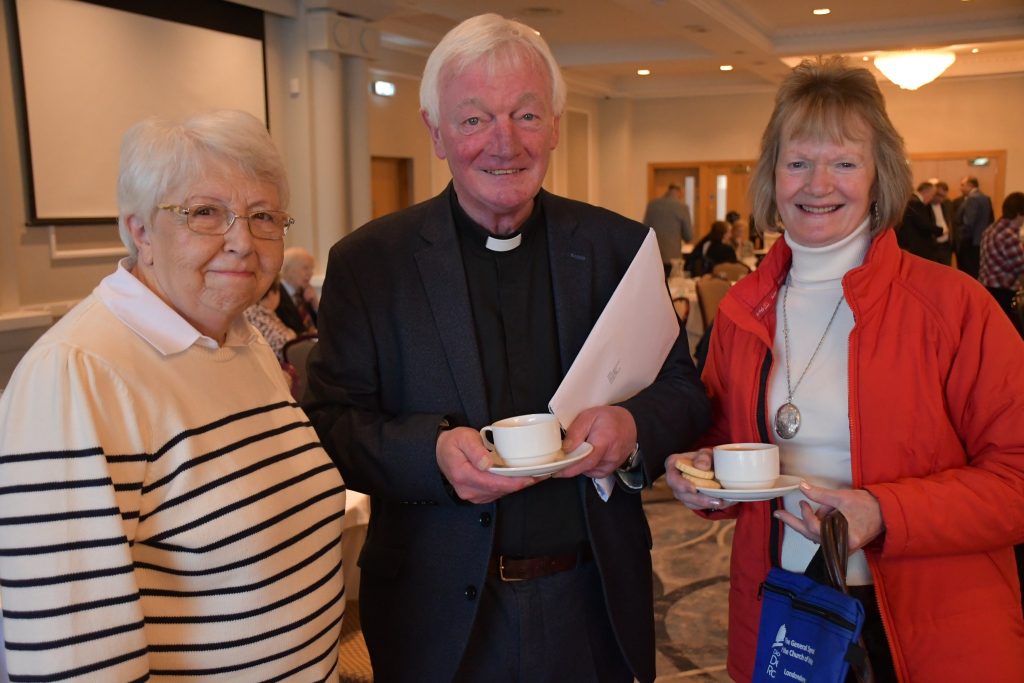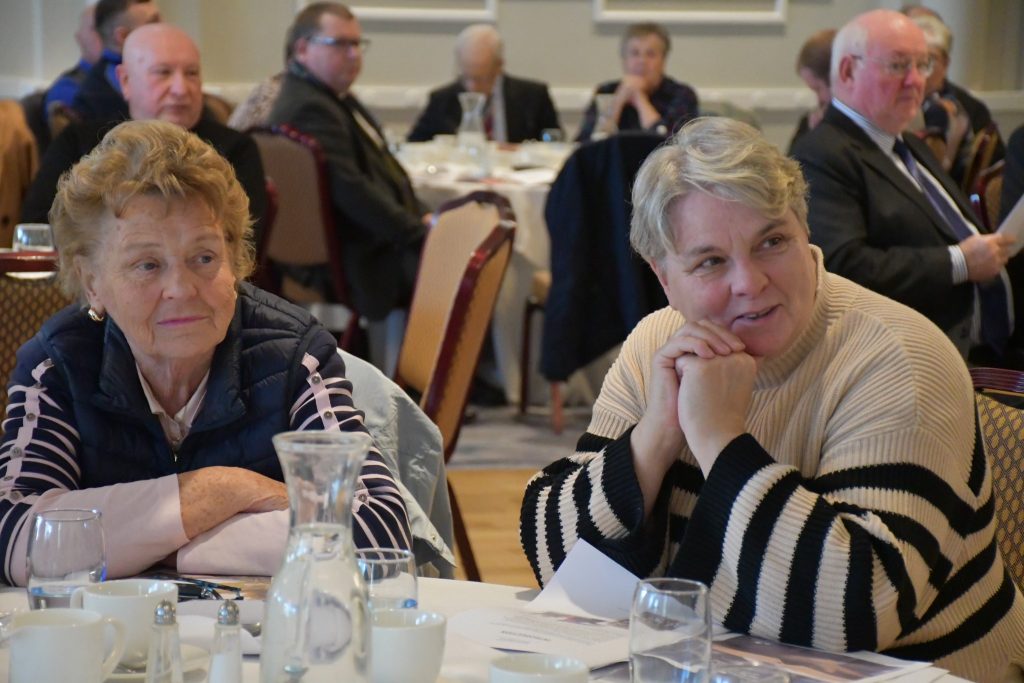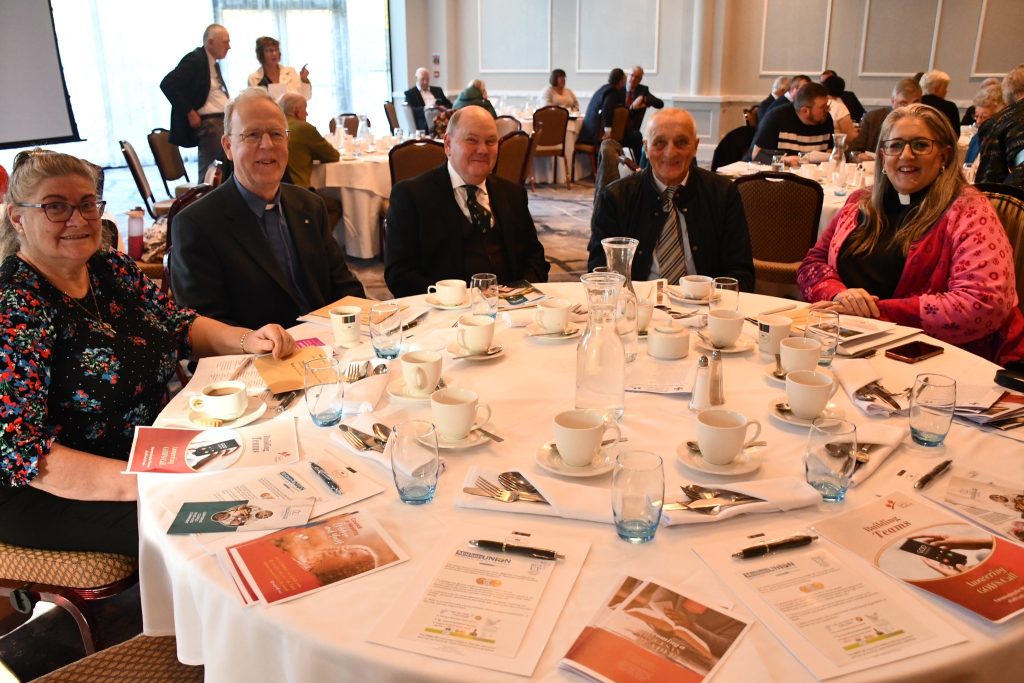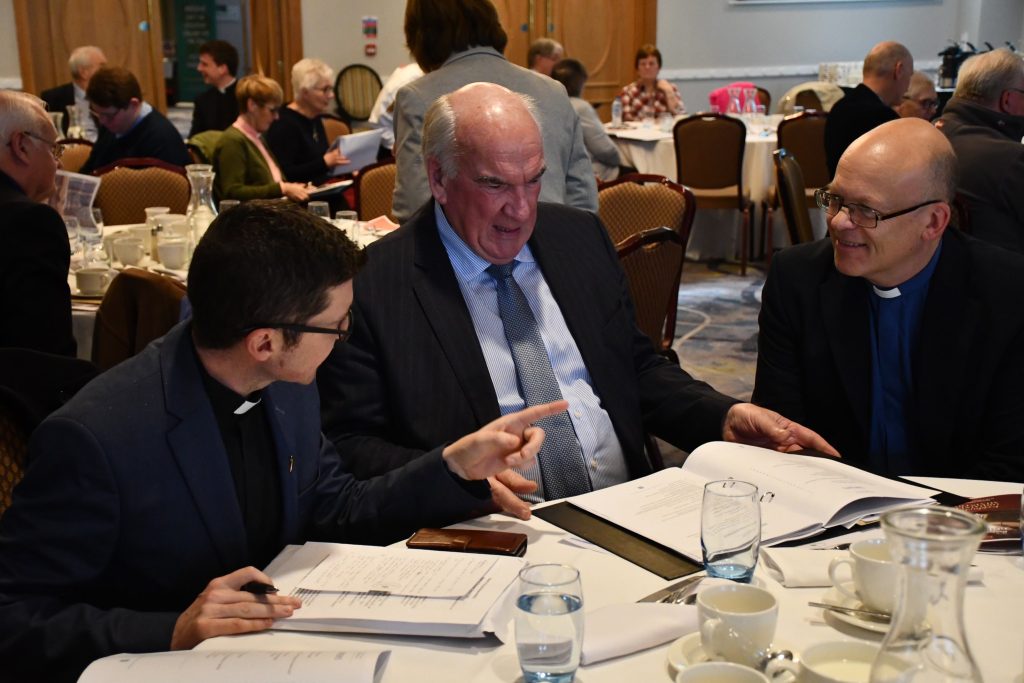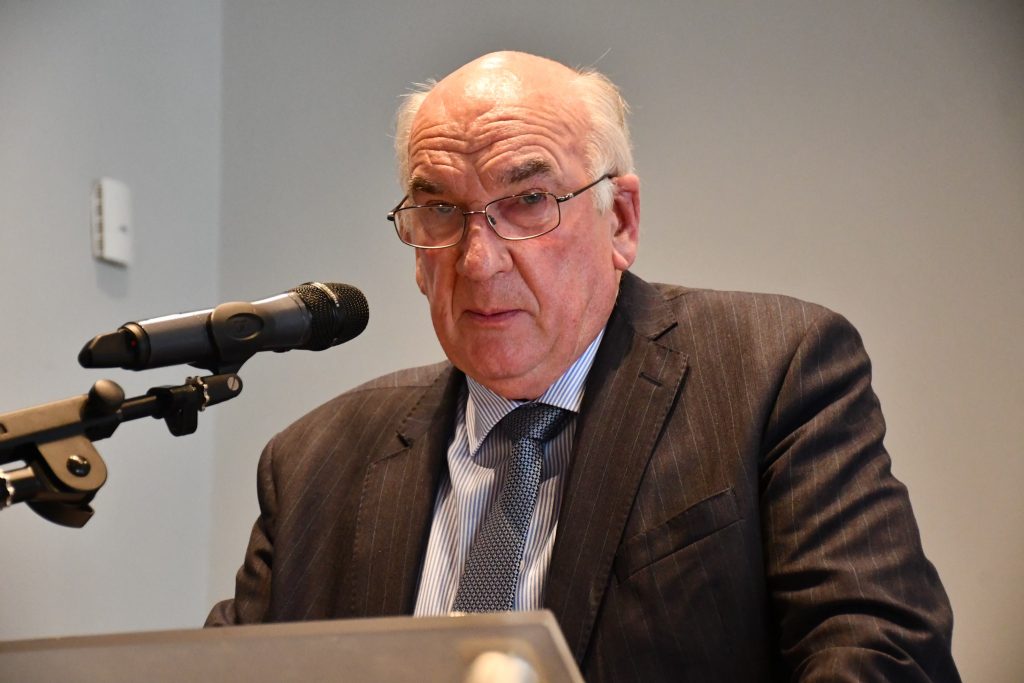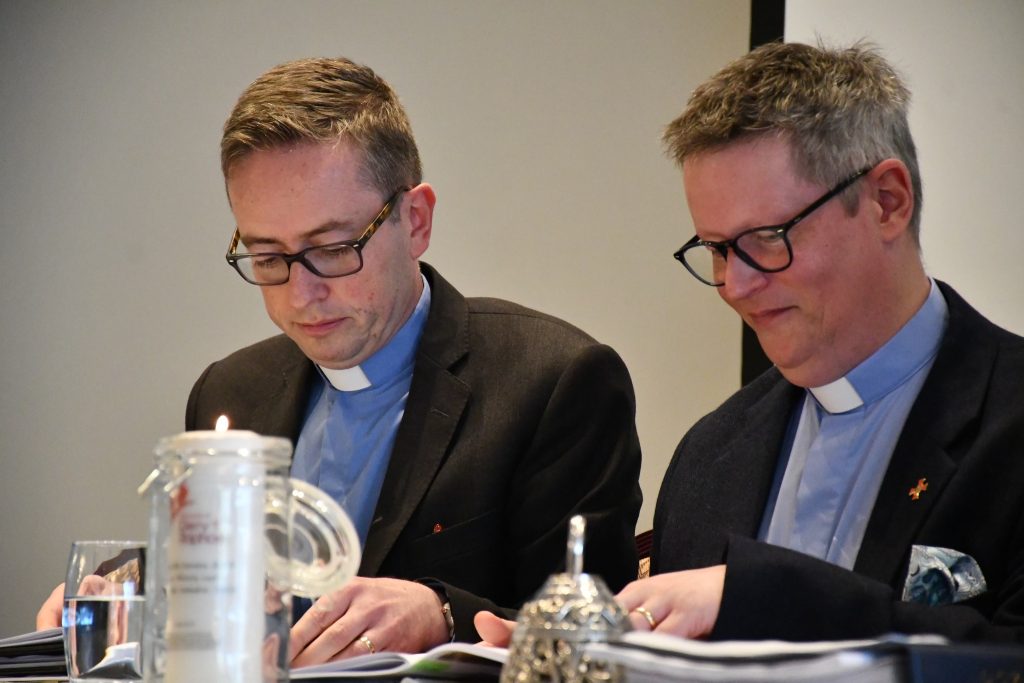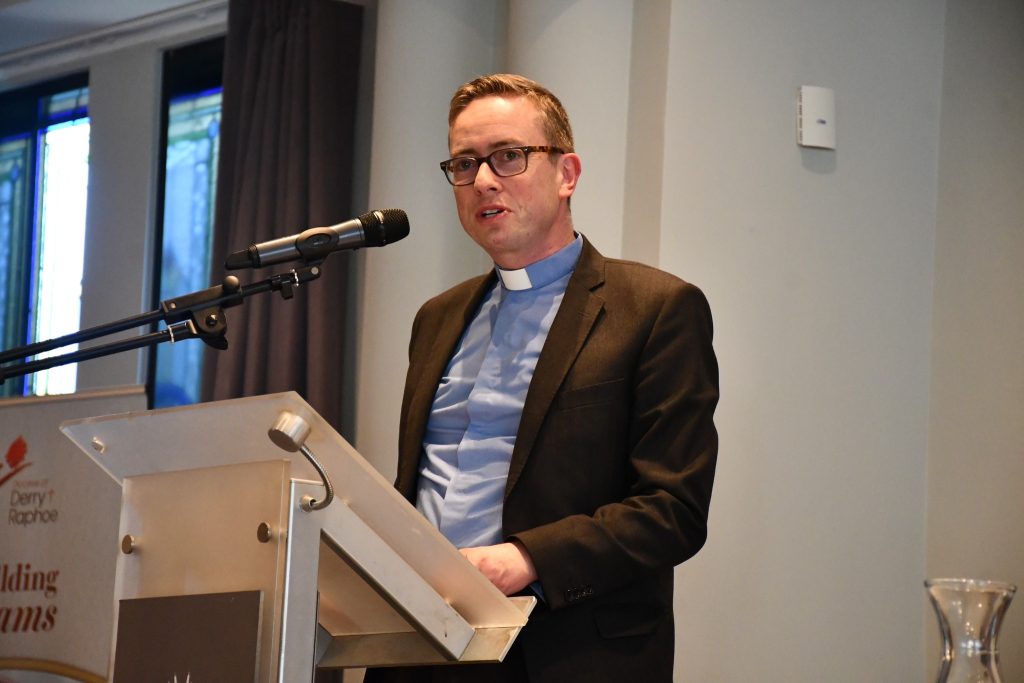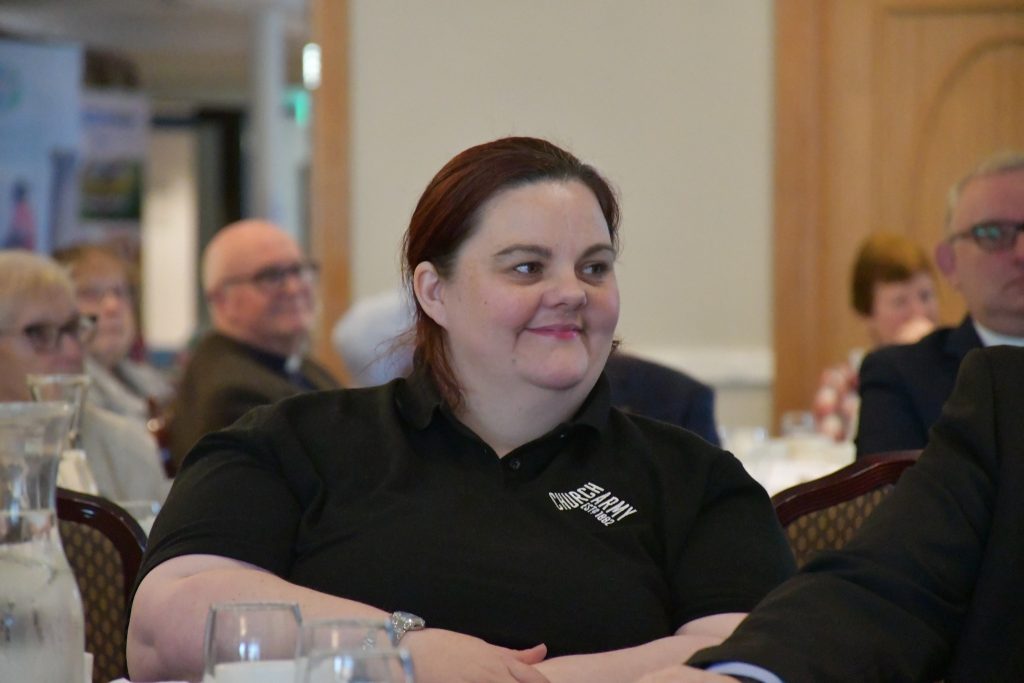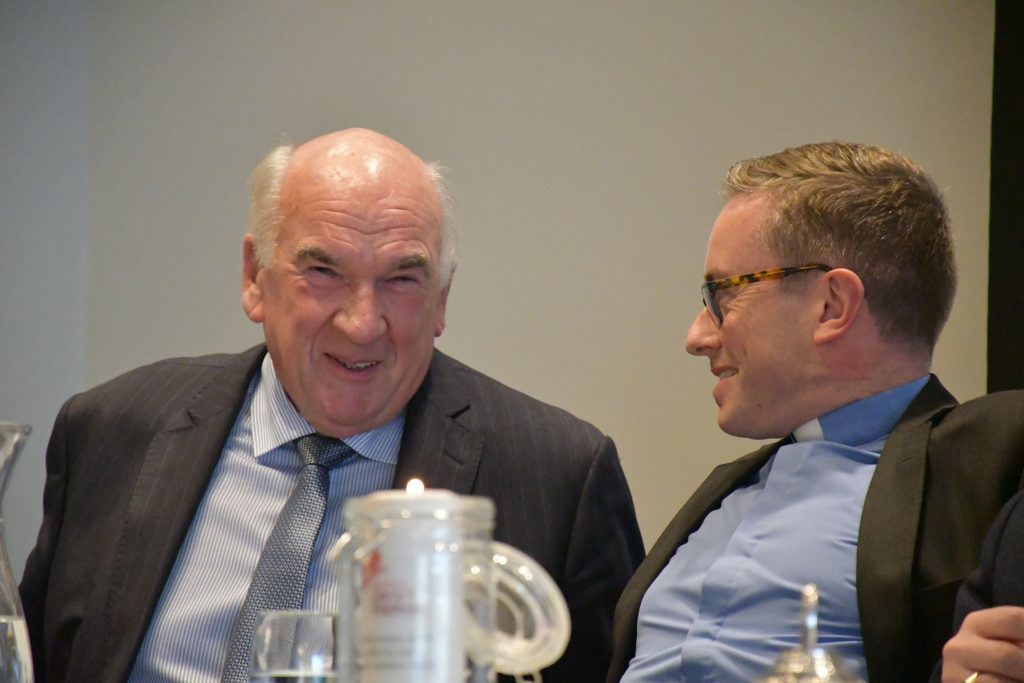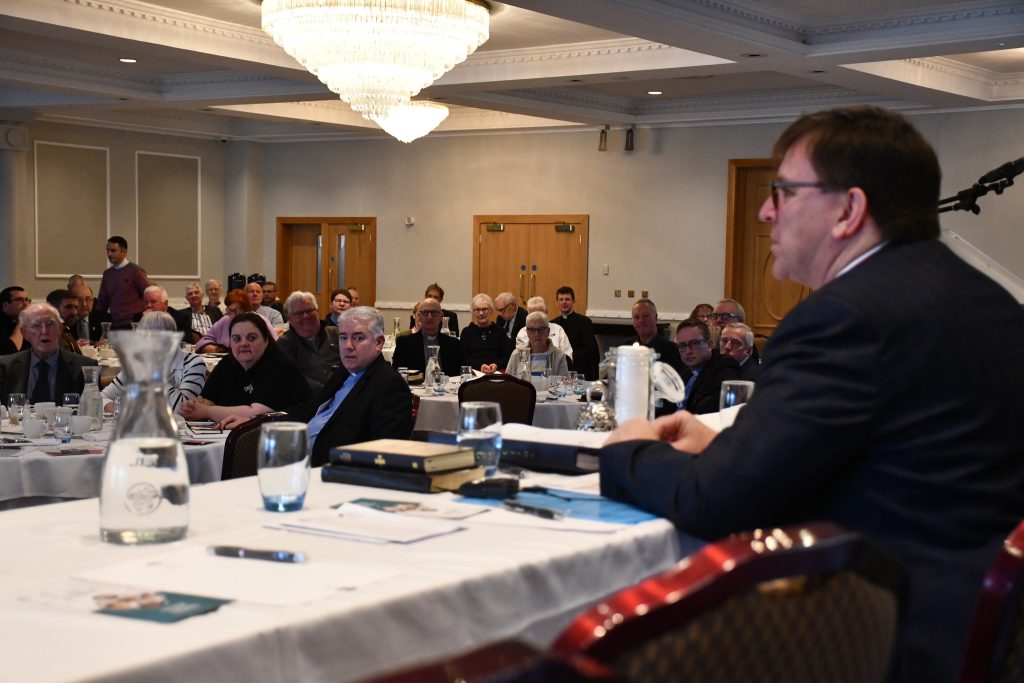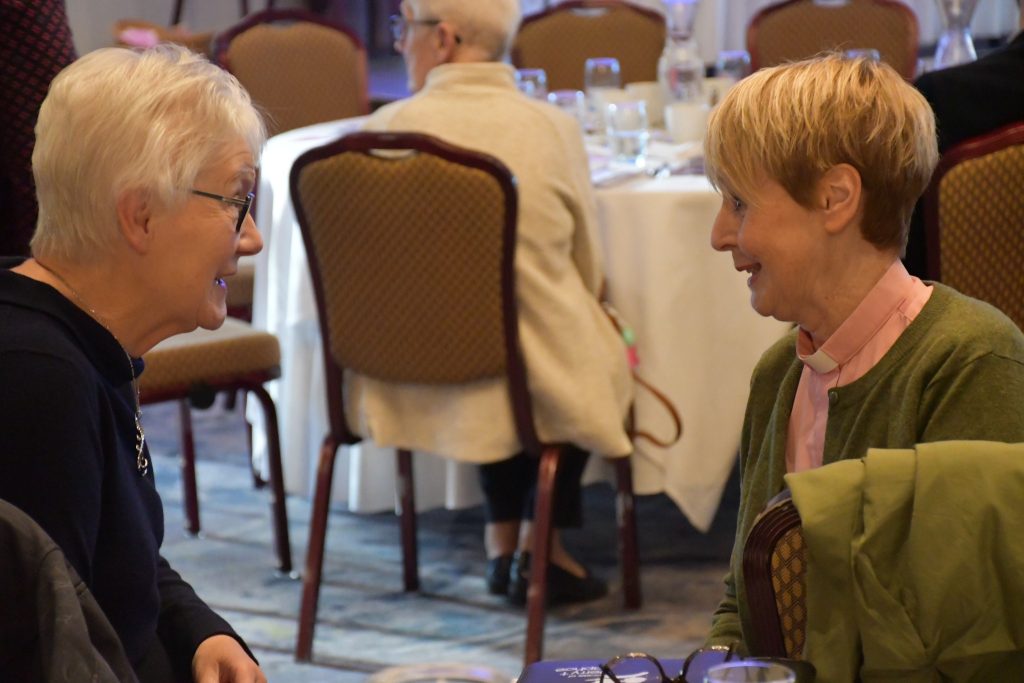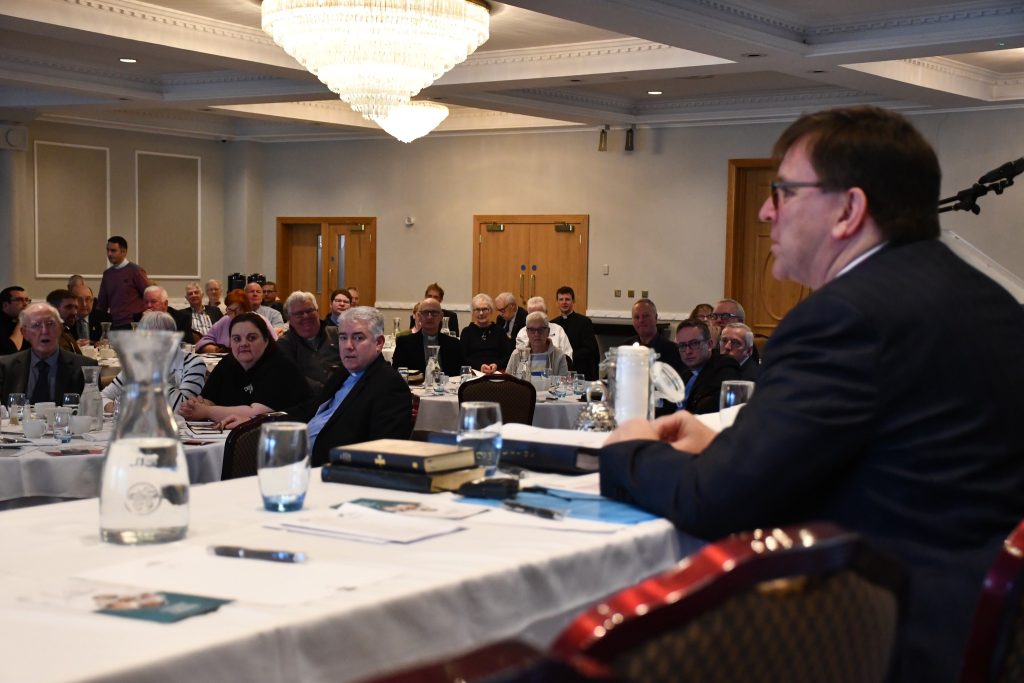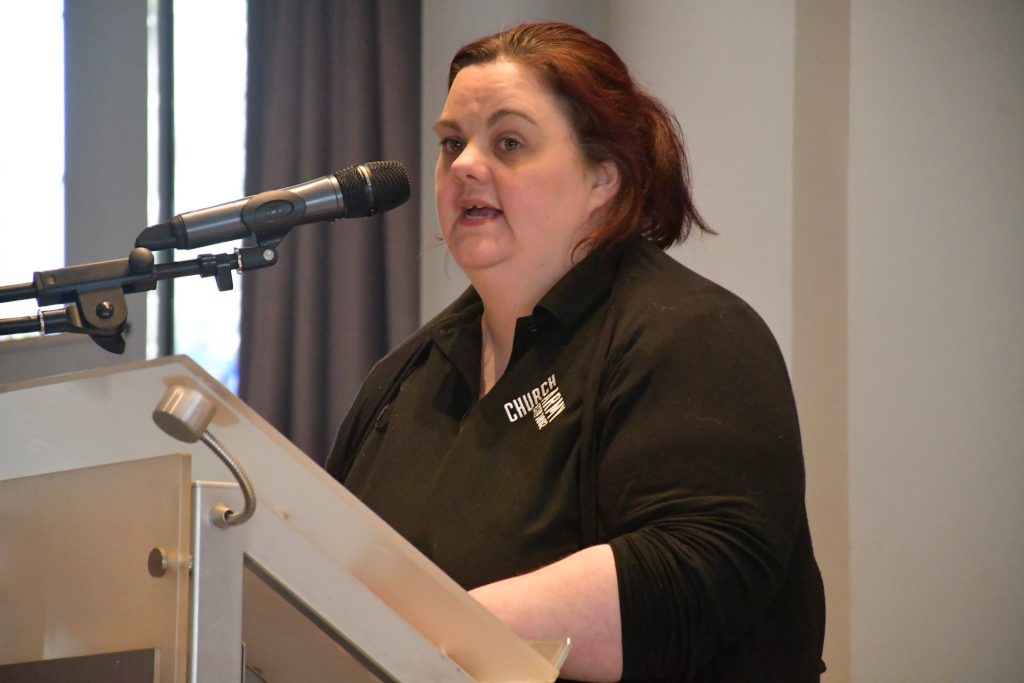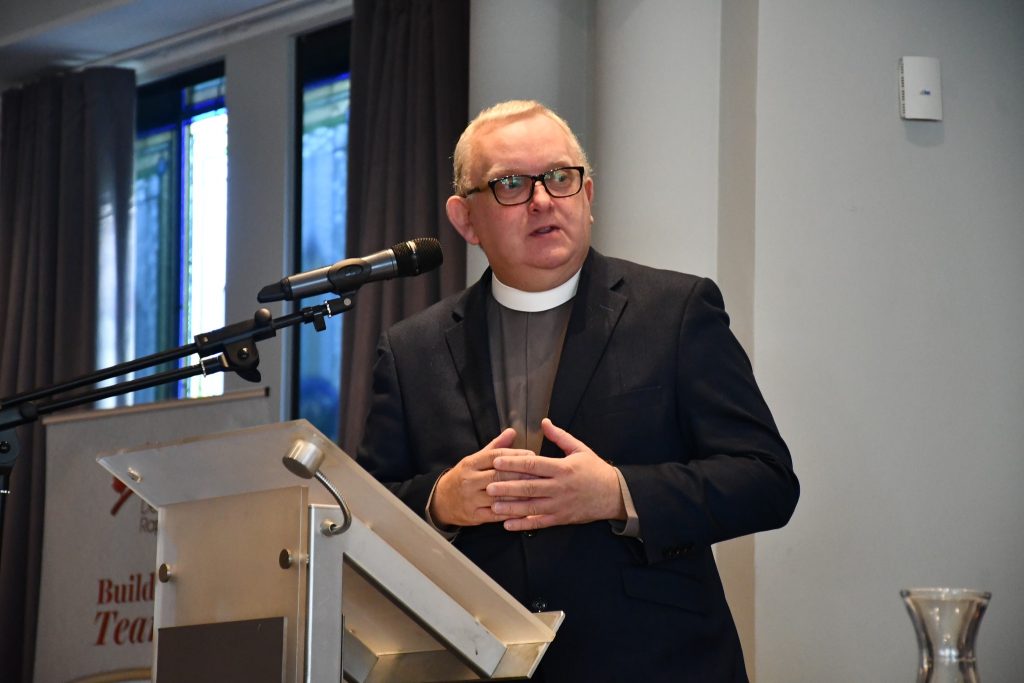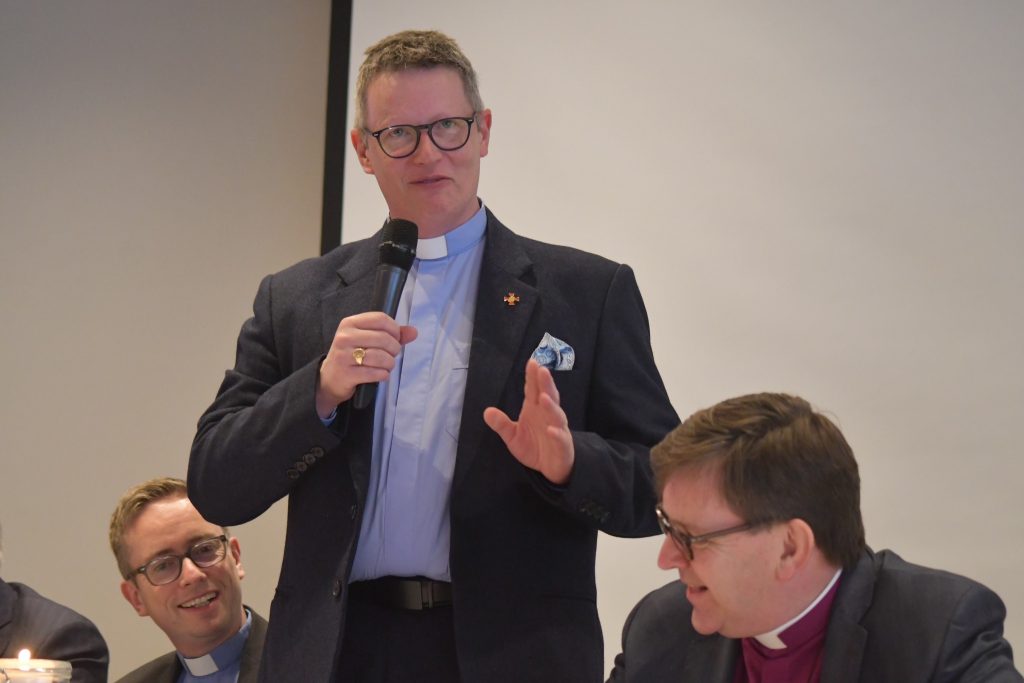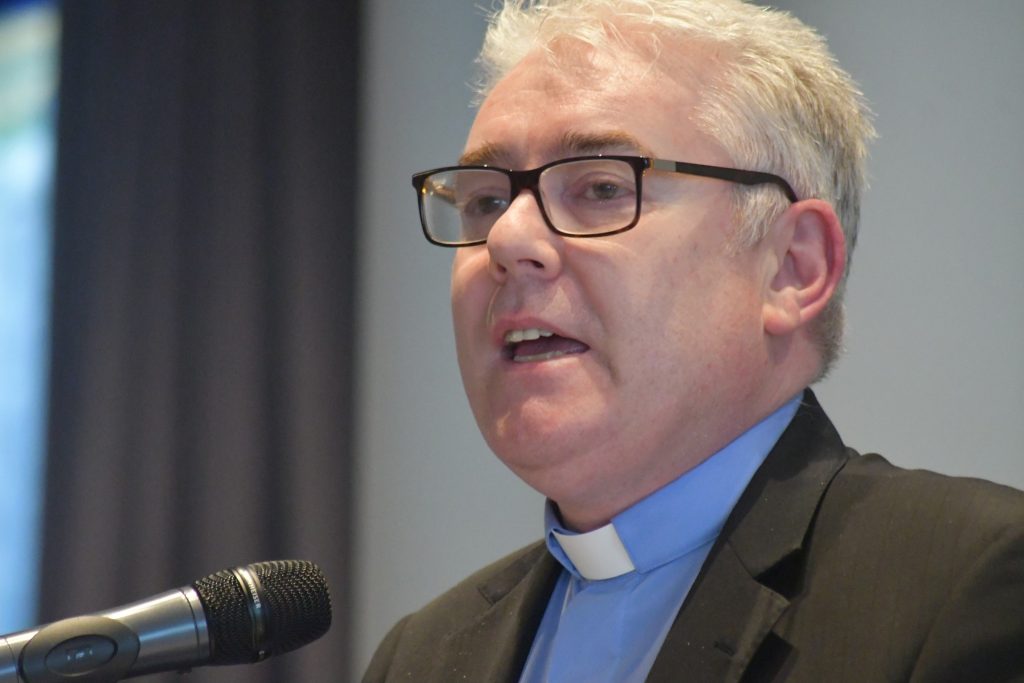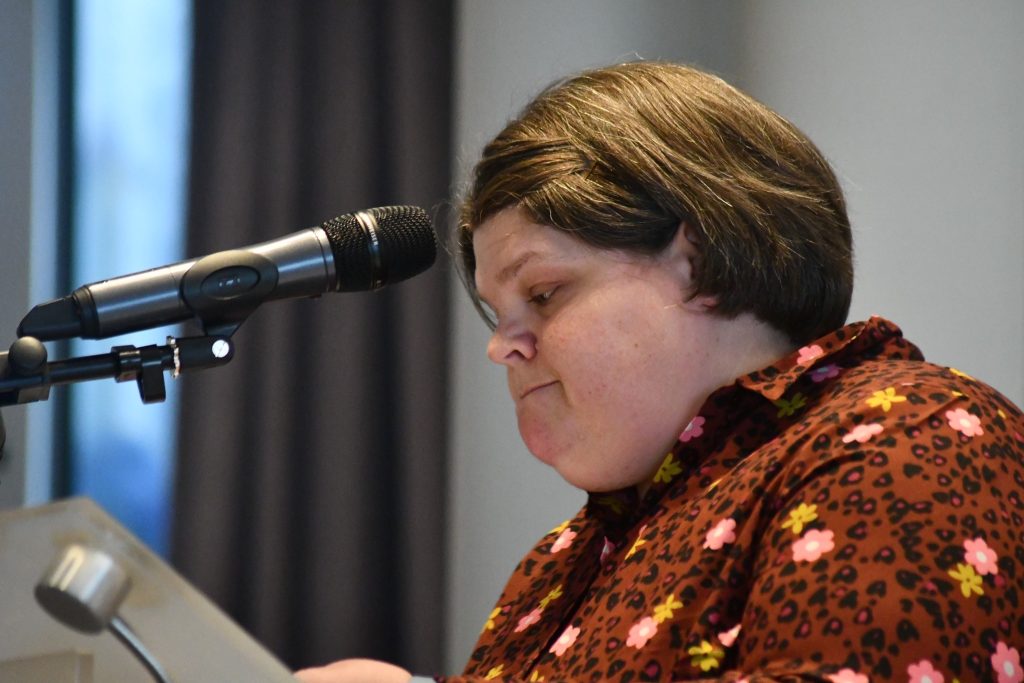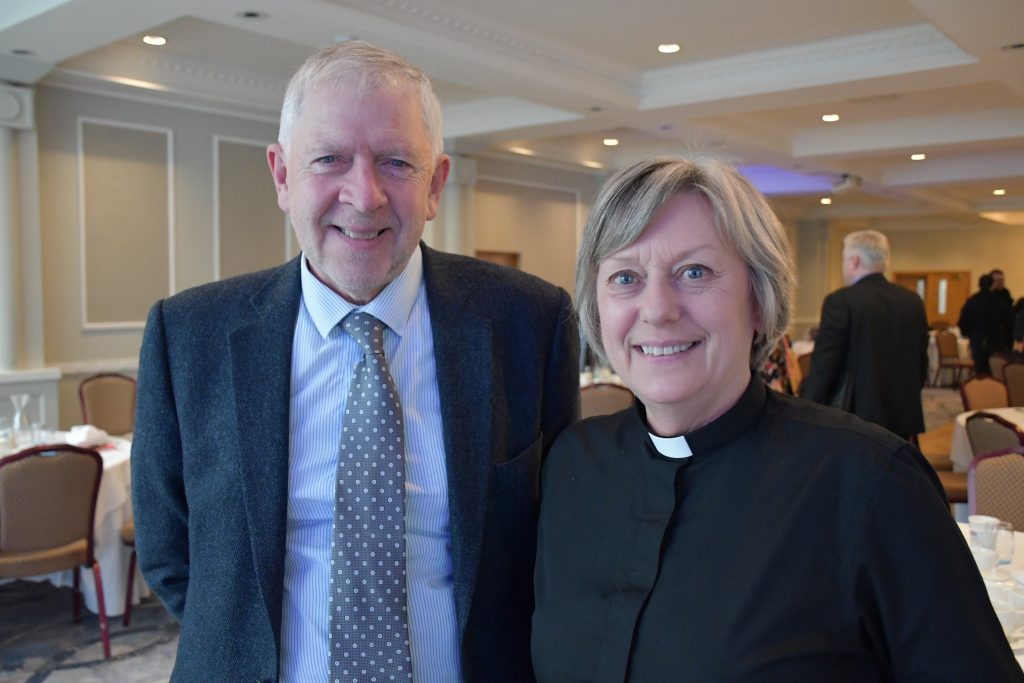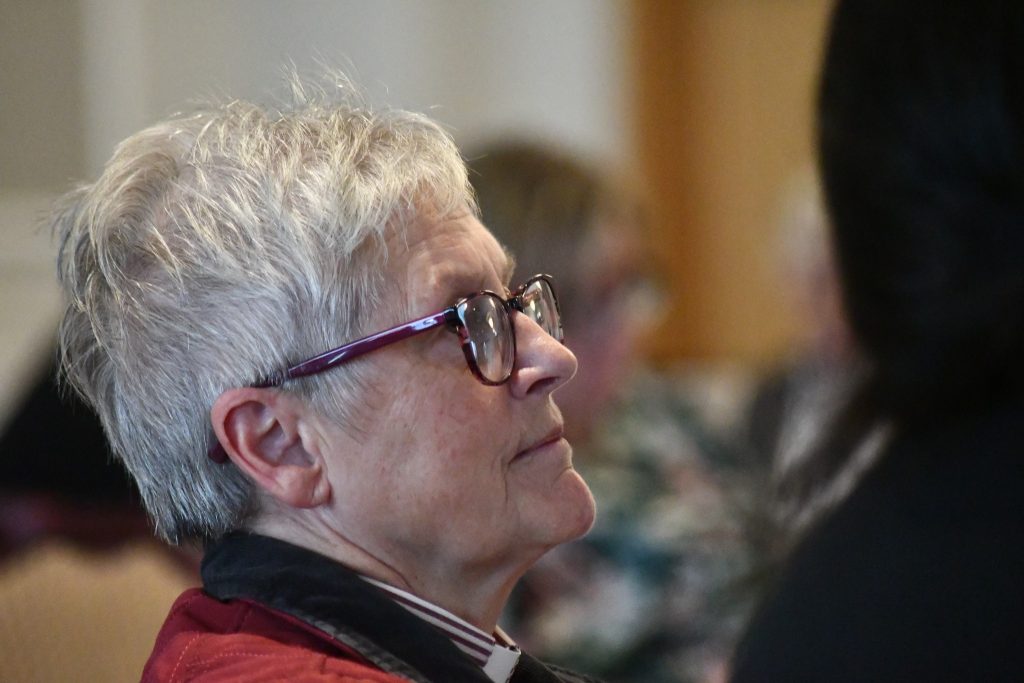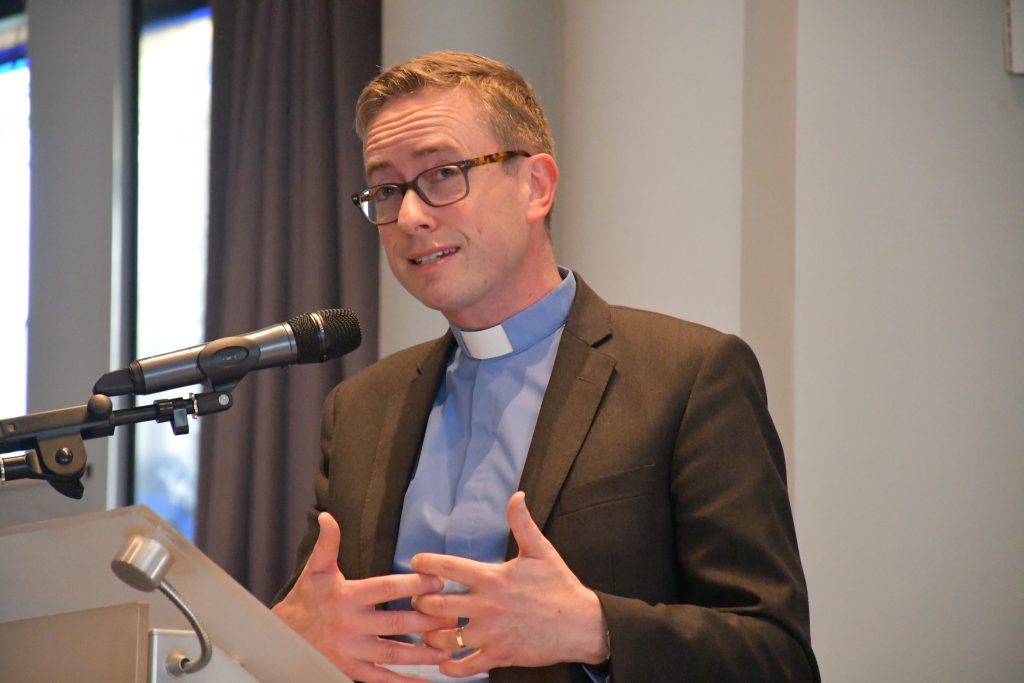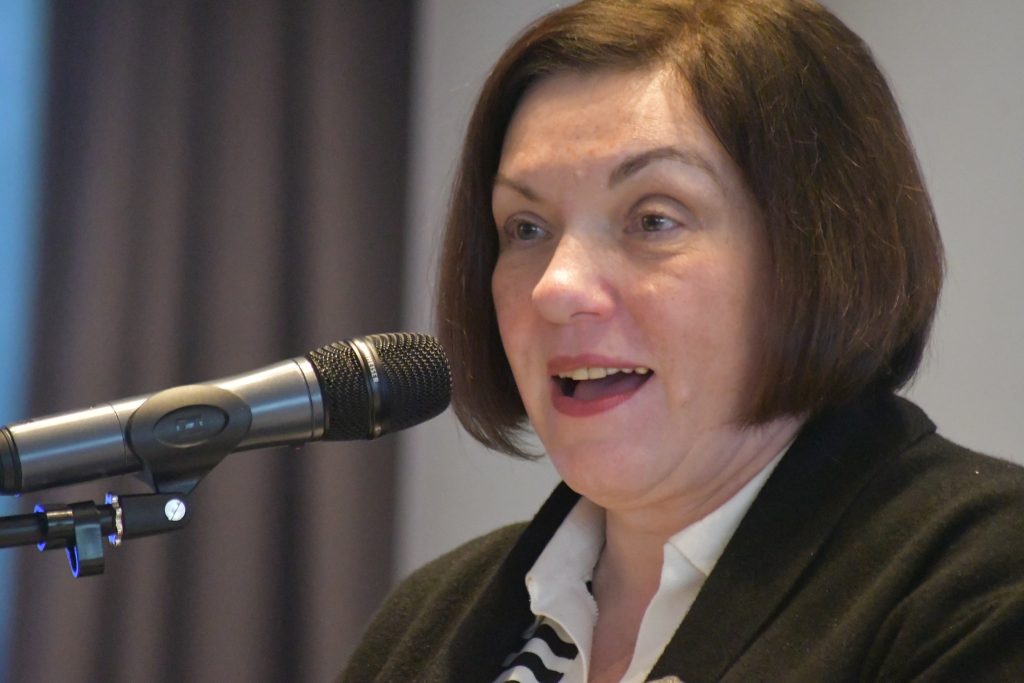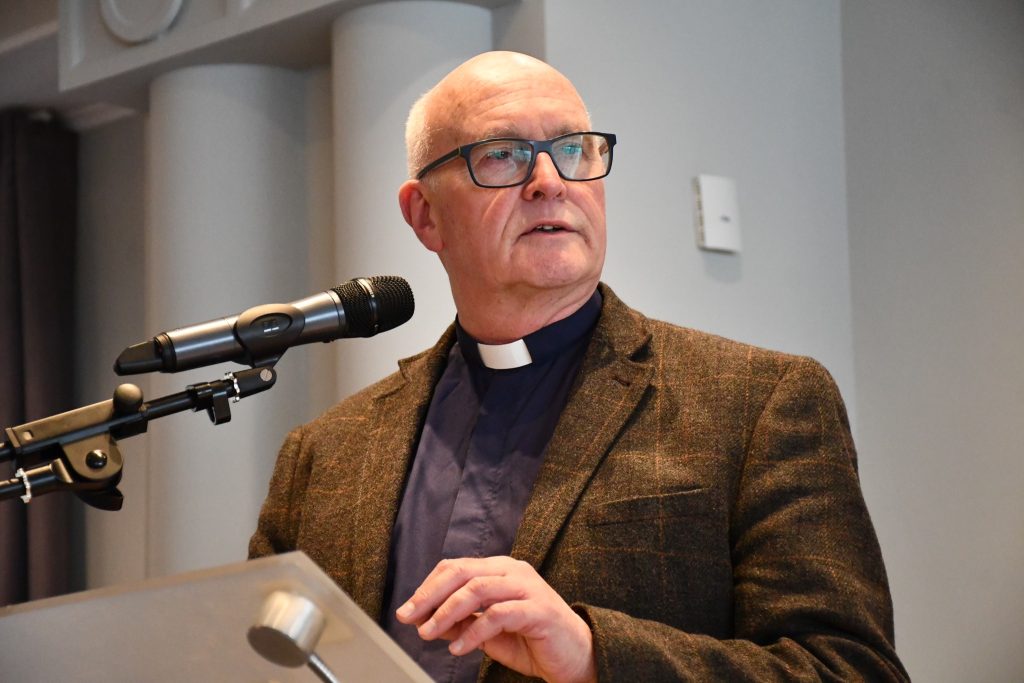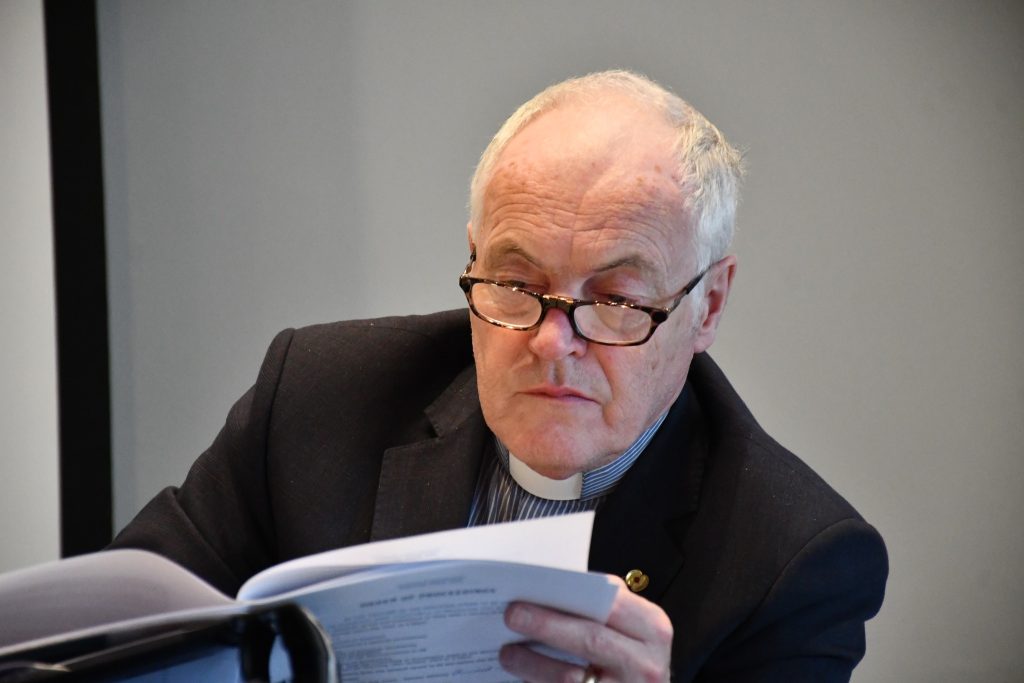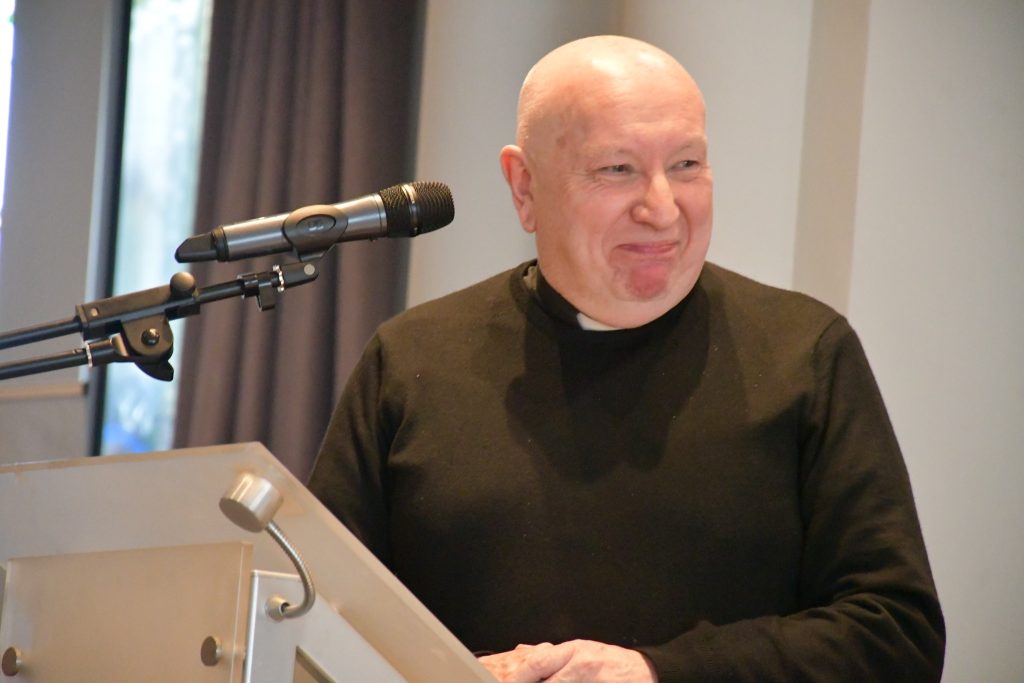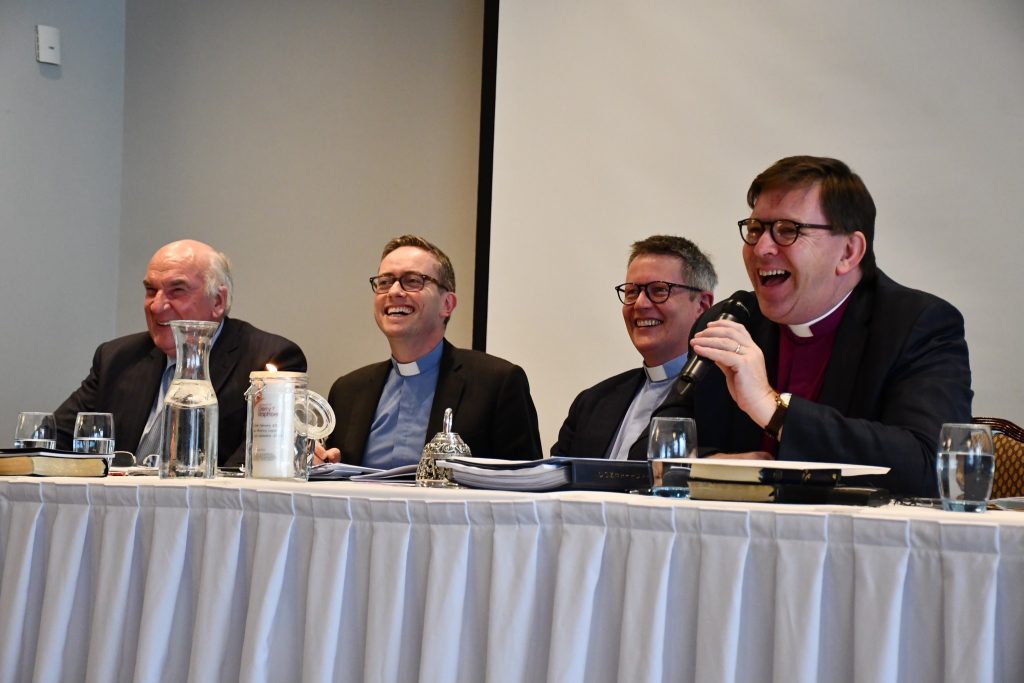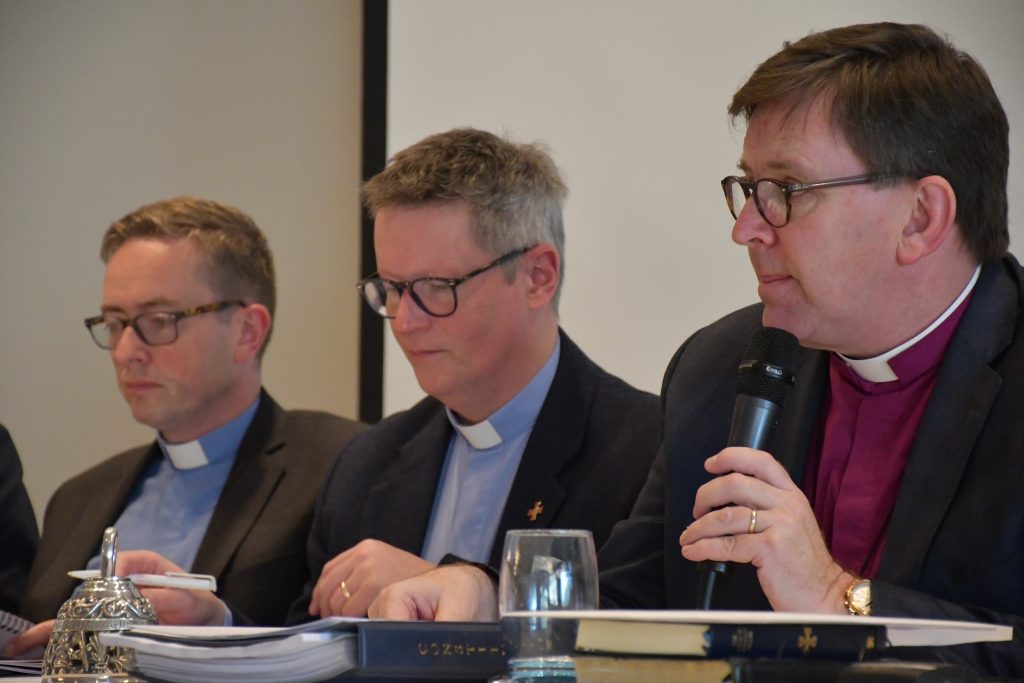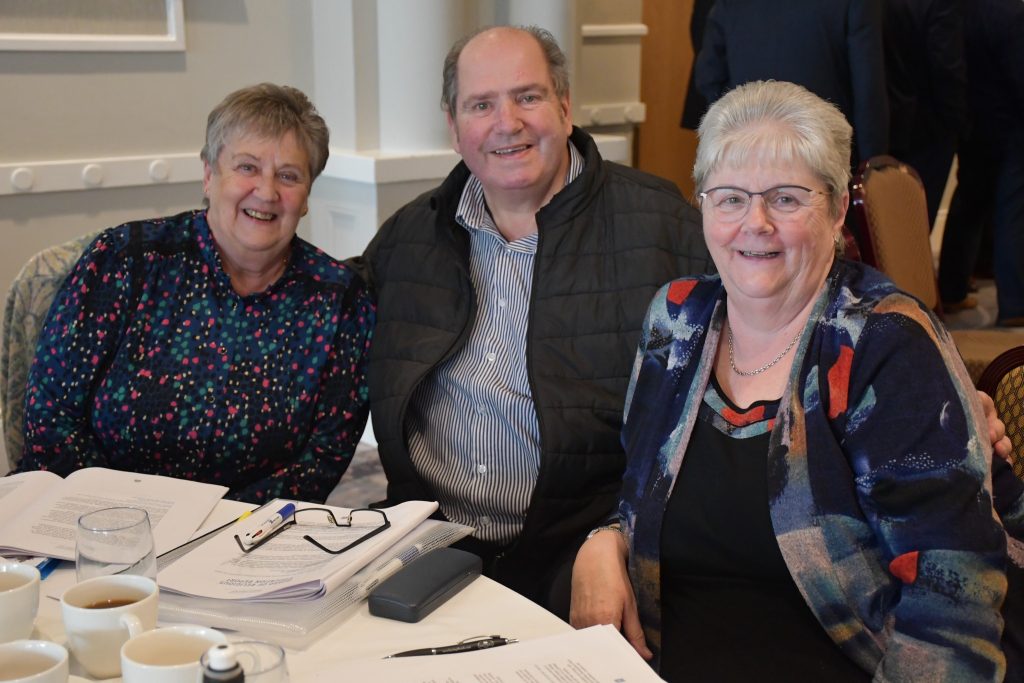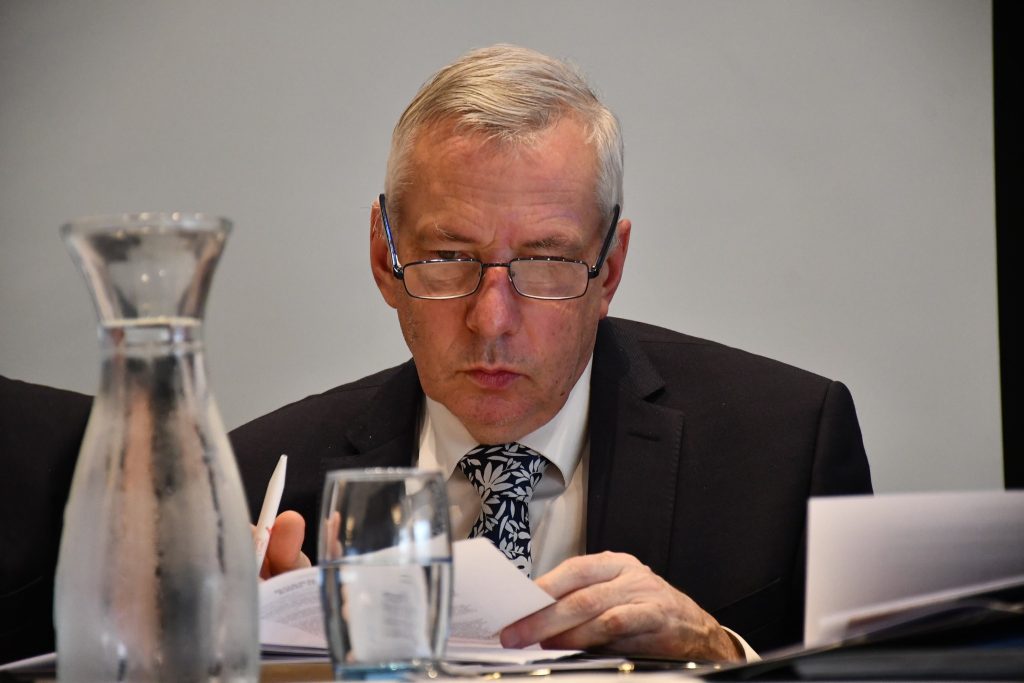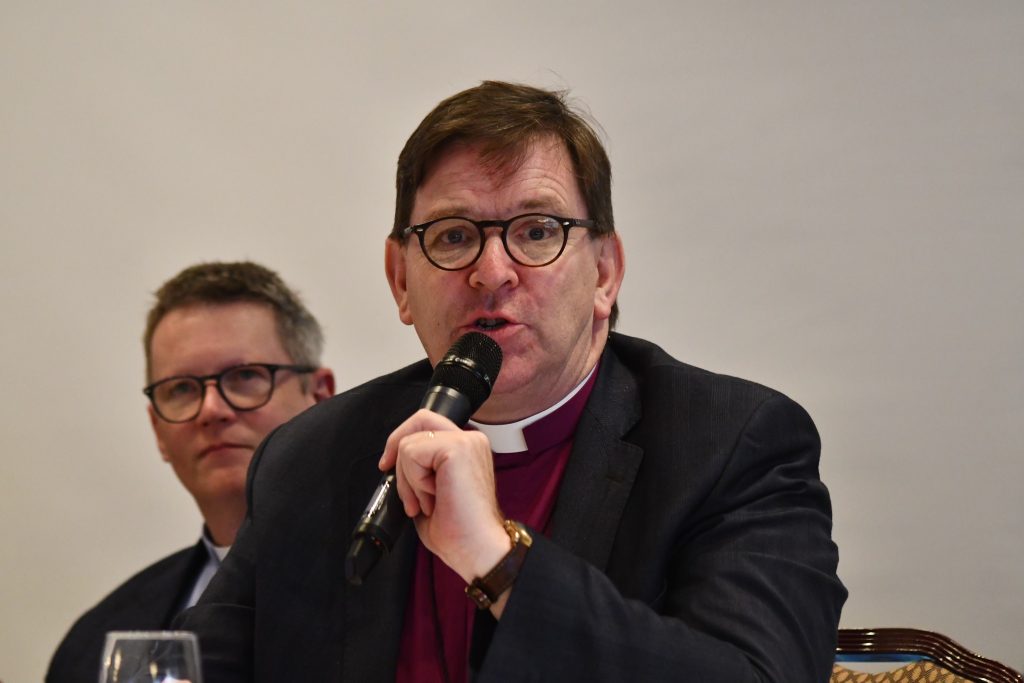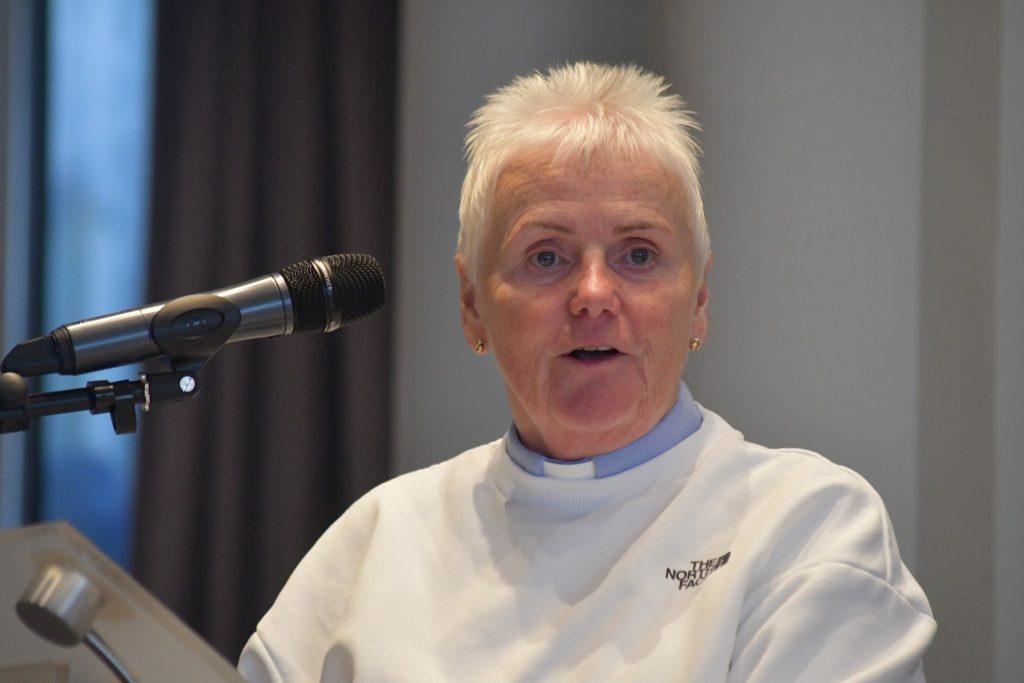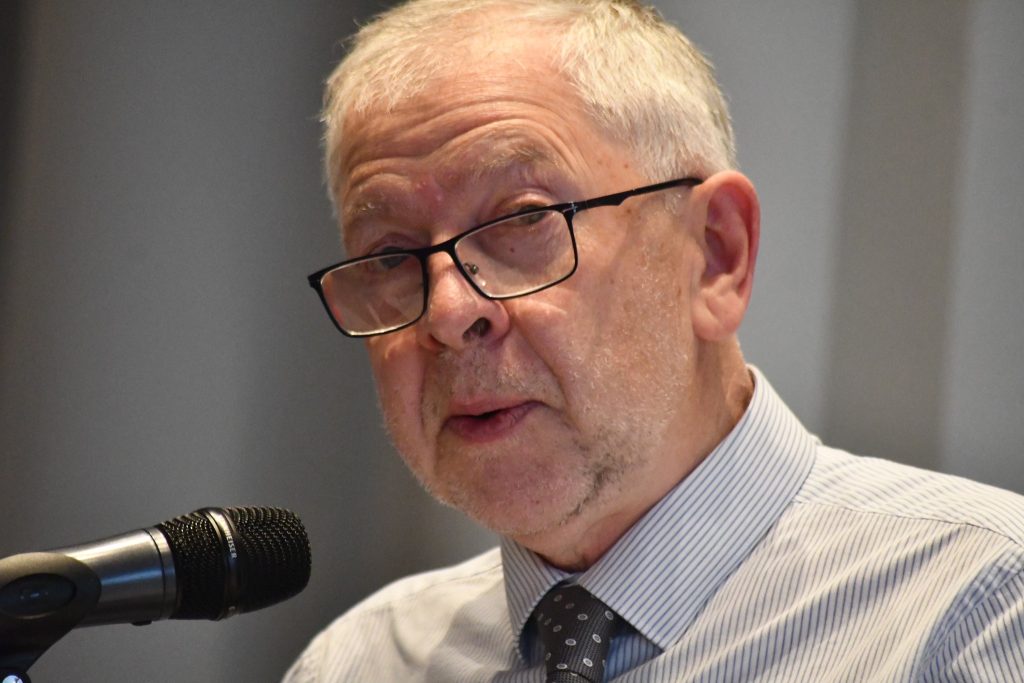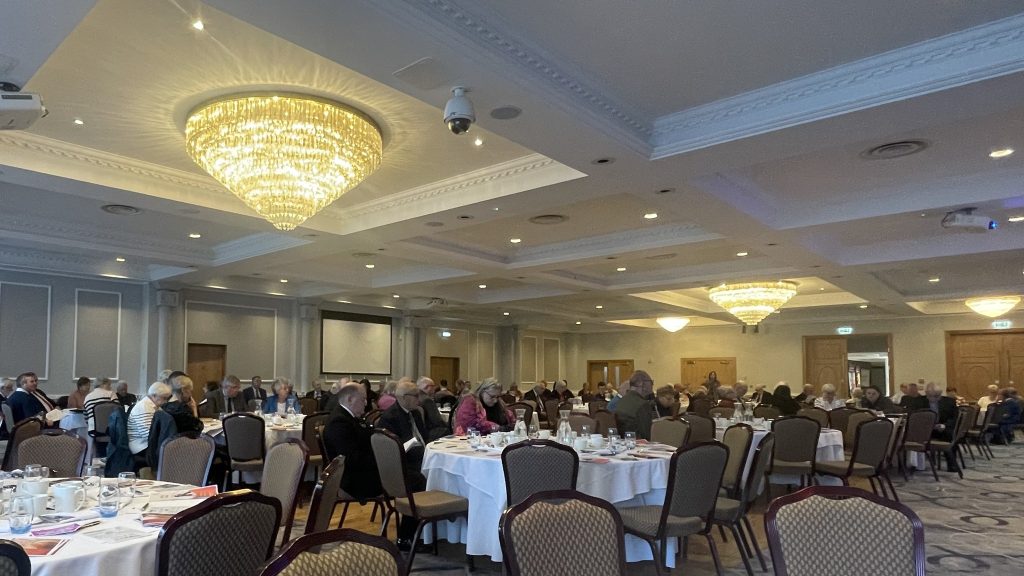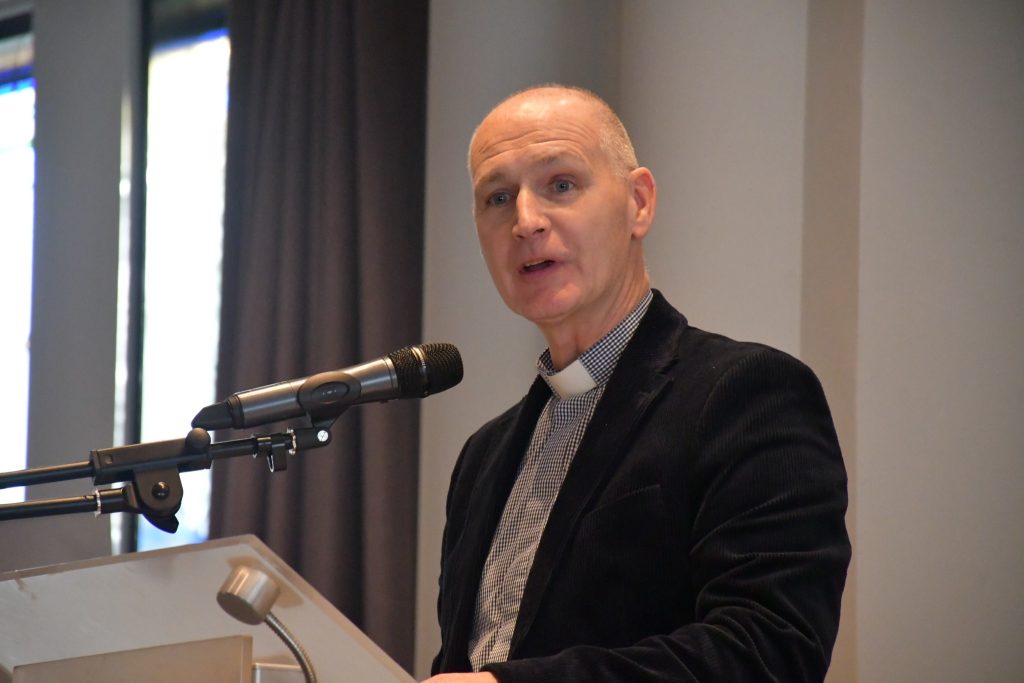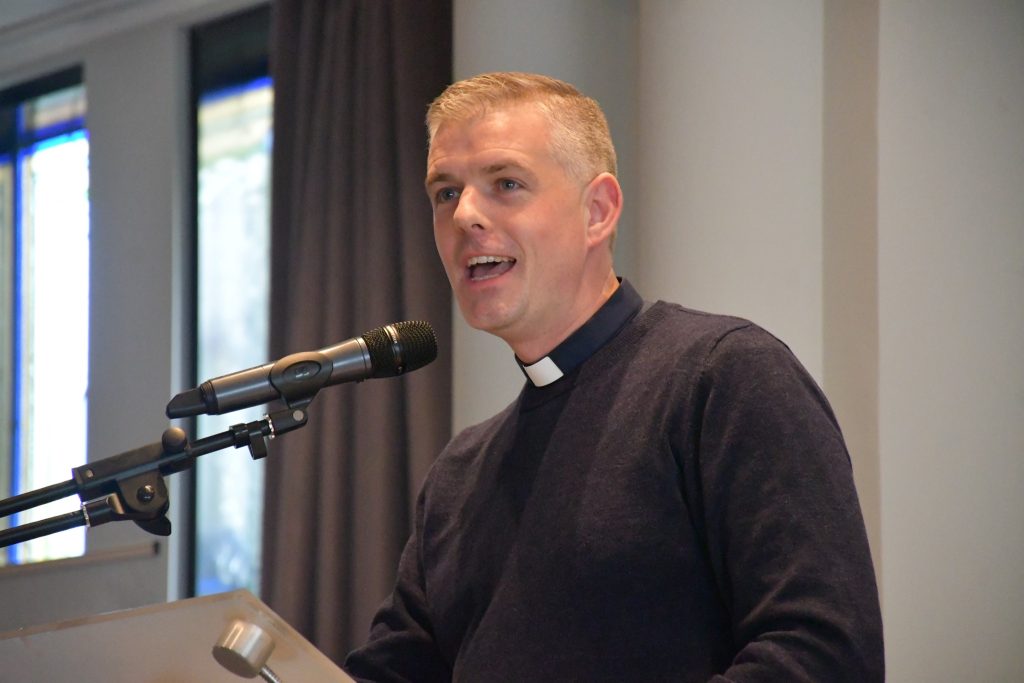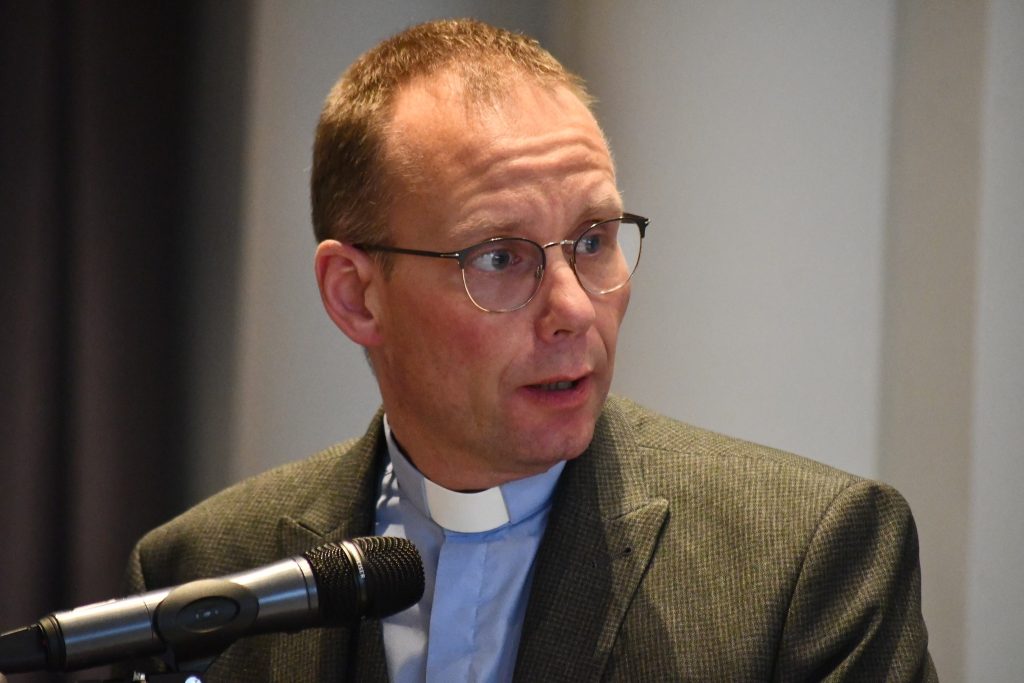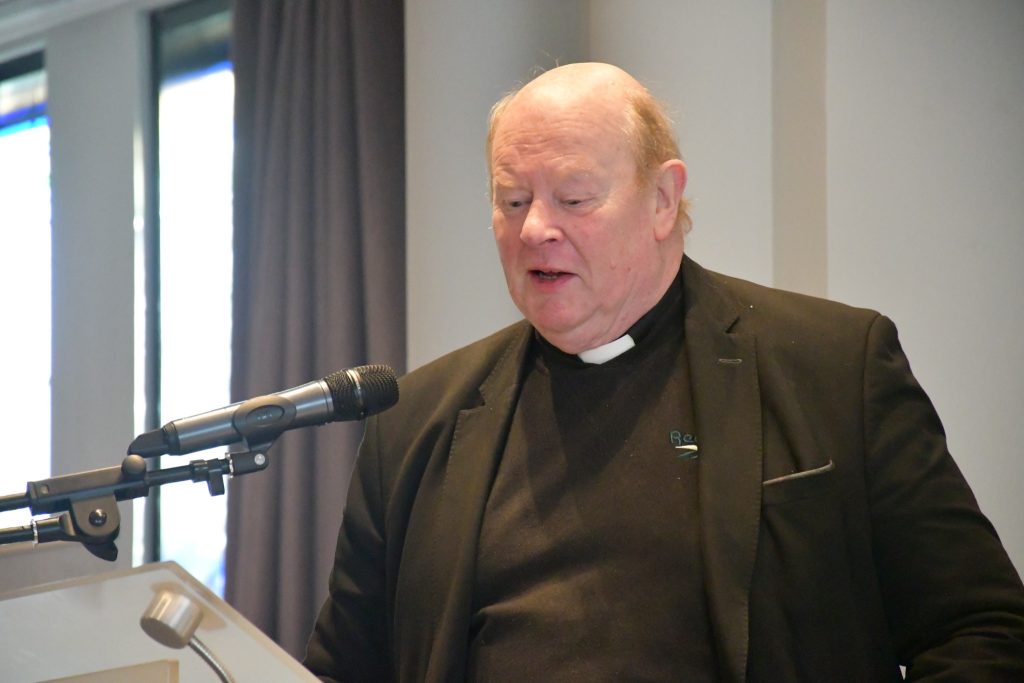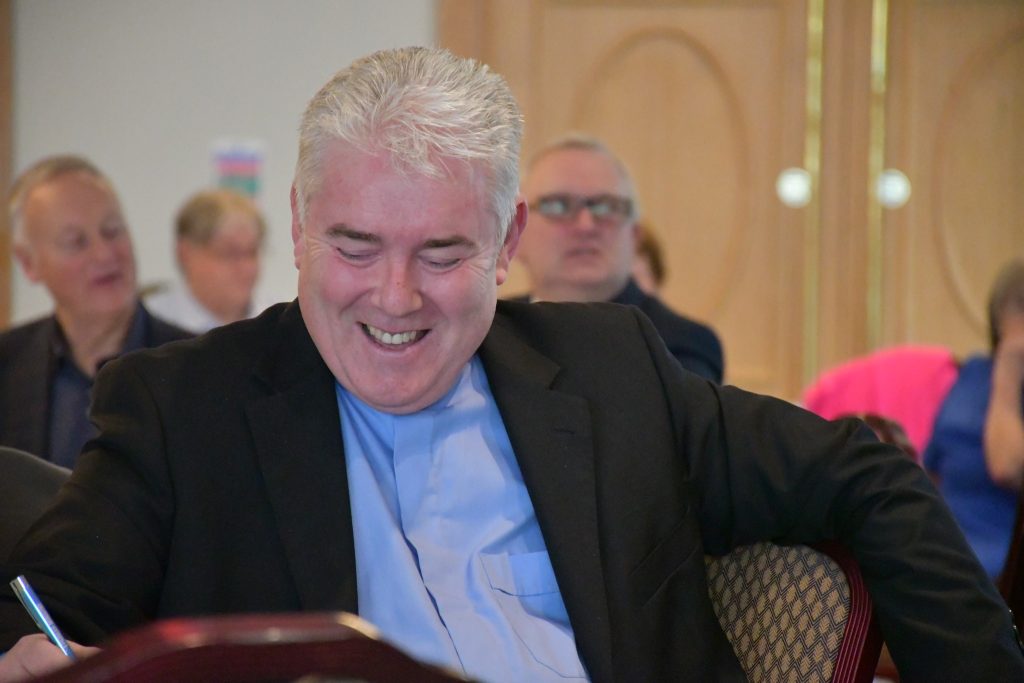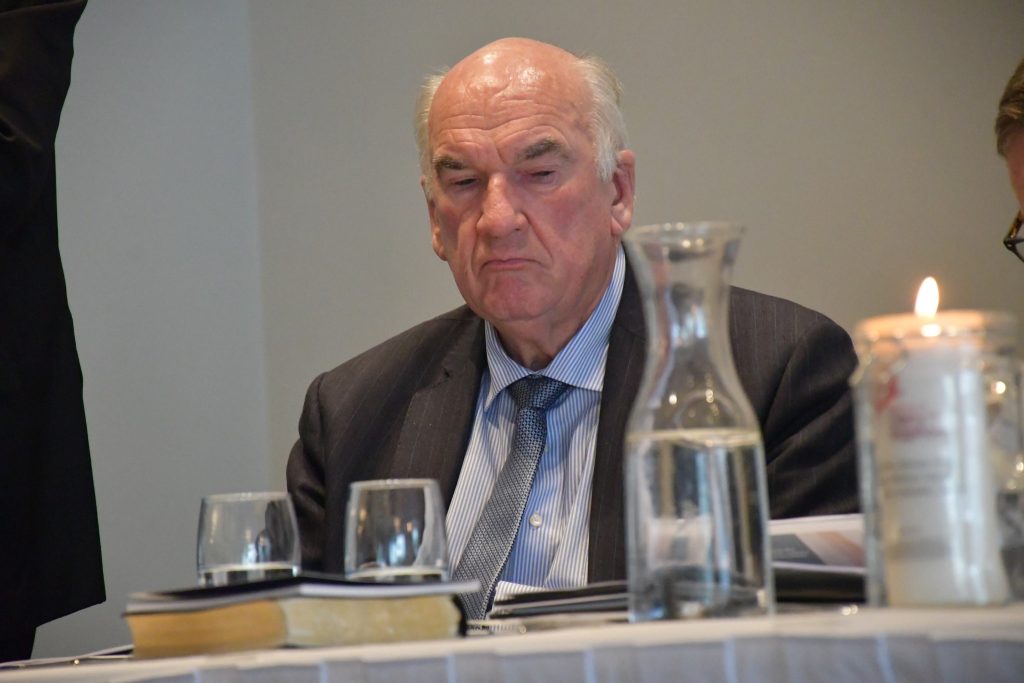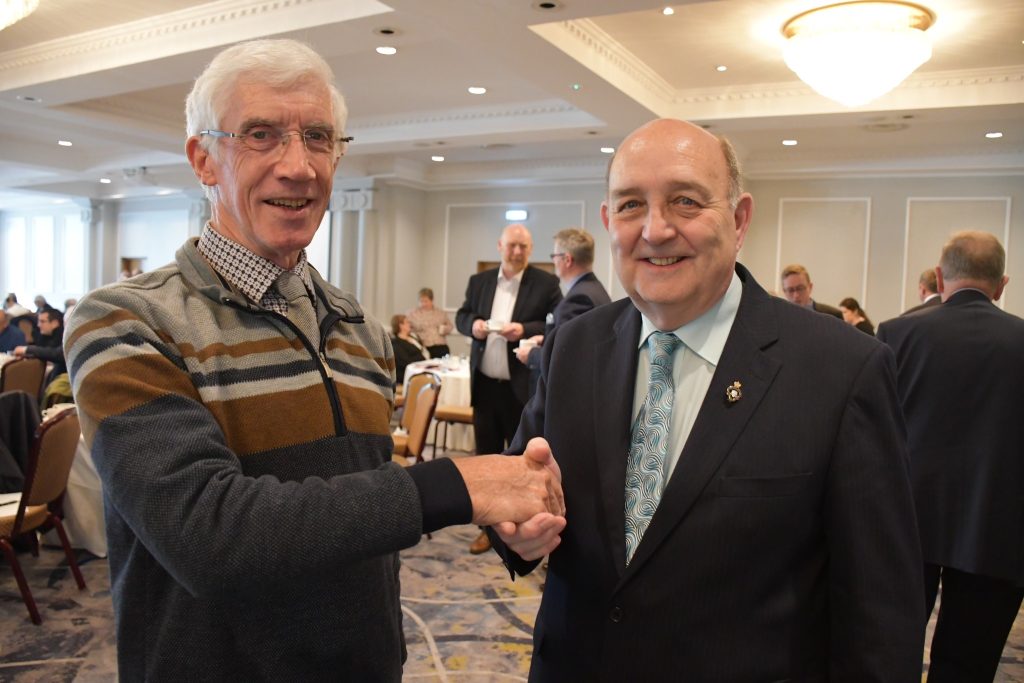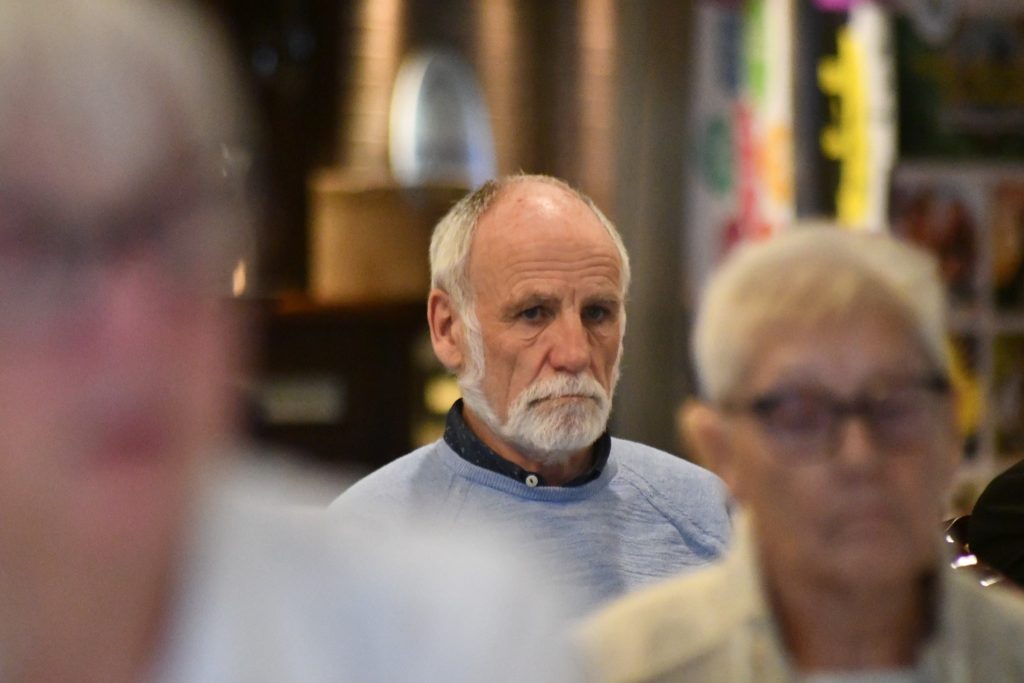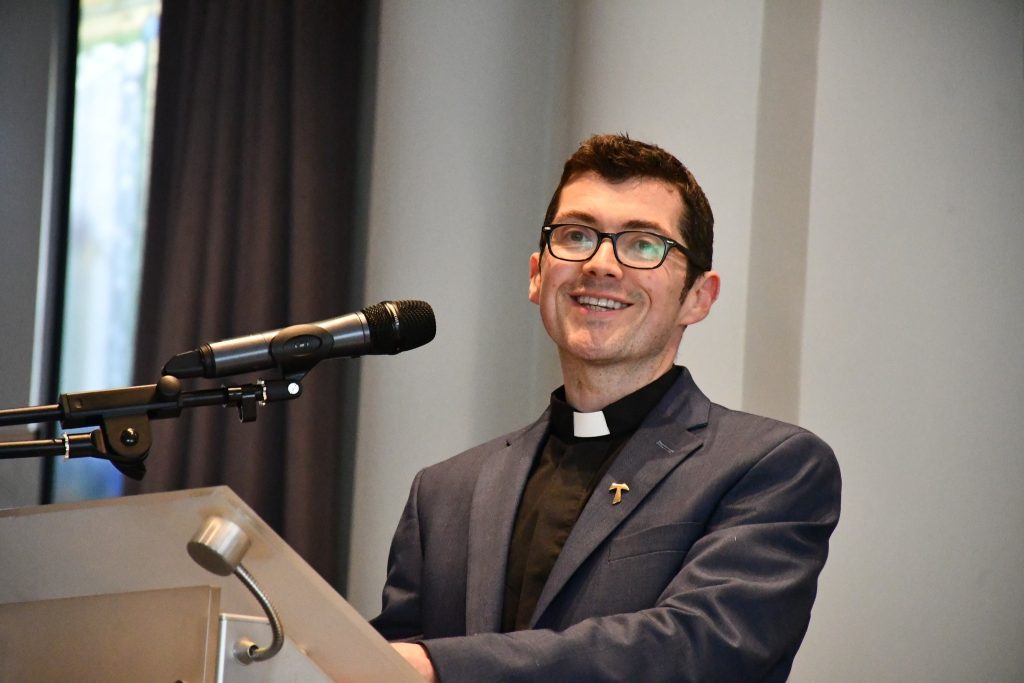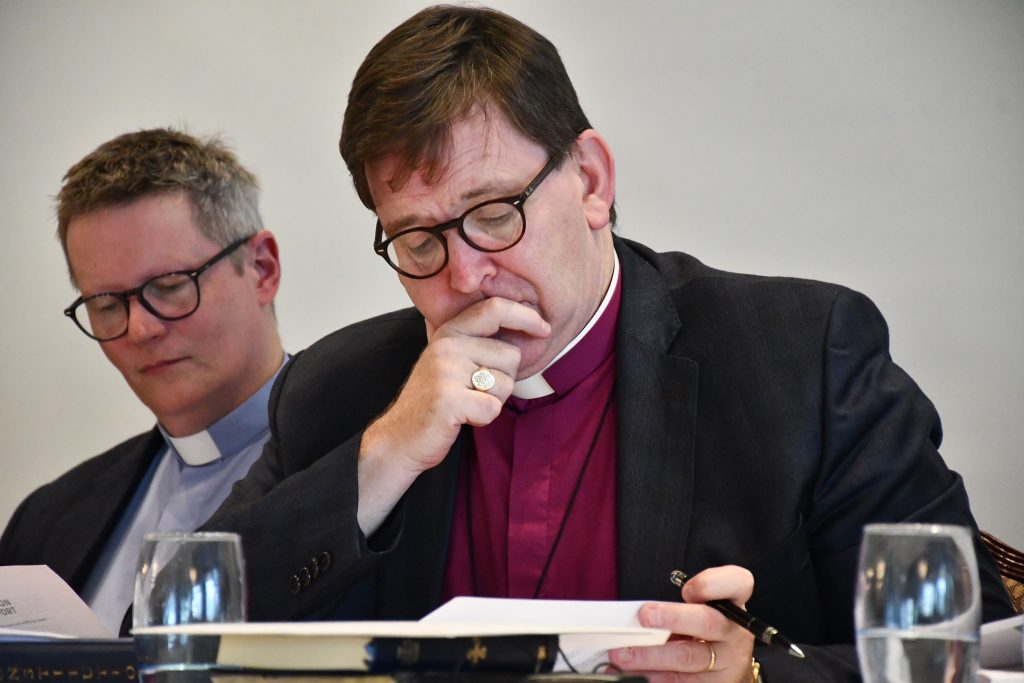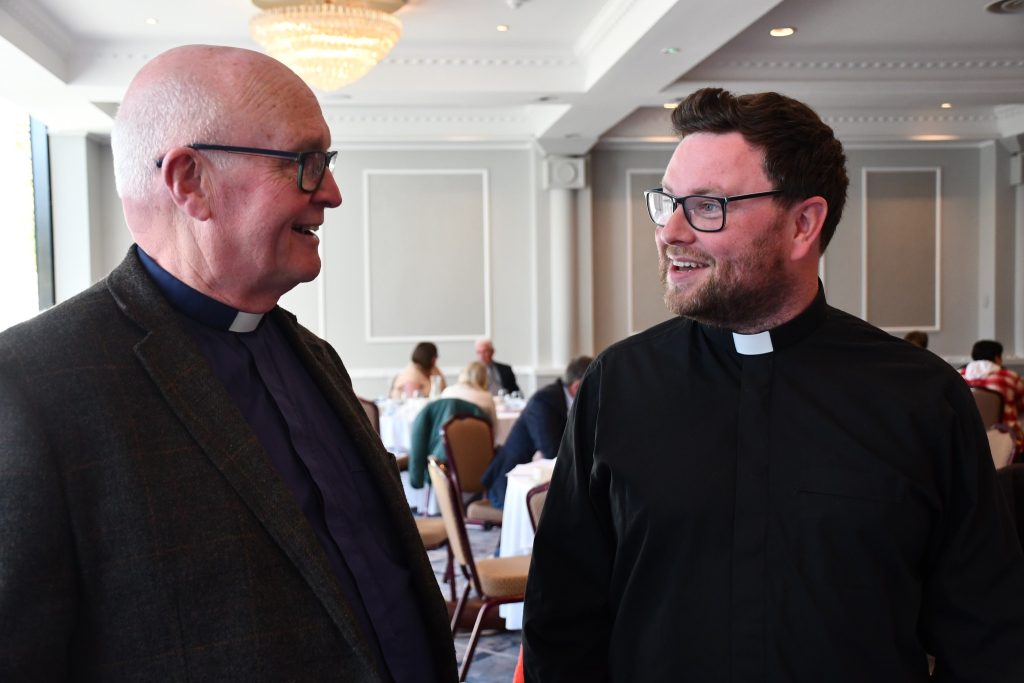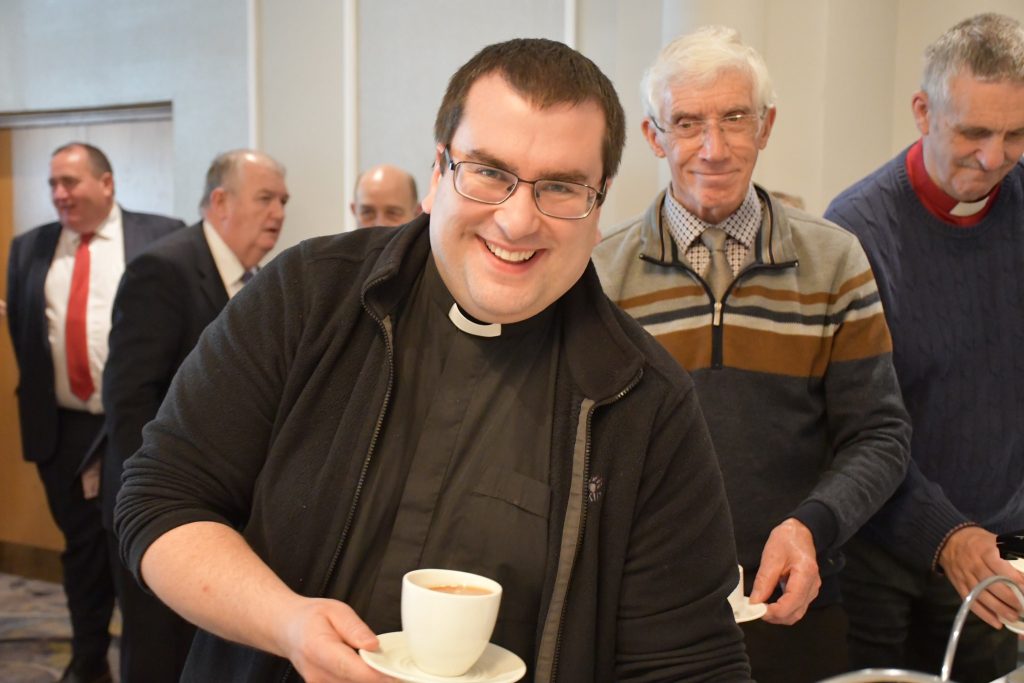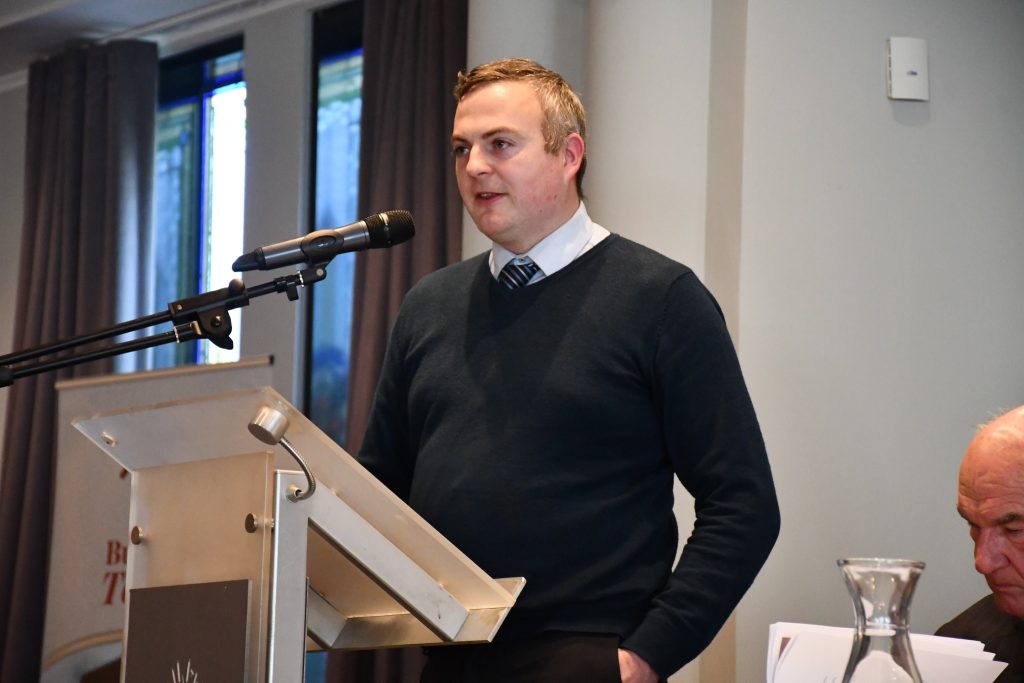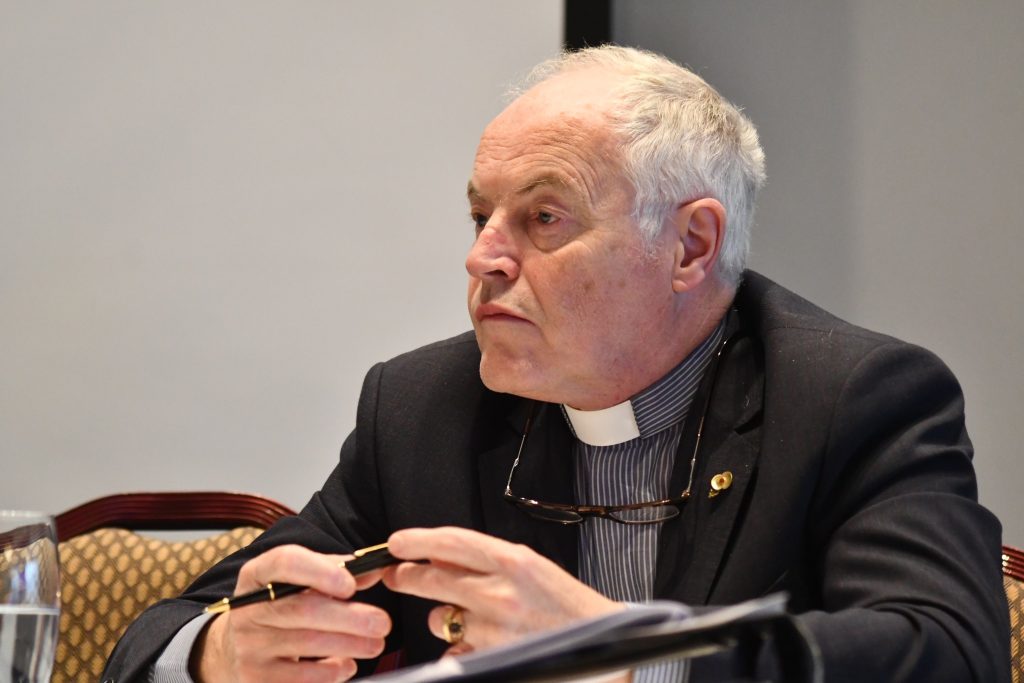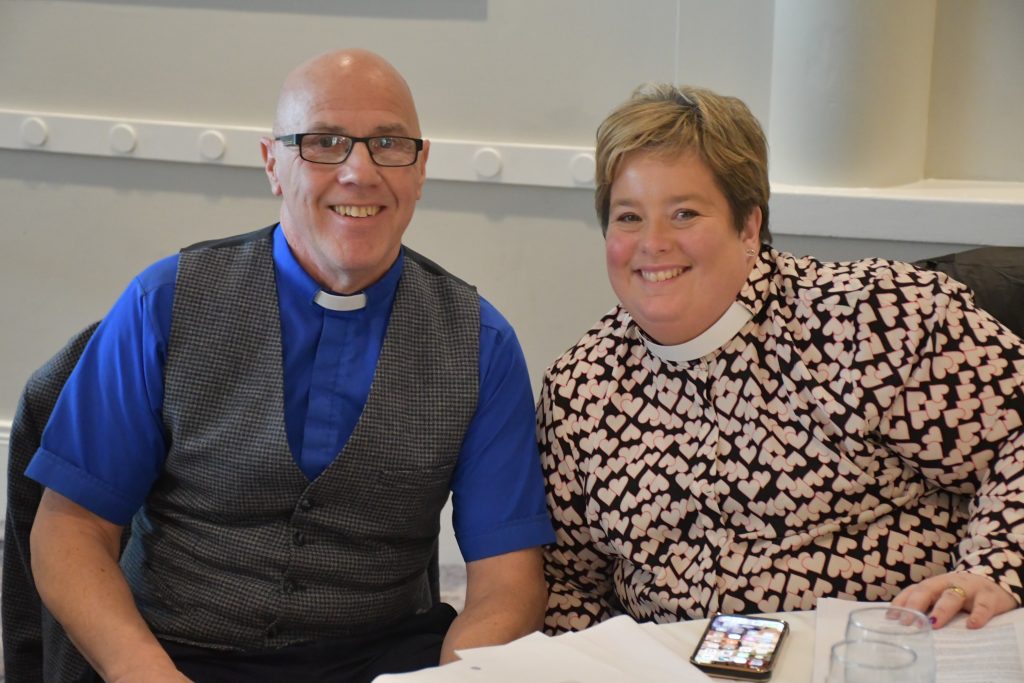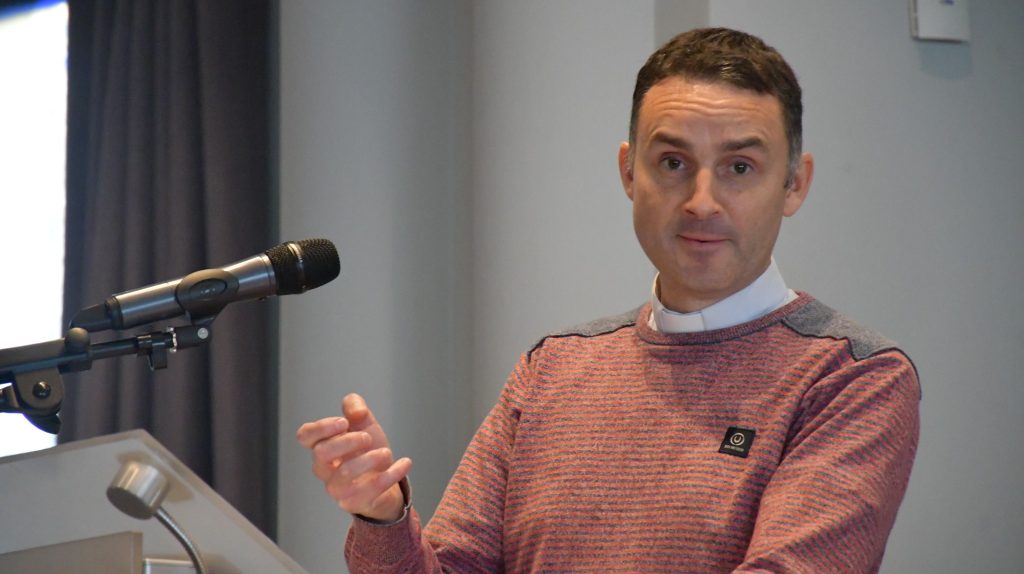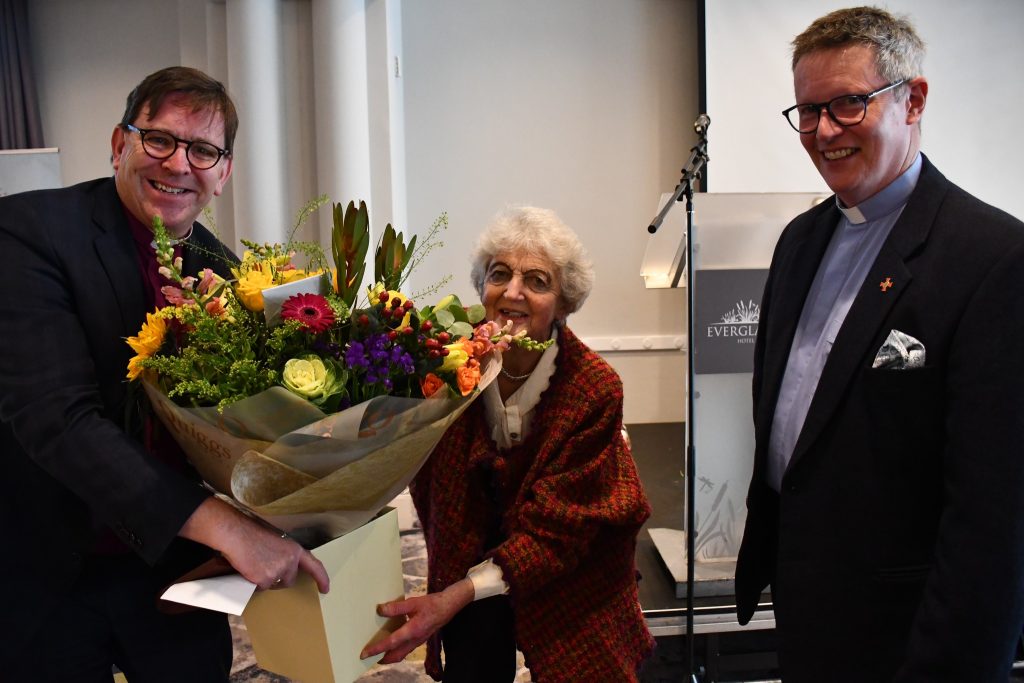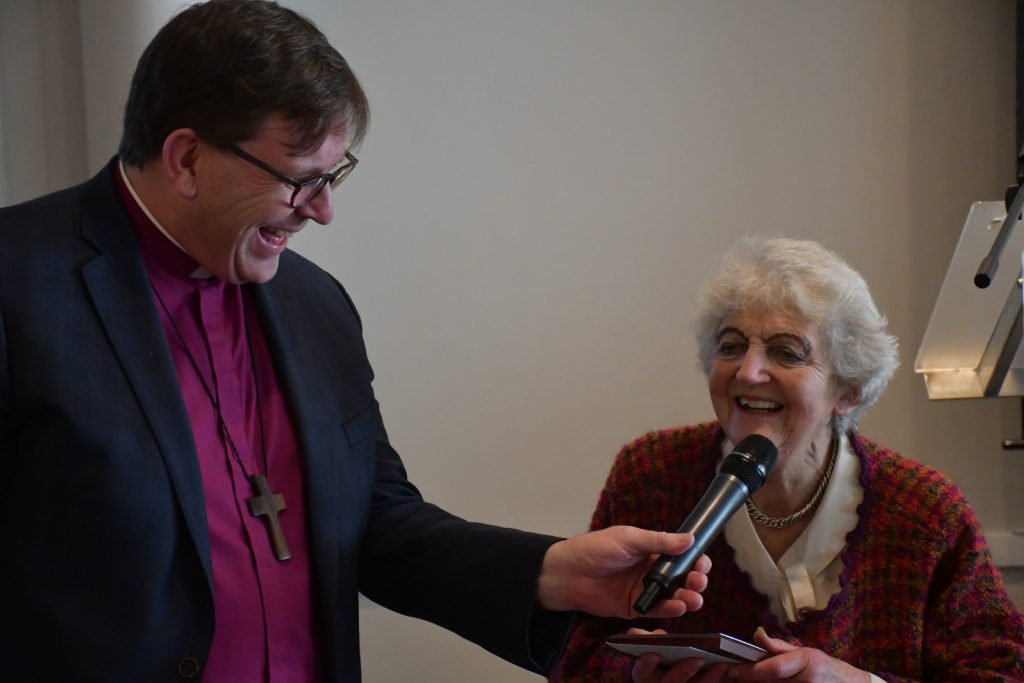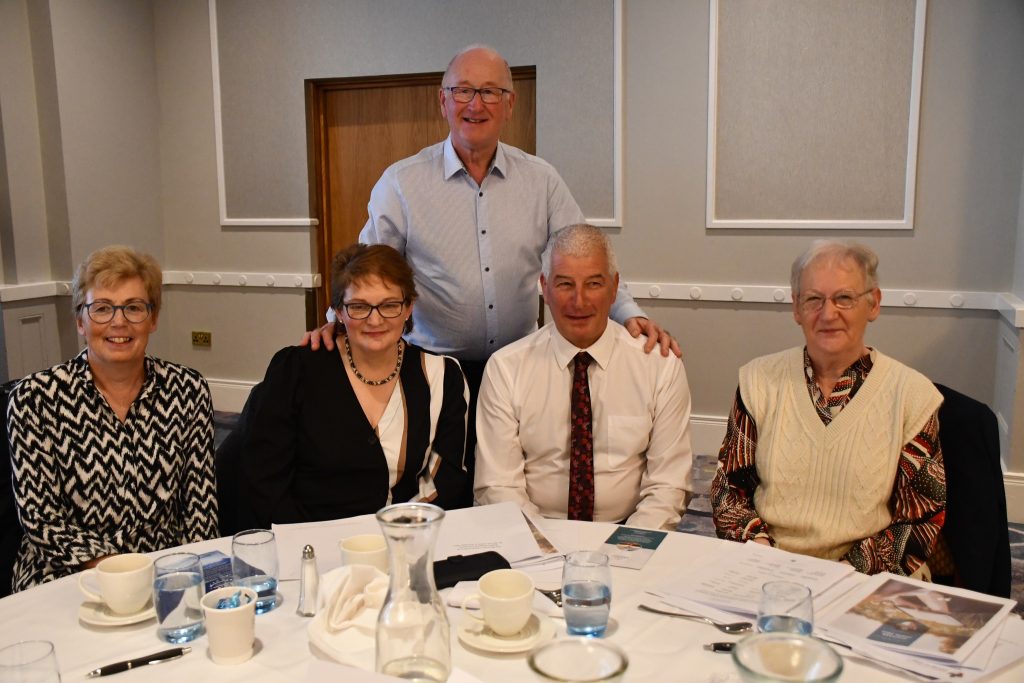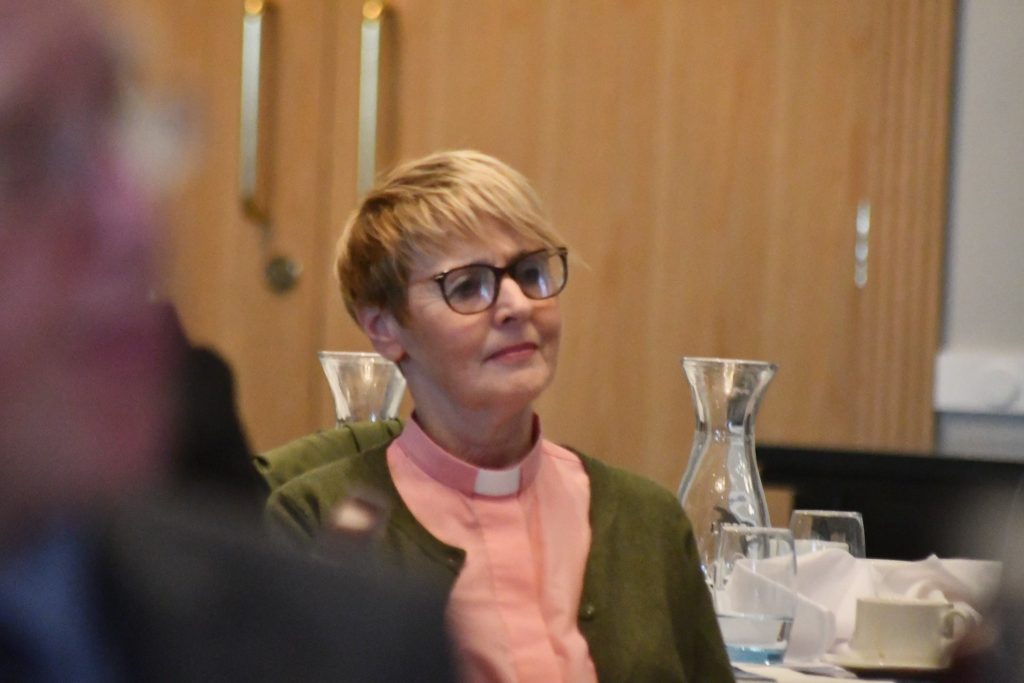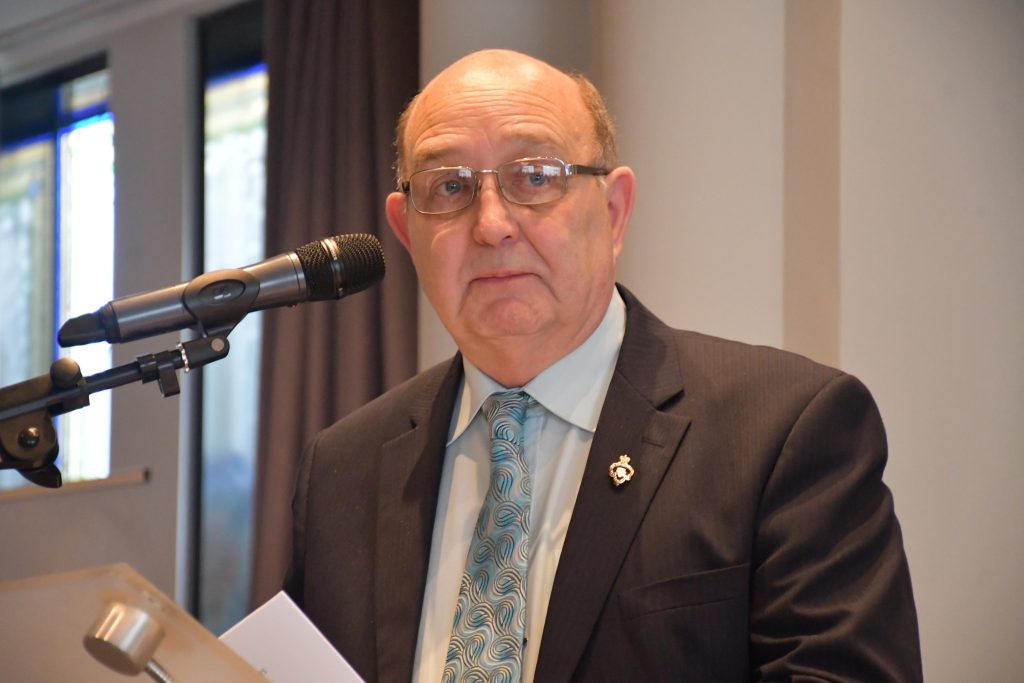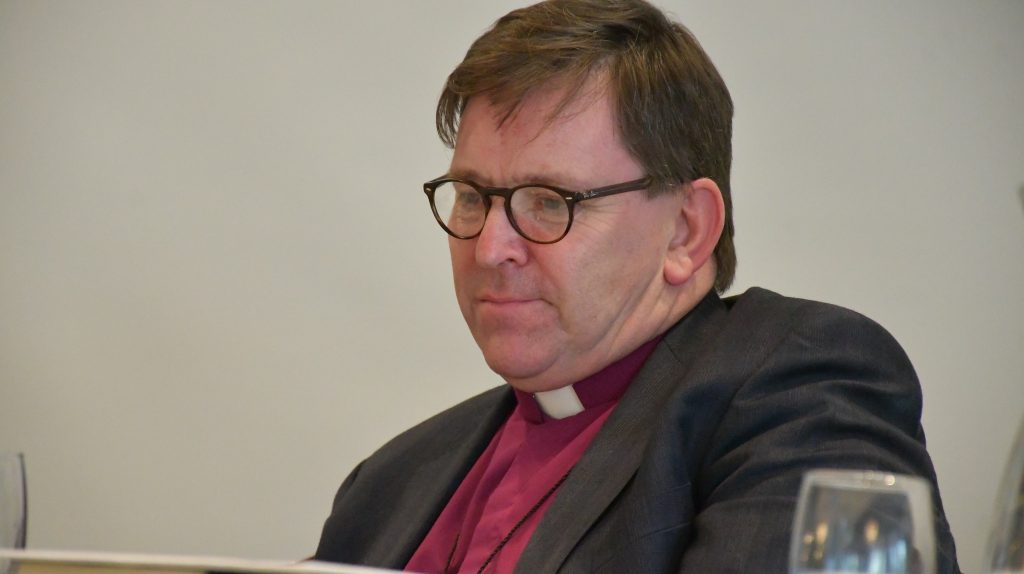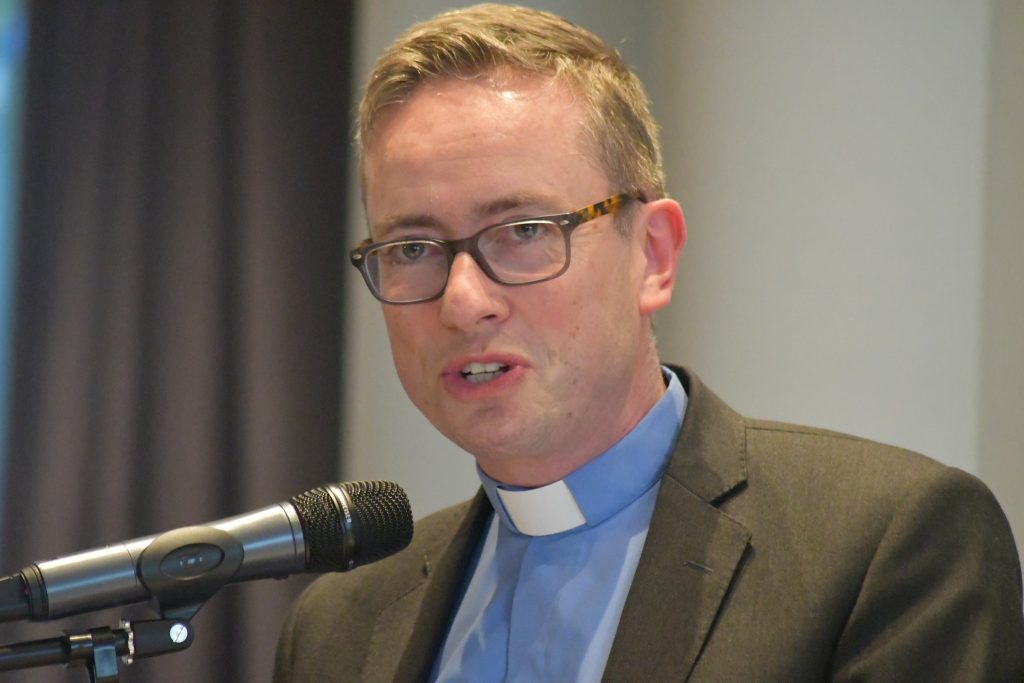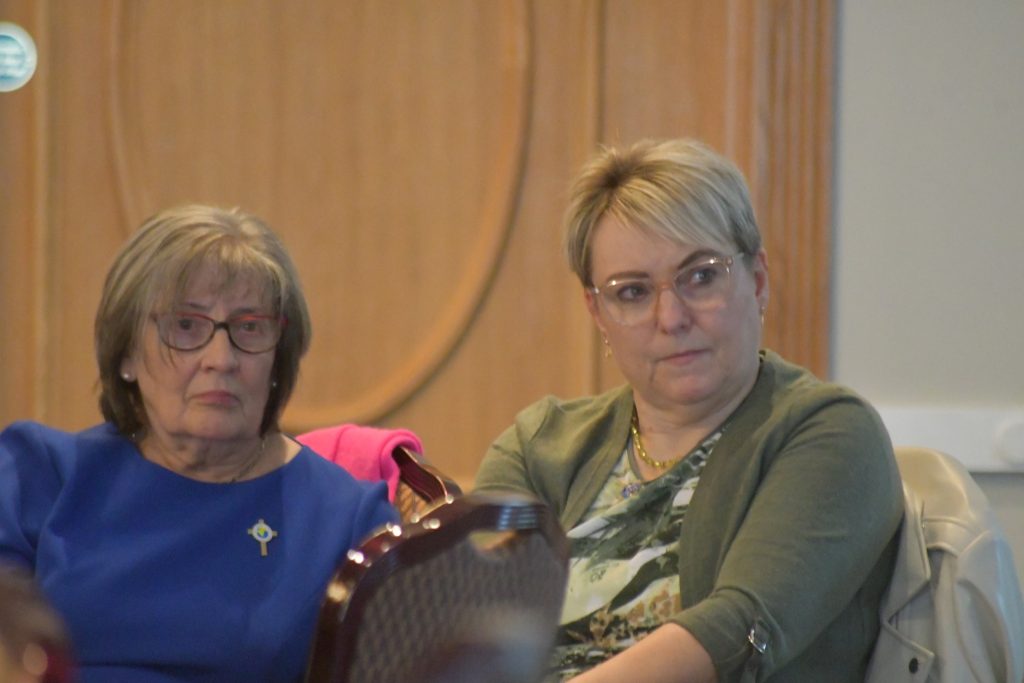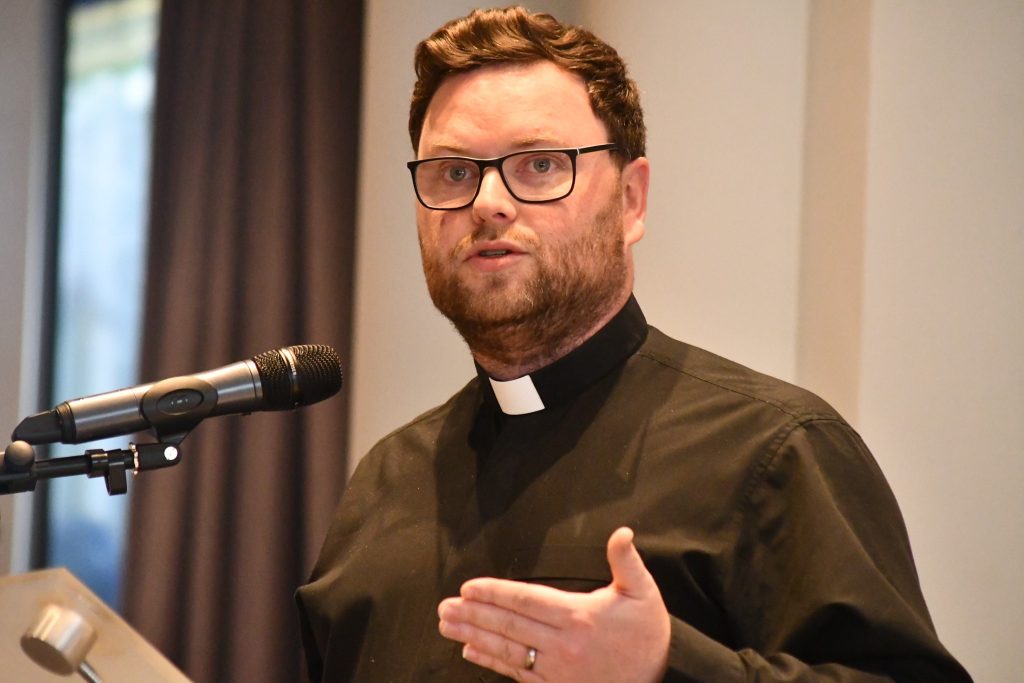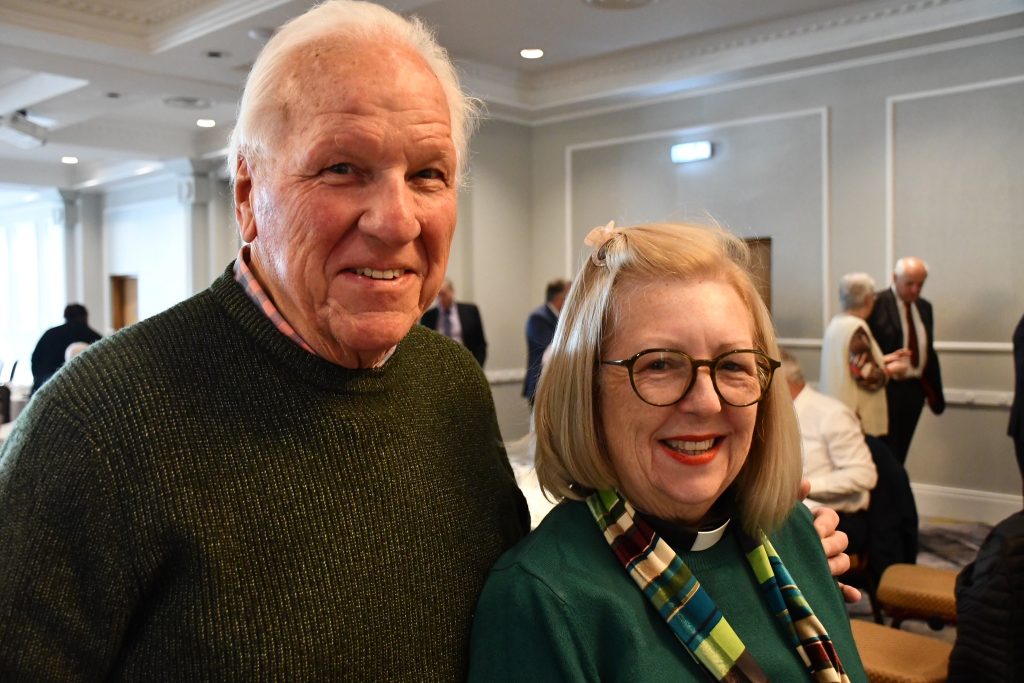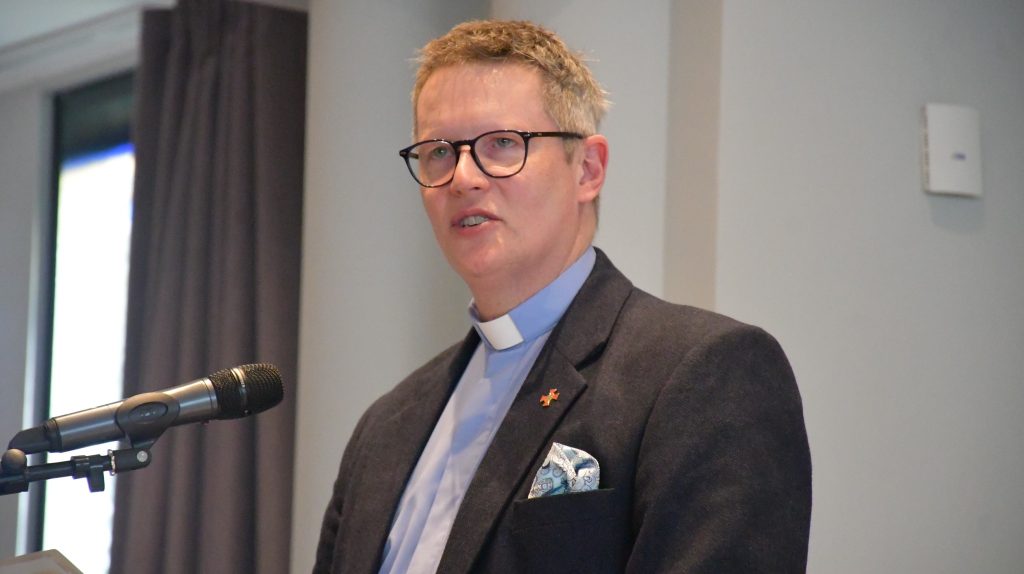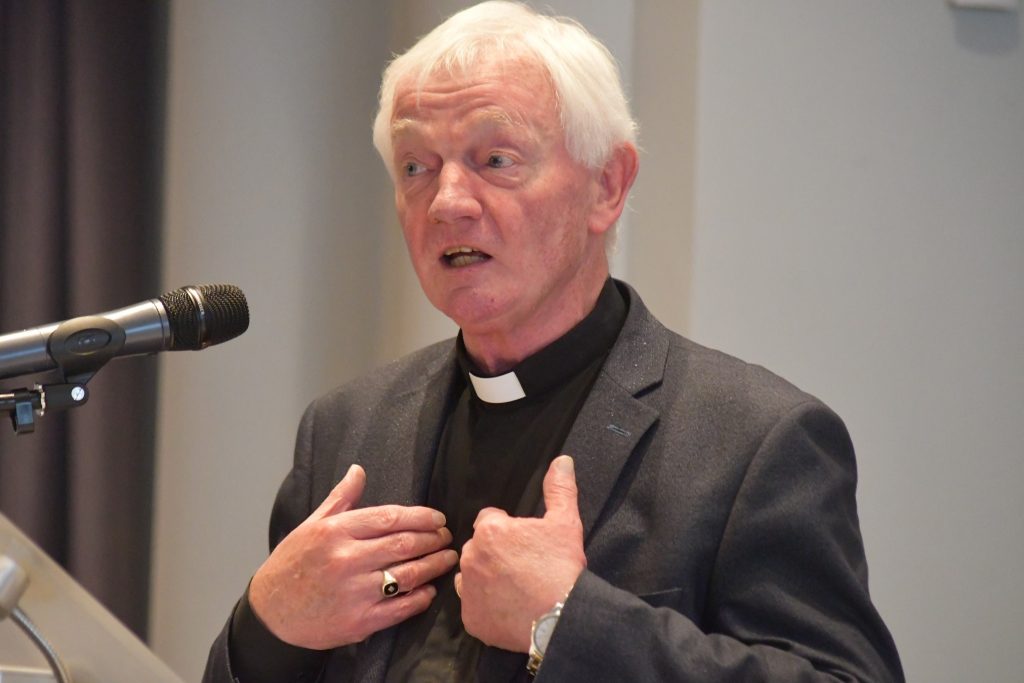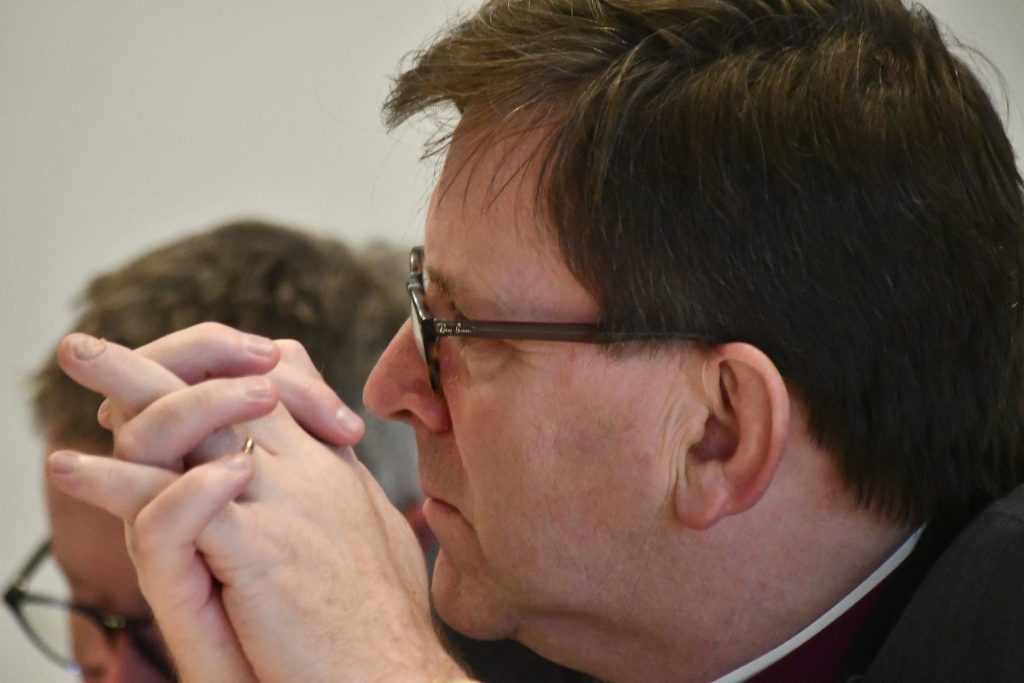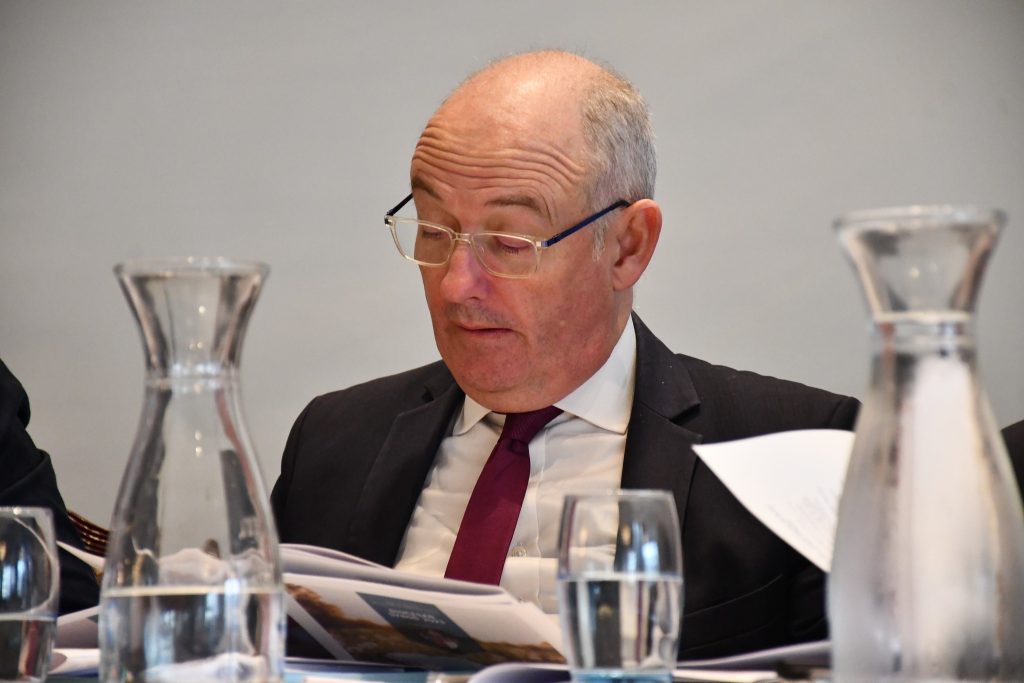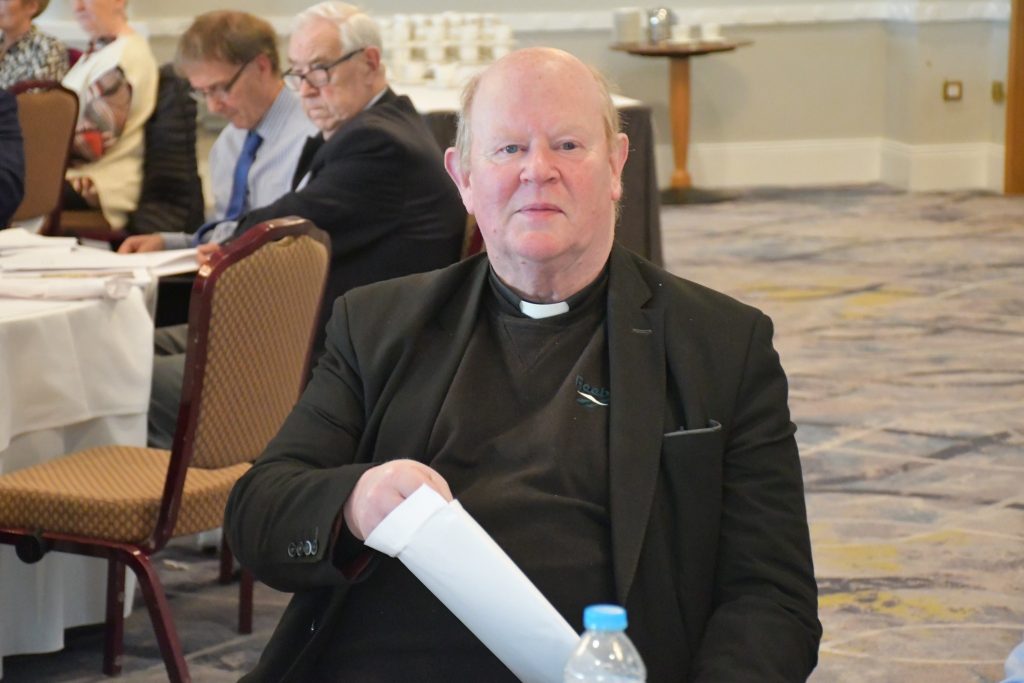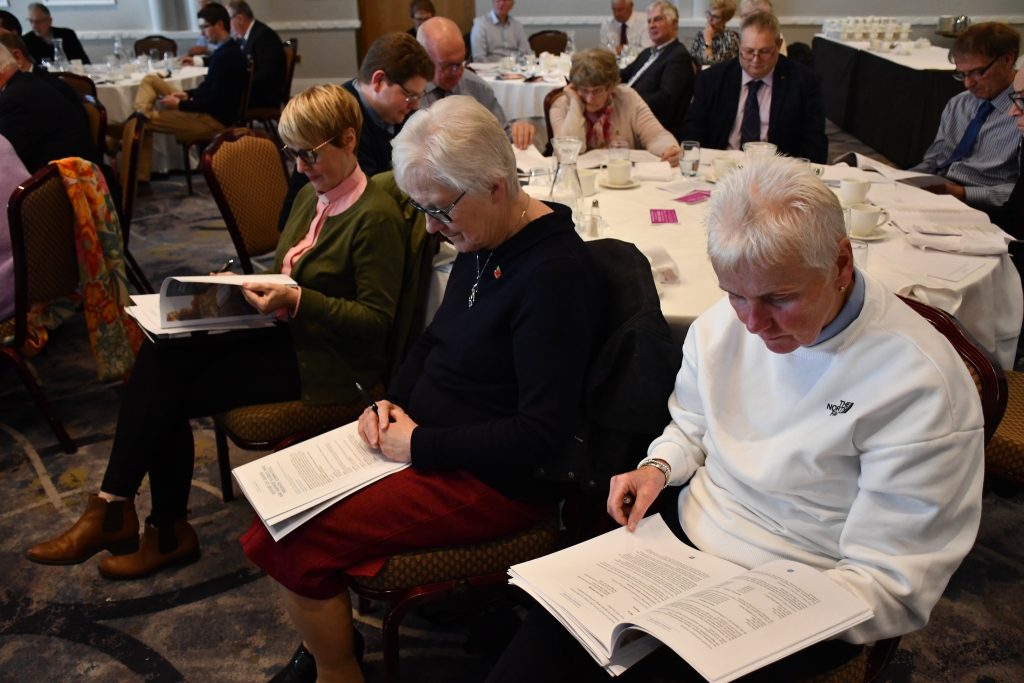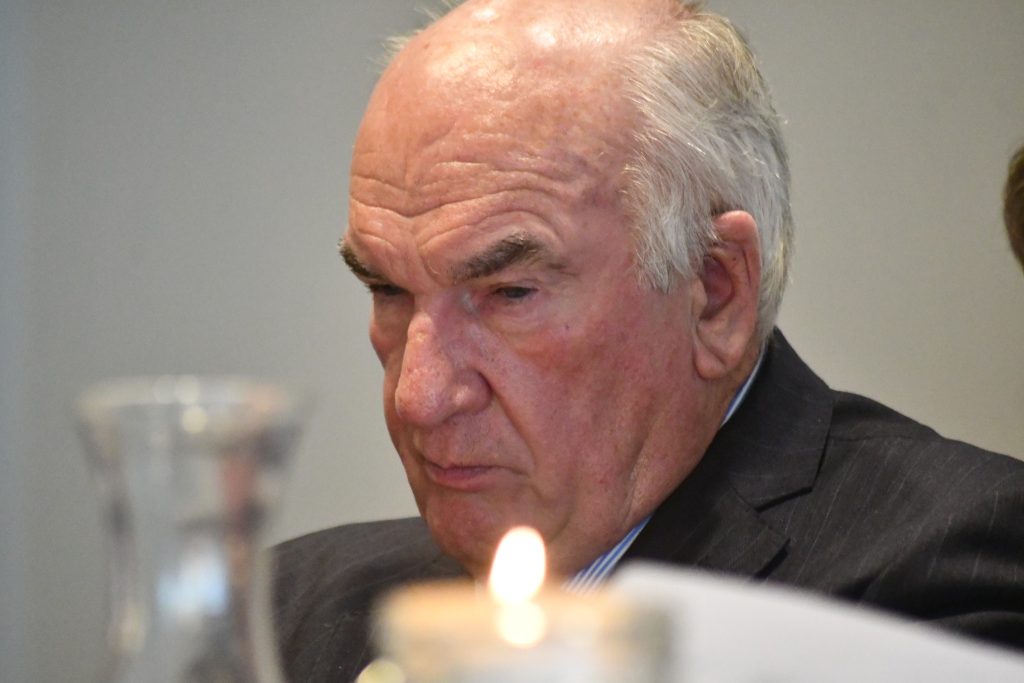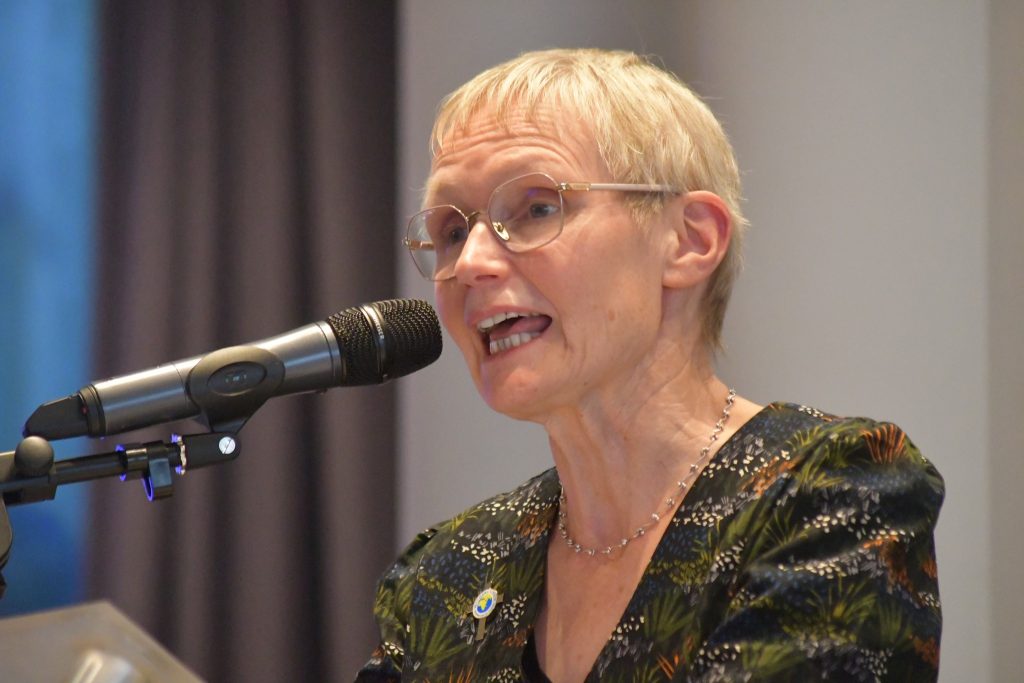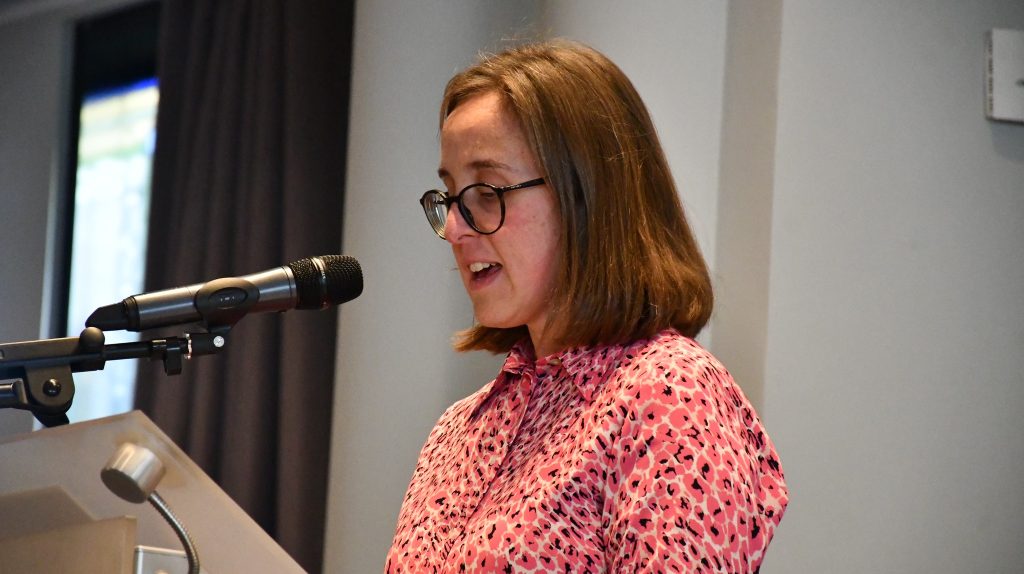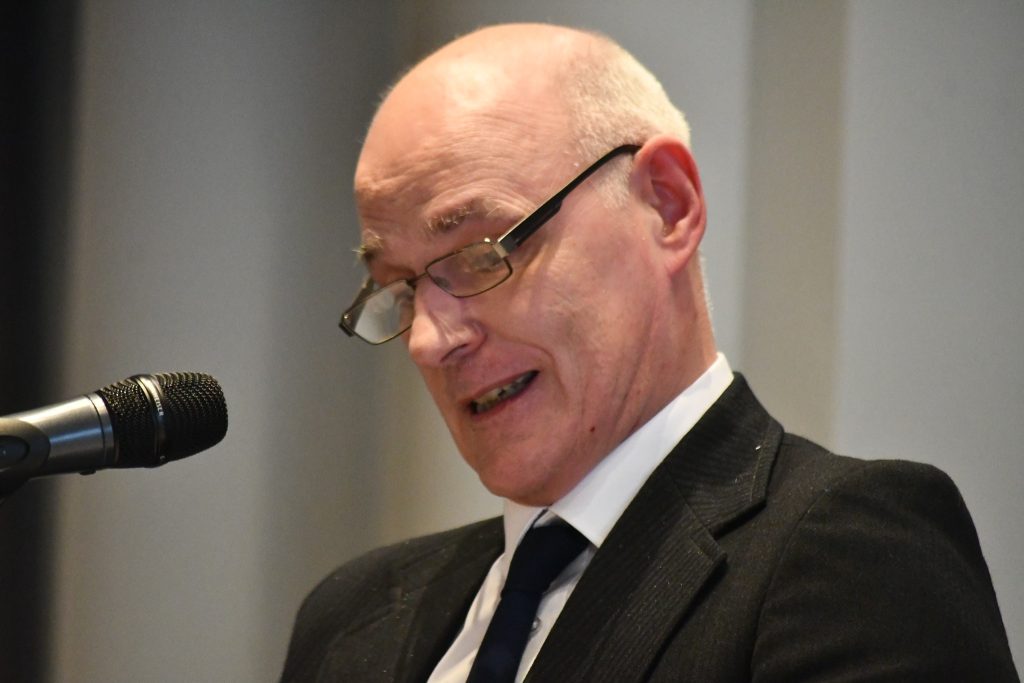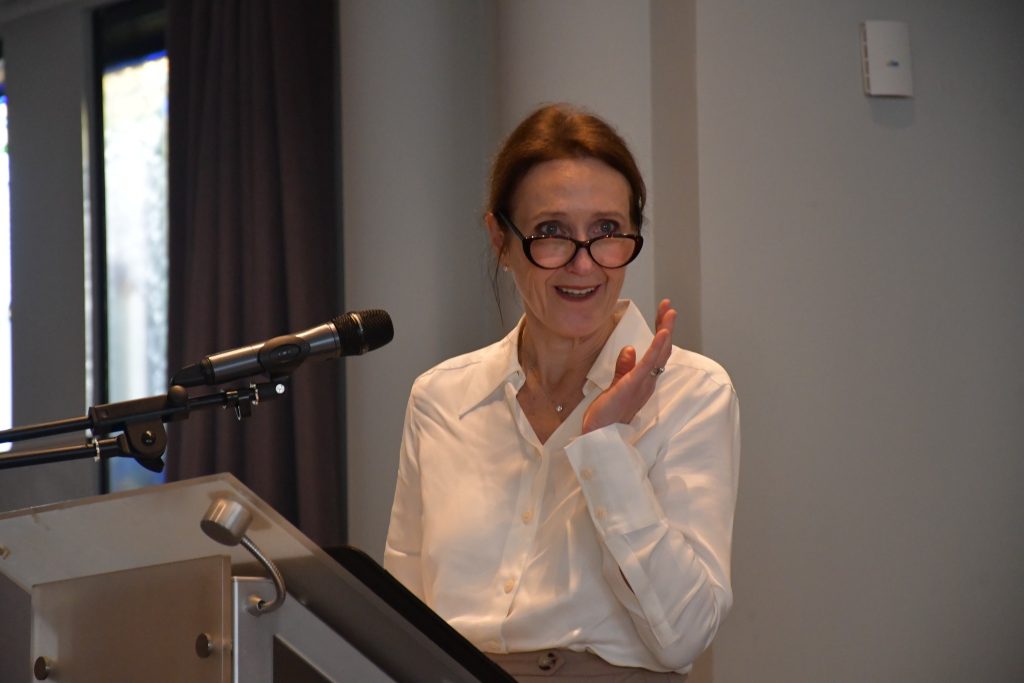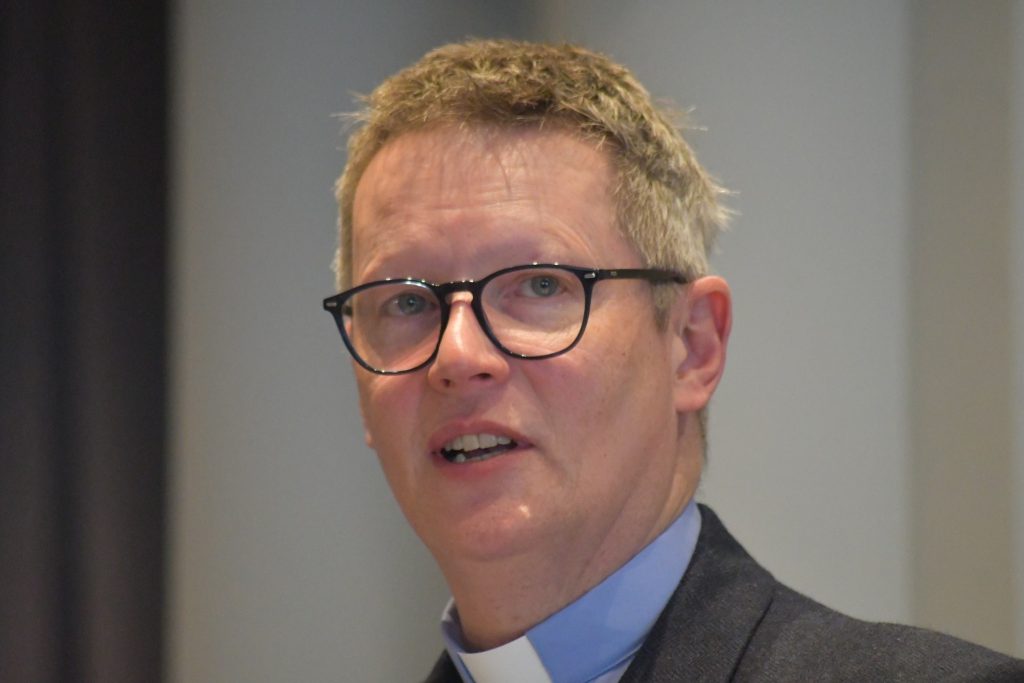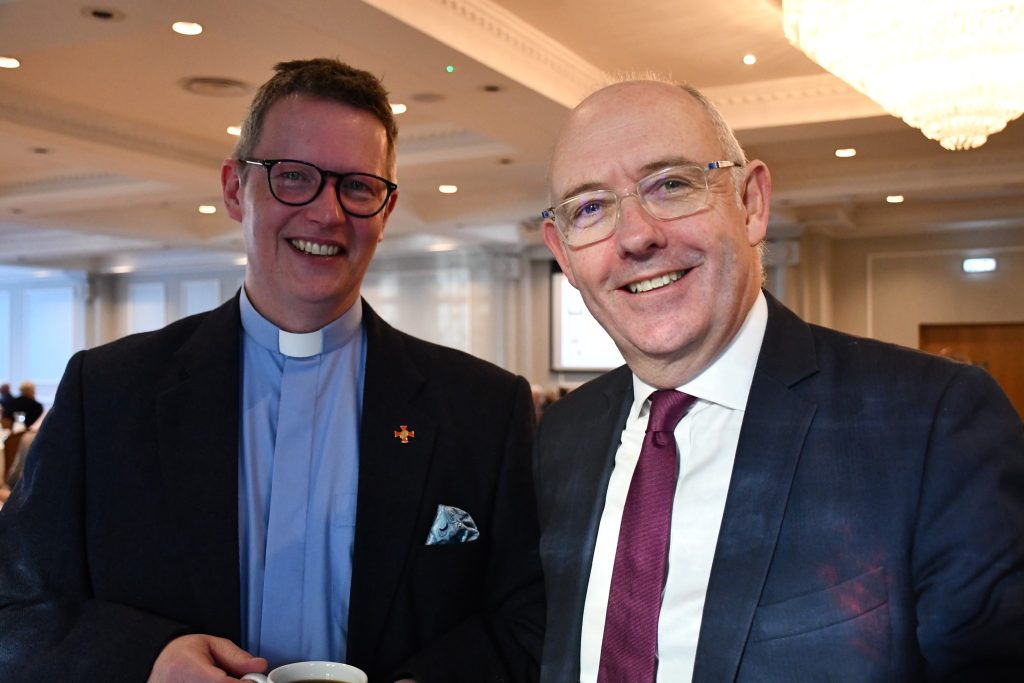Almost 200 delegates attended this year’s Derry and Raphoe Diocesan Synod at the Everglades Hotel in Londonderry (on Wednesday 25th October, 2023). Synod members approved a request to Diocesan Council to set up a commission to “prayerfully conduct a strategic review” of the diocese. The motion, which was proposed and seconded by the two Archdeacons in the name of the Honorary Secretaries, was endorsed without objection.
The day began with a Service of Holy Communion. Bishop Andrew Forster described the sharing of the bread and wine as “the most important part of today”.
In a brief homily, the Bishop shared three nautical images which he asked the congregation to bear in mind: the Church as a lifeboat for those who needed rescuing in the storms of life; as a lighthouse, sharing Christ’s light, and helping people to find their way through the difficult moments in life; and as a ferry – big enough, and with doors wide enough – to welcome all, accept all and bring all into the fellowship of the Church.
When the synod got down to business, a presentation was made to Ms Caroline Dickson, to mark her retirement after 40 years as Diocesan Architect.
In his presidential address, Bishop Andrew reminded delegates that this year’s Synod was taking place against the backdrop of a world in considerable turmoil. He said the events which had unfolded in Israel and Gaza since the dreadful terrorist attacks on October 7th had been “quite simply horrific”. The harrowing news reports from the region and the rapidly rising toll of dead and injured led us to turn to God both in lament and in intercession.
“We pray for an early end to the conflict,” Bishop Andrew said, “for the safe release of all the hostages, for relief for those in need, for peace and comfort for the bereaved and broken-hearted, and for a just and lasting peace for the region.”
Bishop Andrew said the terrible conflicts in the Middle East and elsewhere in the world put our own challenges into perspective. “Yet,” he said, “we continue to pray for a restoration of effective government here in Northern Ireland because we need it. And we pray for those who continue to suffer because of The Troubles, those in this room who continue to suffer because of the legacy of the Troubles, and we pray that this country will find God’s peace and we’ll know his peace in our hearts.”
It was easy to become dispirited, the Bishop said. “In addition to the conflicts I’ve mentioned [in the Middle East, Ukraine, South Sudan and Yemen], we wrestle with enormous challenges such as poverty and homelessness, domestic violence, migration, famine, climate change – it can be overwhelming. But we are people of hope, people who seek to be faith-filled, hope-filled and love-filled.”
We would only be human, Bishop Andrew said, if we thought that the best days of the church were all behind us. “But what if they’re not? What if the best days of the church aren’t just behind us? It’s our church, of course, but first and foremost it’s His church, and Jesus says, ‘I will build my church.’ What if the best days are ahead of us and God is calling each of us to play our part in building His church?
“Sometimes our own context and circumstances may make that seem unlikely or unrealistic or unachievable – I get that,” the Bishop said, “but we are people of faith, and we believe faith changes things. The church might – not might, it will – the church will look very different to how it used to look; it looks different now from how it used to look; but if we were to ‘dream a dream’, to ‘have a vision’ as the prophet Joel puts it, what might it look like? What if we say the best days are ahead?
You can read the full text of Bishop Andrew’s Presidential Address to the 2023 Derry and Raphoe Diocesan Synod below.
PRESIDENTIAL ADDRESS
‘It‘s one of the main responsibilities of every diocesan synod to act effectively as an annual general meeting of the diocese, and that means that today we will receive reports from various committees and councils about the important work that they do and, this being a triennial year, we will elect members to serve on our different boards and to fulfil wider representative roles within the diocese and the Church of Ireland.
‘All of this business is important, indeed it’s vital for ensuring the smooth running of the diocese in its task of supporting parishes and ministry from Coleraine to Ballyshannon, and Dunfanaghy to Maghera. And yet, our time together today is much more than an annual general meeting. I regard it more as a family gathering, a family reunion.
‘We gather from every corner of our large and diverse diocese – from city, town and village; from countryside, mountainside and seashore; from Northern Ireland and the Republic of Ireland; from Counties Donegal, Londonderry and Tyrone. In some ways we are a very disparate group of people, but these differences are a tremendous strength. Like the various strands which become stronger when they’re intertwined to make rope, we treasure our unity in the family of God in general and in the Diocese of Derry and Raphoe in particular.
‘Now when families come together, just like this family, of course they share their joys and their challenges, their hopes and their frustrations. They spend time together, enjoying each other’s company and learning from each other. And I hope and pray that today’s synod will have the feel of a family gathering.
‘I love that verse from Micah Chapter 6 which exhorts us all to “walk humbly” with our God. To walk humbly means we’re open to learning and to hearing, and in all humility, as we meet as a Synod, it’s important to be open to learning from each other, from other traditions and denominations. At equivalent meetings in the Methodist Church, with whom we are, of course, joined in covenant, discussions are often framed under the tile, “A conversation on the work of God’.”
‘I like that description, because ultimately the work of God and our commitment to that work are at the heart of all of our discussions and deliberations today. We share the joy and the privilege and the responsibility of partnering with God in the great work of building his kingdom. And today we’ll have conversations about the work of God in our own contexts and in the wider context of the diocese. As we’re called to that great work of building his Kingdom, I think it’s summed up beautifully in those famous words of Teresa of Avila:
‘Christ has no body but yours,
No hands, no feet on earth but yours,
Yours are the eyes with which he looks
Compassion on this world,
Yours are the feet with which he walks to do good,
Yours are the hands, with which he blesses all the world.
Yours are the hands, yours are the feet,
Yours are the eyes, you are his body.
‘Today – both formally in our proceedings, and informally around our tables and over lunch – let’s have conversations on the work of God in our parishes and in our own lives.
‘Now, as I travel round the diocese, week by week and Sunday by Sunday, I’m always struck by two things in particular: welcome and faithfulness. Without exception (well, without exception so far), I’ve been made to feel very welcome wherever I’ve gone and whenever I’ve come to be among you. Welcome, which is one of the ways we show hospitality, is hugely important in the mission of the church and, in my experience, we are people of warm welcome.
‘I also see a depth of faithfulness – faithfulness to your local parishes which is born out of a deep love of God and his church. This is exemplified in the hard work of clergy and countless volunteers not simply to keep the show on the road, but to ensure that the church is a blessing to parishioners and to the community at large. I want to thank you for your welcome and your faithfulness because we know that the challenges the church faces are great.
‘The tectonic plates of culture have shifted in all of our lifetimes. Most of us can still remember a time when the church was seen as important to society. Membership and attendance were the norm, there was a general acceptance of church in society.
We shifted, though, to a more ambivalent attitude, something along the lines of ‘Well, if it’s okay for you that’s fine but it’s not for me’. I think things shifted, yet again, from ambivalence to criticism (some of it very valid, it has to be said), and then to outright hostility as we sought to find our way through the cultural minefields of today. And I fear that things may be changing yet again, with hostility giving way to a commonly held belief that we are irrelevant and no longer merit much attention.
From acceptance to ambivalence to hostility to irrelevance.
‘That’s a remarkable and, let’s be honest, a painful evolution. Now, I know it’s dangerous to speak in generalities, and our individual experiences might be quite different – and I fully acknowledge that – but I do know that this cultural shift has been and remains hugely challenging for all of us as we seek to build the kingdom, to bless our communities and be a blessing in the world.
‘Week by week, I do experience welcome and faithfulness but it’s also clear to me that a lot of the time we have a sense that things are not how they used to be. Cultural change, falling congregations and the legacy of the Covid years have combined to make our aspiration to be a ‘Transforming community, radiating Christ’ more and more difficult. We’d only be human if we thought that the best days of the church were all behind us.
‘But what if they’re not? What if the best days of the church aren’t just behind us? It’s our church, of course, but first and foremost it’s His church, and Jesus says, ‘I will build my church.’ What if the best days are ahead of us and God is calling each of us to play our part in building his church?
‘Sometimes our own context and circumstances may make that seem unlikely or unrealistic or unachievable – I get that – but we are people of faith, and we believe faith changes things. The church might – not might, it will – the church will look very different to how it used to look; it look different now from how it used to look; but if we were to ‘dream a dream’, to ‘have a vision’ as the prophet Joel puts it, what might it look like? What if we say the best days are ahead?
‘Recently, I’ve been thinking of three words St Paul used in 1 Corinthians 13 – the three pillars of what it means to be a follower of Jesus and to live in the fellowship of believers: faith, hope and love. Now surely we can build better and stronger into the future if we are more faith-filled, hope-filled and love-filled:
• Faith-filled: when our faith, our confidence in God is strong, when we’re faith-filled, a faith-filled believer and a faith-filled church can not only weather the storm but find renewed strength in the storm. You know, there’s not one person in this room whose faith has not been tested, yet as we seek to build our faith – which I believe happens through prayer, devotion to scripture, fellowship one with another – as we build our faith our church becomes stronger. Faith is the antidote to fear and to doubt. A faith-filled church is a stronger church. We’re here to build faith.
• Hope-filled: faith gives birth to hope, and doesn’t our world need hope today? Hope is the lived-out expression of our faith, which tells us that no matter what our circumstances are that we believe his kingdom will come. I’m so encouraged by the hope that parishes right across our diocese are giving to their communities – hope to those who are lonely and on the margins; hope to our young people and children; hope that shines as a light in the darkness; hope to those whom we love and care for, and those outside that care at the moment. A hope-filled church is a stronger church.
• Lastly, love-filled: ‘And now these three remain, faith, hope and love. But the greatest of these is love’, says Paul. Love for God and love for his world is the fuel for our discipleship and of the church’s mission. In Ephesians we read a beautiful phrase that talks about us “being rooted and grounded in love”. Being rooted tells us that we’re nourished and fed by God’s love, and being grounded implies the strong foundations and the stability that come from living in the love of God. Let’s be sure our churches are love-filled, because a love-filled church is a stronger church.
‘Let’s not think the good days are all behind us. Faith-filled, hope-filled, love-filled helps us build better into the future. The church may look different than it did in the past but that doesn’t mean our best days are behind us. One of the ways the Church of Ireland is seeking to respond to the challenges we face is through its newly formed Pioneering movement. When I say ‘newly formed’, I perhaps should qualify that by saying that pioneering has been in gestation mode for quite some time. The project was launched recently and pioneering has a very, very straightforward objective: to reach ‘those with little or no contact with church’.
‘Now, on the table here you can see this candle. This candle was presented to me, to the diocese. One’s been presented to every diocese – all eleven – across the church, by our National Director of Pioneering, Rev Rob Jones, who’ll be sharing a little bit later on. It reminds us of the light that we can bring into this world – the lighthouse – to reach those with little or no contact with church.
‘At first glance, that seems like a simple goal, doesn’t it, but in many ways it will require a radical rethink of how we live out our God-given ministry? The diocese, through the good work of the Finance and General Purposes Committee and the Diocesan Council, is exploring options as to how we can support and help parishes in mission initiatives and pioneering.
‘In this address, I’ve sought to bring our attention to both the challenges and the opportunities that we face. As the synod’s proceedings continue, and as we have our conversations about the work of God, we’ll hear about the tireless work that goes on in our diocese, work that seeks to build a more faith-filled, more hope-filled, more love-filled church. I want, in advance, to thank all of those who will present reports today and who serve on our various committees, and I hope that our proceedings will generate both discussion and debate.
‘I am mindful that our synod is taking place against the backdrop of a world in considerable turmoil. The events which have unfolded in Israel and Gaza since the dreadful terrorist attacks on October 7th have been quite simply horrific. The harrowing news reports from the region and the rapidly rising toll of dead and injured lead us to turn to God both in lament and in intercession. We pray for an early end to the conflict, for the safe release of all the hostages, for relief for those in need, for peace and comfort for the bereaved and broken-hearted, and for a just and lasting peace for the region.
‘As we pray for the peace of Jerusalem for Israel and Gaza, we remember, too, that war continues to rage in Ukraine, and in some of your parishes I meet Ukrainians who have found a spiritual home in your churches and I thank you for the welcome that you have given to these dear people. Last month, I happened to be in Rome for a series of meetings with the Church Leaders Group. One of the most moving parts of it was an afternoon meeting with a Council of Churches of South Sudan. I was sitting beside a Bishop from South Sudan and as we shared around the table, he said that in his 60 years of life he had never known peace in South Sudan – in 60 years of life! Think of the struggles there and in Yemen. In many ways, such terrible conflicts put our own challenges into perspective, but yet we continue to pray for a restoration of effective government here in Northern Ireland because we need it. And we pray for those who continue to suffer because of The Troubles, those in this room who continue to suffer because of the legacy of the Troubles, and we pray that this country will find God’s peace and we’ll know his peace in our hearts.
‘It’s easy, isn’t it, to become dispirited? In addition to the conflicts I’ve mentioned, we wrestle with enormous challenges such as poverty and homelessness, domestic violence, migration, famine, climate change – it can be overwhelming. But we are people of hope, people who seek to be faith-filled, hope-filled and love-filled. In Matthew 25, Jesus tells his disciples that whatever they did for one of the least of his brothers and sisters, they did it for him. Just remember that as we seek to serve. For us, his followers, every single encounter with our brothers and sisters is an opportunity; and every single one becomes an encounter for Christ and with Christ. Using our hands, our feet, our eyes, our bodies – being a ‘Transforming community, radiating Christ’ – we can make God’s love known in our parishes and in our communities and in the world.
‘It’s always appropriate to finish one of these addresses with a word or two of thanks. The organisation of this year’s synod has been particularly challenging due to upheaval in the diocesan office caused by an unwelcome outbreak of dry rot. If you have visited the office lately, you will have seen the level of disruption that that has brought over the last number of weeks. So I want, on your behalf, to give sincere thanks to our diocesan secretary, Gavin Harkin, who deserves special mention for having ensured everything was in order for today. I get the impression sometimes when I’m out around the diocese that people think the office in Derry is some big, burgeoning bureaucracy, that has all these people keeping everything going but there it is over there – sitting by himself at that table – and I know all of us appreciate Gavin’s work and support, particularly this year.
‘I also want to say that I would find the role of Bishop next to impossible to fulfil without the support, and wisdom and help of our two Archdeacons, Robert Miller and David Huss. My thanks to them is both genuine and heartfelt. I am in their debt, as is the whole diocese. Please show your appreciation.
‘I’d also want to thank my relatively new secretary, Joanne, and her predecessor, Sarah, for keeping me right and making sure I turn up at the right place, usually at the right time (if it’s not the right time it’s my fault) and that’s no mean feat, given different competing responsibilities between the roles of Bishop and also, at the moment, of President of the Irish Council of Churches and so on; Sarah and Joanne must have felt like jugglers at times, so thank you, Joanne, for all that you do.
‘Lastly, I want to thank all of you – the delegates to this year’s Diocesan Synod – for everything that you do, not just today but throughout the year for your parishes, the diocese and our Church. Thank you for being here today for this Derry and Raphoe family gathering, for helping to create the warm, welcoming atmosphere for which this diocese is famous, and for joining in the fellowship that makes this occasion so special. So, now let us proceed with the business of Synod and let us have our conversation on the work of God.’
